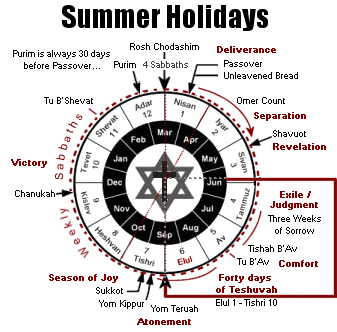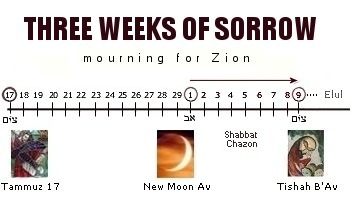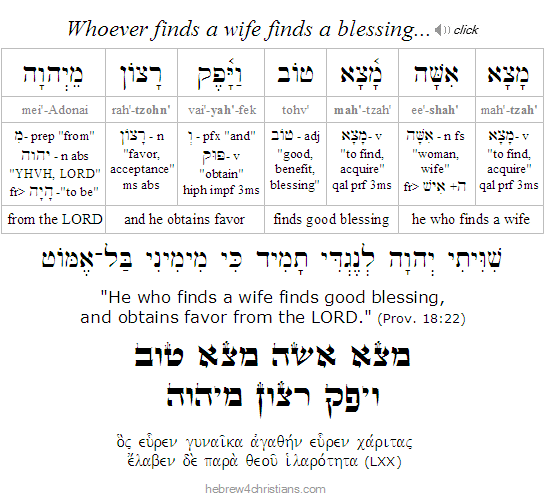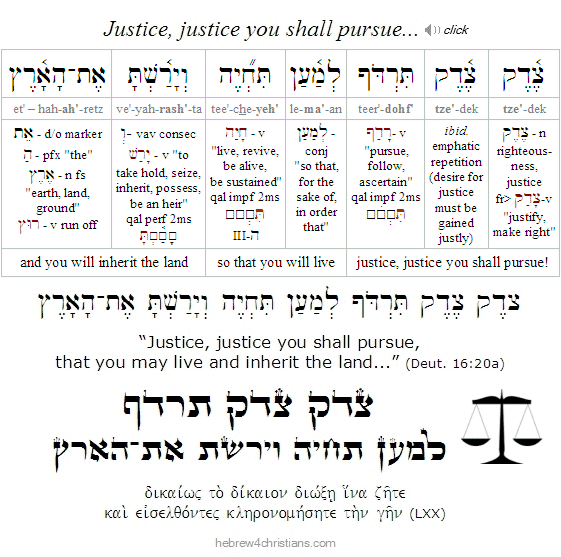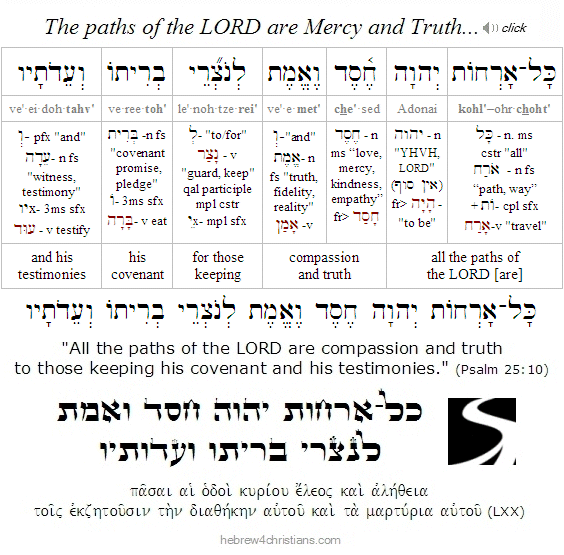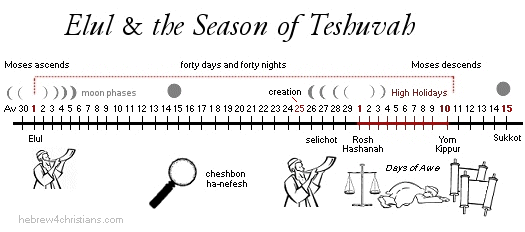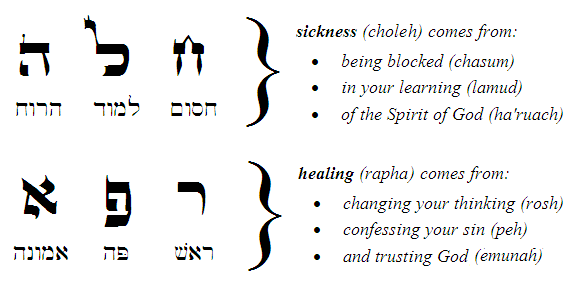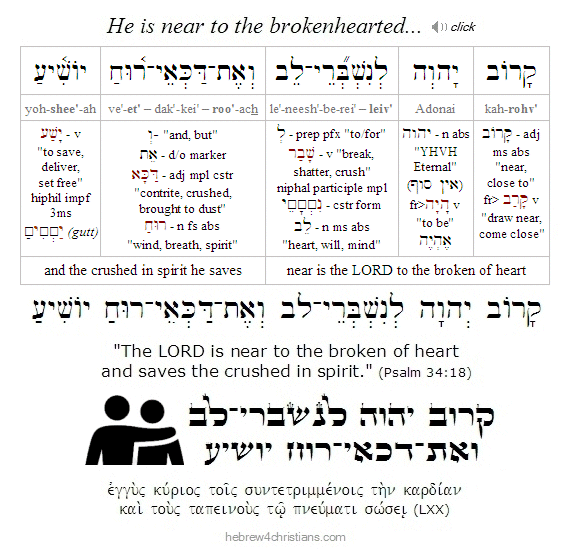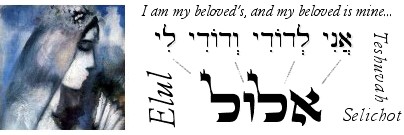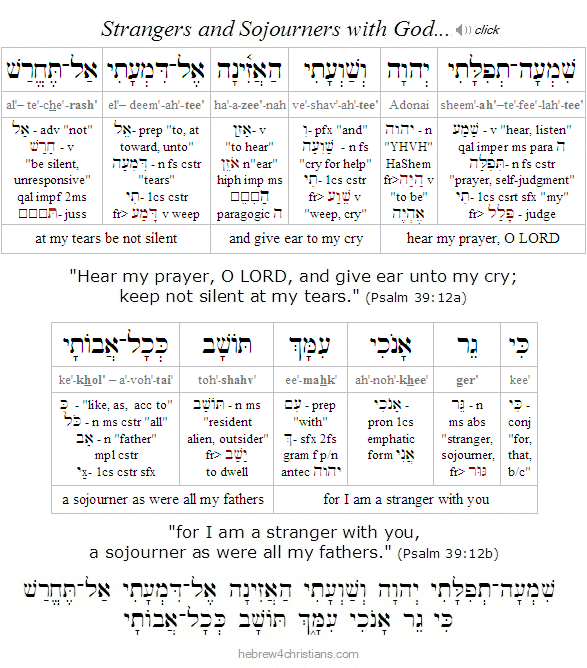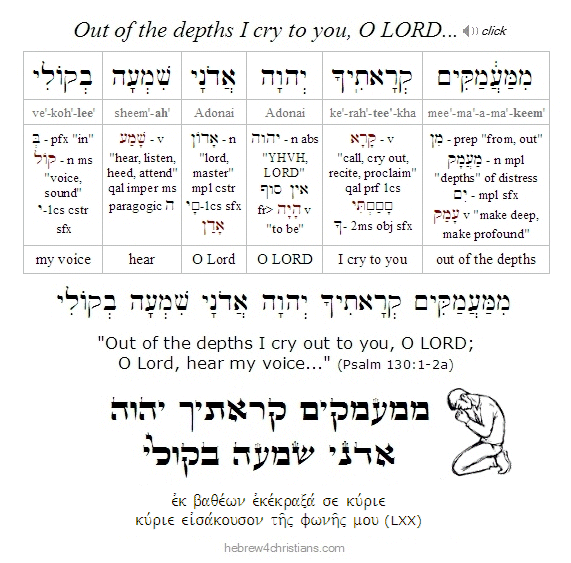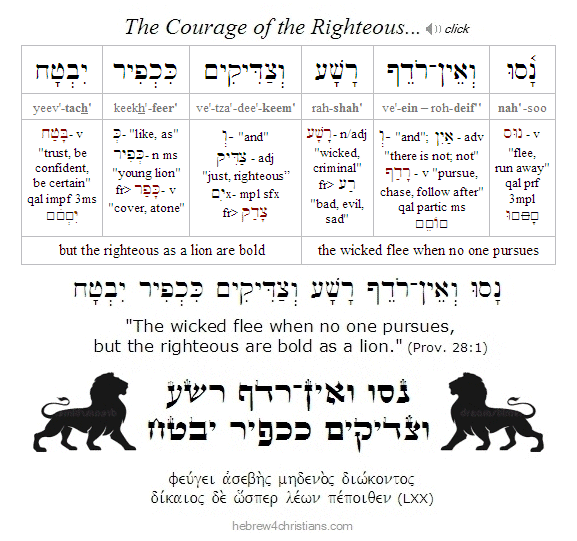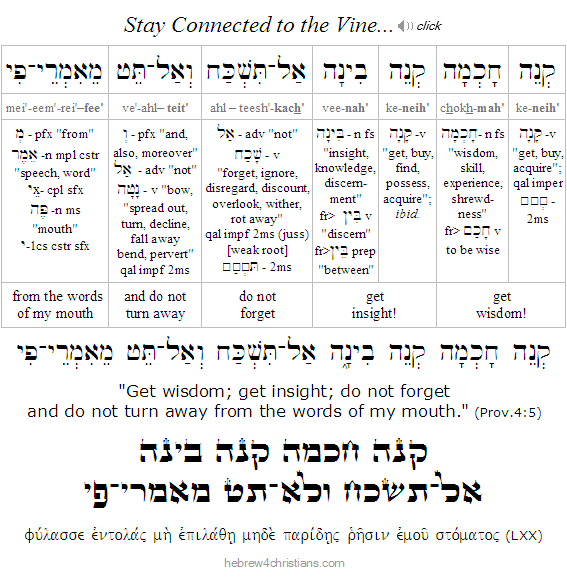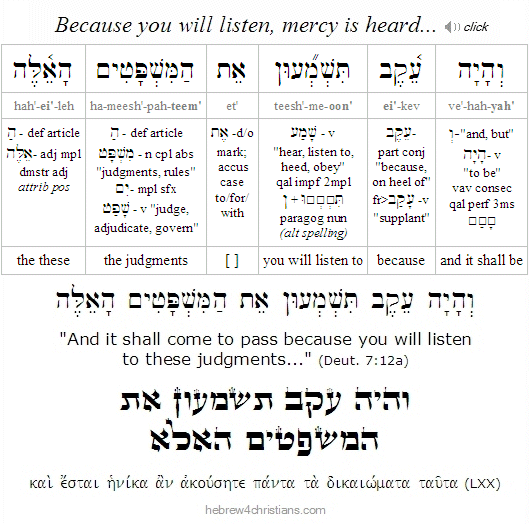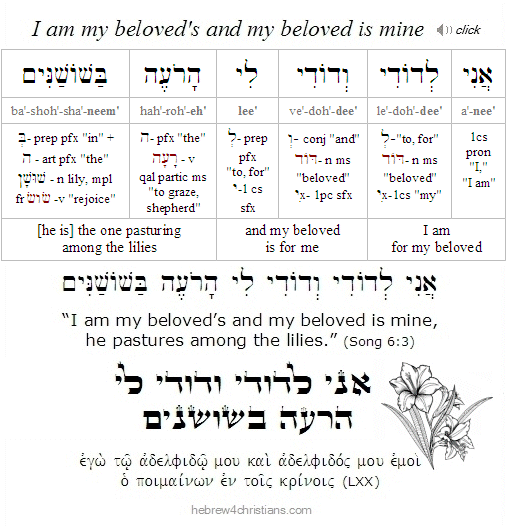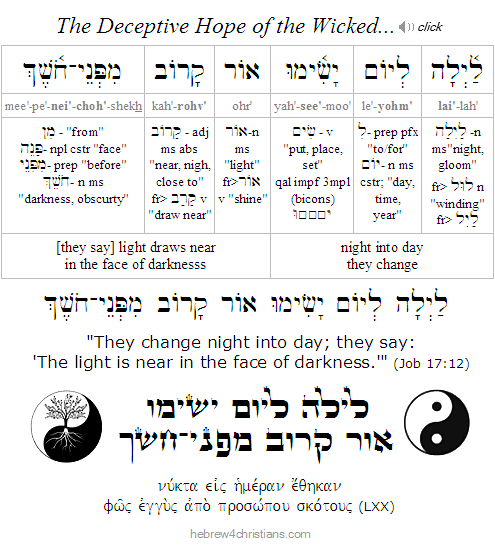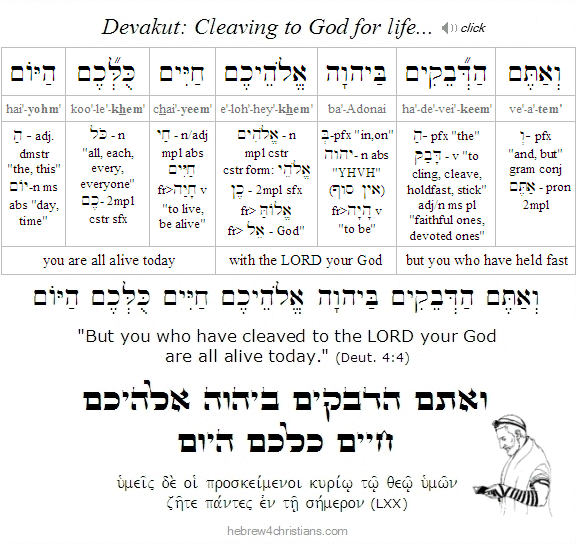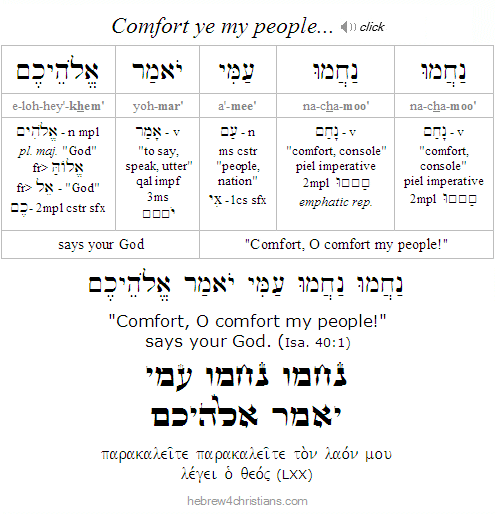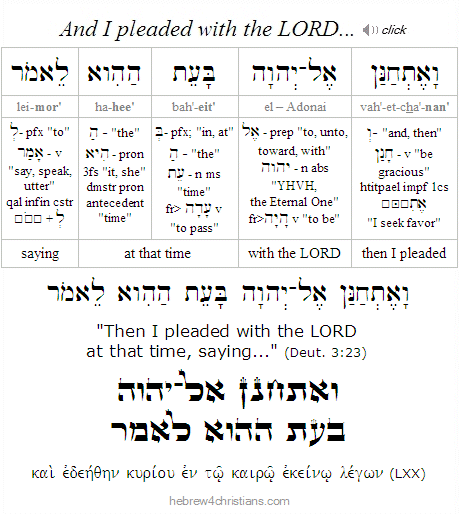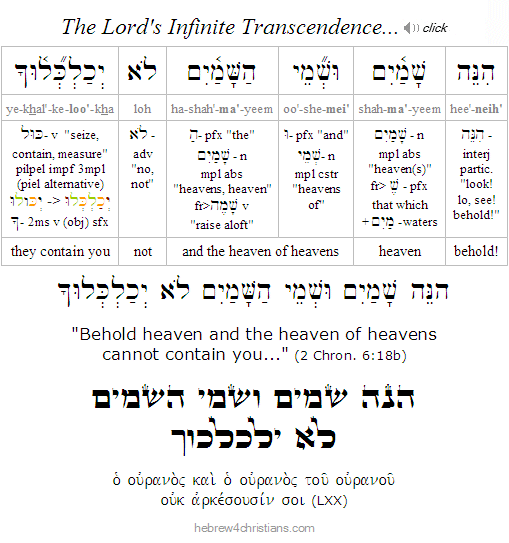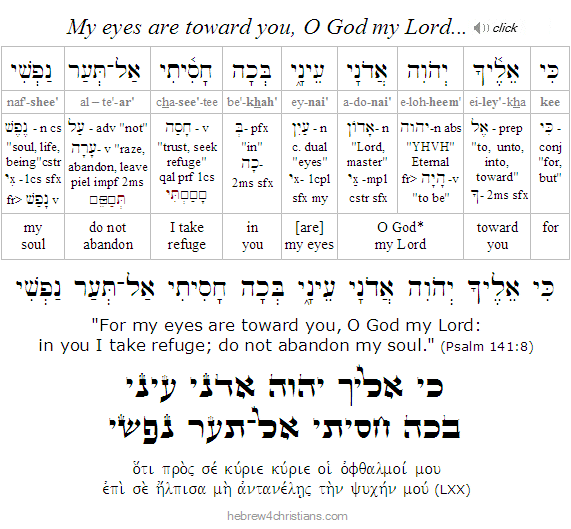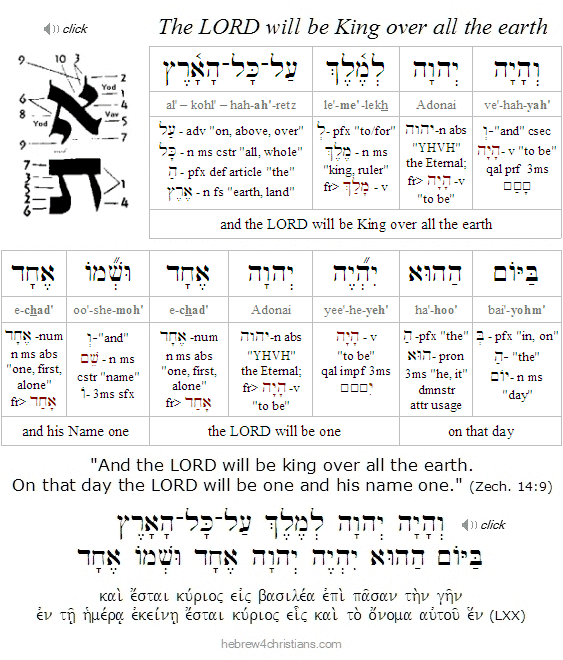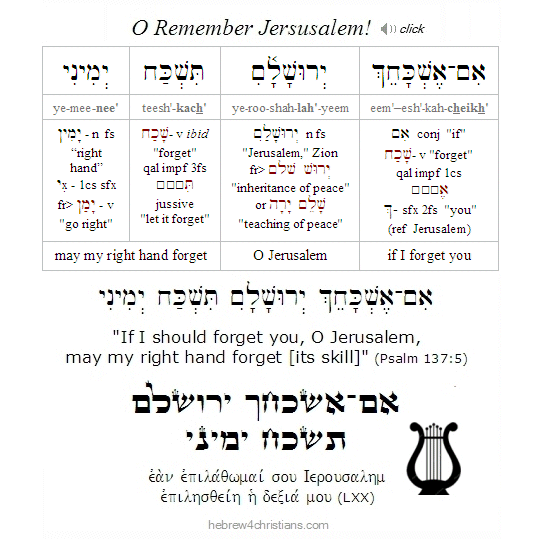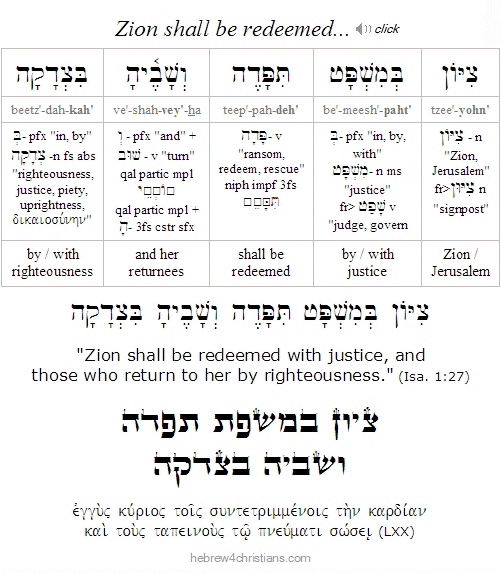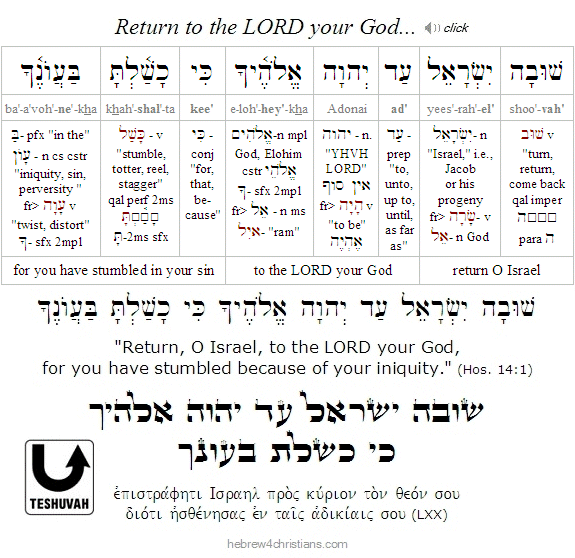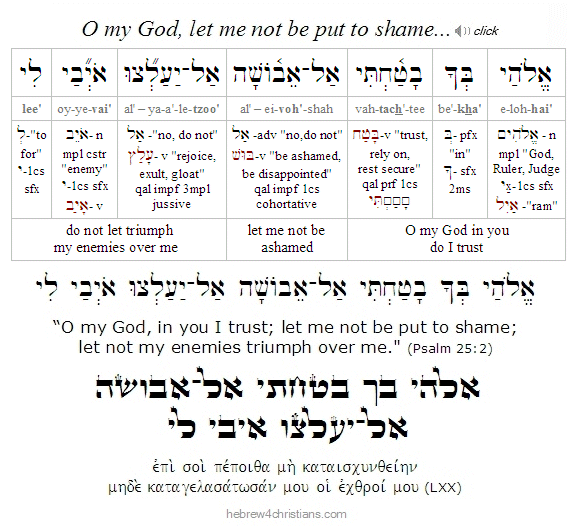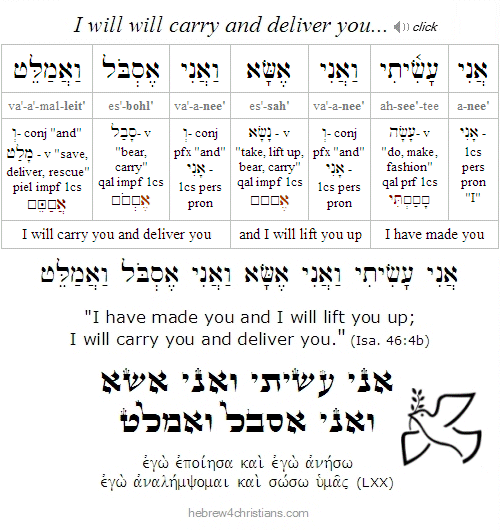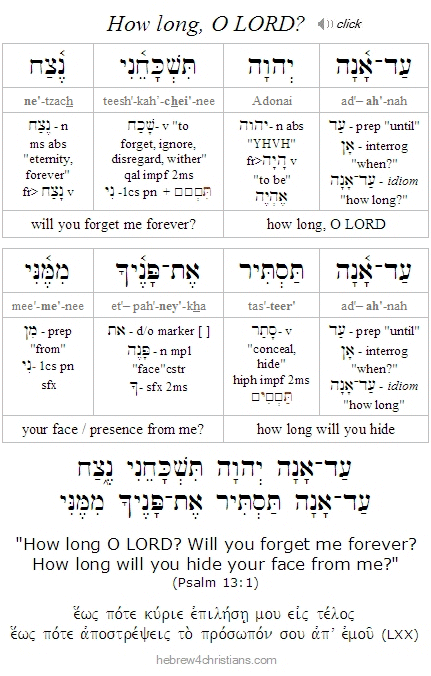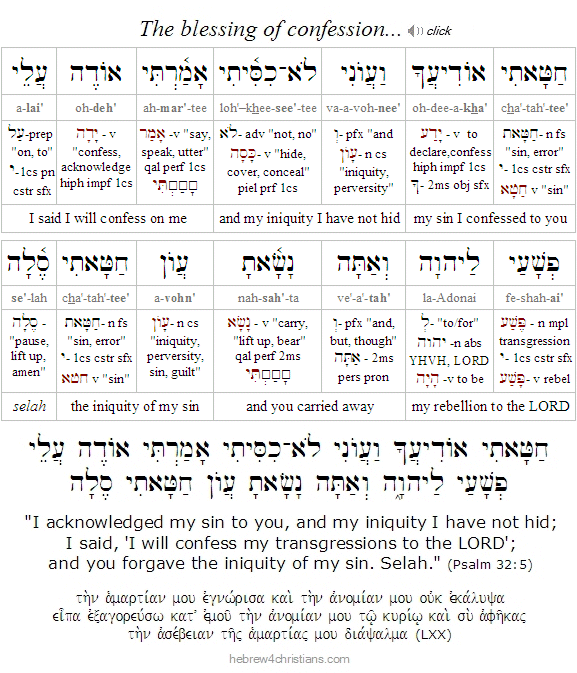|
Jewish Holiday Calendar
For August 2022 site updates, please scroll past this entry....
In the summer there occurs a three week period of mourning that begins with the Fast of Tammuz and ends with Tishah B'Av. The last nine days of this three week period (i.e., from Av 1 until Av 9th) are days of increased mourning. However, after this somber time, the romantic holiday of Tu B'Av, the 15th of Av occurs. Summer ends with the 30 days of the month of Elul, a yearly season of teshuvah (repentance) that anticipates Rosh Hashanah and the fall holidays. The 30 days of Elul are combined with the first 10 days of the month of Tishri to create the "Forty Days of Teshuvah" that culminate with Yom Kippur.
Because they occur between the spring and fall holidays, the summer holidays help us prepare for the second coming of the Messiah:
The Summer Holidays:

Note that in accordance with tradition, holiday dates begin at sundown. Moreover, some holidays may be postponed one day if they happen to fall on the weekly Sabbath:
- Month of Tammuz (Tues. June 28th [eve] - Thurs. July 28th [day])
- Month of Av (Thurs. July 28th [eve] - Fri. Aug. 26th [day])
- Month of Elul (Fri. Aug. 26th [eve] - Sun. Sept. 25th [day])
- Month of Tishri (Sun. Sept. 25th [eve] - Mon. Oct. 24th [day]) - Fall holidays begin!
Note: For more about the dates of these holidays see the Calendar pages....
August 2022 Updates
Treasuring God's Promise...

08.31.22 (Elul 4, 5782) A basic principle of Bible interpretation is succinctly stated in the axiom: "a text without a context is a pretext," and therefore we must endeavor to understand the New Testament in light of the Torah, not the other way around... Without the context of Torah, the meaning and terms of the New Testament will be obscure and subject to misunderstanding. Indeed, we must remember that the Messiah was "embedded" in the Jewish culture of his day (see Gal. 4:4-5), and that he was fluent in Torah reading and study (see Luke 4:16-21; John 4:22). Moreover, Yeshua plainly said that the Jewish Scriptures testify of Him: "And beginning with Moses and all the Prophets, he interpreted (διερμηνεύω) to them in all the Scriptures the things concerning himself" (Luke 24:27; John 5:39). We study Torah to know Yeshua, the "Living Torah" better, as he said: "Therefore every scribe who has been trained for the kingdom of heaven is like a master of a house, who brings out of his treasure what is new and what is old" (Matt. 13:52).
בלבי צפנתי אמרתך
למען לא אחטא־לך
be·lee·bee · tzah·fan'·tee · eem·rah·te'·kha
le·ma'·an · loh · e·che·tah-lakh

"In my heart I have treasured your word
so that I might not sin against you.
(Psalm 119:11)
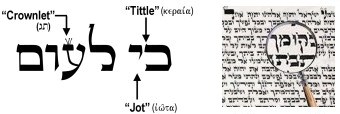
Click to listen to the Hebrew text with some commentary:
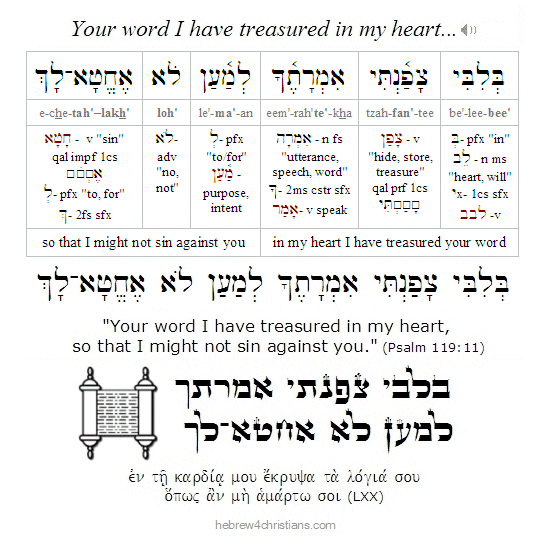
Some so-called Bible scholars claim that Jesus spoke Aramaic, not Hebrew. Well, consider this. If the law required that the king of the Jews was required to "make a copy of sefer Torah" (see Deut. 17:18-19), then surely Yeshua, the great King of the Jews, the Mashiach, read Hebrew and understood kotzo shel yod (קוֹצוֹ שֶׁל יוֹד) - "every jot and tittle" of its meaning (see Matt. 5:17-19). Indeed, Yeshua knew the traditional Hebrew blessings, prayers, and hymns (Matt. 26:26-30); he chanted Hebrew in synagogue (Luke 4:16), and he reasoned with the sages in Jerusalem, even as a young boy (Luke 2:42-27). Surely the true King of the Jews spoke lashon hakodesh, the holy language of Hebrew!
Deliverance from Evil...

[ "Resolved, to think much on all occasions of my own dying, and of the common circumstances which attend death..." - Jonathan Edwards ]
08.31.22 (Elul 4, 5782) There is the great danger of squandering and dissipating our lives... Examine yourself; consider what really moves you. Be careful not to deceive yourself by "reasoning around the truth" (i.e., παρα + λογίζομαι), as James the Righteous puts it (James 1:22). Many people fool themselves by assuming they know or understand what is good, but they confine this ideal to a matter of opinion rather than experiencing it as a matter of the will (or they confuse their opinion of the ideal with what is real).
There is something worse than death that should concern all people, however, and that is discovering that, upon your death, you had missed what is most important, that you sold your soul for vanities, and that you never learned the true reason for your existence...
Some of the ancient Greek philosophers assumed that moral evil was the result of ignorance, and that simply knowing the good would lead to doing the good. For example Socrates states (in the Protagoras) that no one knowingly does the wrong thing, and therefore all evil is the result of ignorance. He argued this way because he assumed that doing wrong harms the soul, and since no one willingly acts against his own interests, wrongdoing must be result of ignorance. This optimistic view implies that the answer to the problem of moral evil is "education," or leading people out of the dark cave of their lower nature to experience the light of reason. If we just really understood why doing this or that sinful thing hurts us, we would change our ways and repent, or so the theory goes... Alas, human experience proves that such "head knowledge" often does not change the way we choose, and we all know people who have habits they realize are harmful but continue to indulge in them anyway.
There may be some truth to the idea that evil is a matter of ignorance however, since ignoring what is good, being indifferent, apathetic, and cynical is a defect of character (ἀκρασία), and learning to be honest, upright, courageous, unselfish, and so on, requires personal struggle to make the "ought" of moral reality an expression of the "is" of inner life. What is often most shocking about moral evil is that it expresses apathy or indifference toward the objections of conscience. Moral evil is essentially heartless and devoid of empathy, a state of cold-heartedness and callousness for the feelings and dignity of others. According to the Jewish philosopher Hannah Arendt, the lack of moral thought and reflection creates what she called the "banality of evil," that is, the unthinking acceptance of evil so that it is no longer regarded as outrageous or strange. People deaden their conscience by refusing to honestly engage questions such as: "What is goodness?" "Is evil real?" "Do we have an obligation to observe moral truth?" "What is the good life?" "How should we live?" "Do our actions really matter?" "Will God judge my life?" and so on. On the other hand, our culture has been so shocked by the ongoing practice of lawlessness wickedness that people have lost their sense of shame. We are no longer shocked and outraged when we hear of the latest crimes or abuses of power in our postmodern world.... We must be careful, however, not to become evil by despising what is evil. For instance, we may feel so outraged and threatened by the evil actions of others that we deny their humanity, thereby becoming the very thing we hate.
"The heart is deceitful above all things and desperately sick; who can understand it?" (Jer. 17:9). "Oh there is nothing as deceitful and as cunning as a human heart, resourceful in seeking escapes and finding excuses; and there surely is nothing as difficult and as rare as genuine honesty before God." (Kierkegaard: Discourses). Therefore we pray: "Heal me, O LORD, and I shall be healed; save me, and I shall be saved.. Be not a terror to me; you are my refuge in the day of evil" (Jer. 17:14, 17).
Hebrew Lesson
Jeremiah 17:14 reading (click):
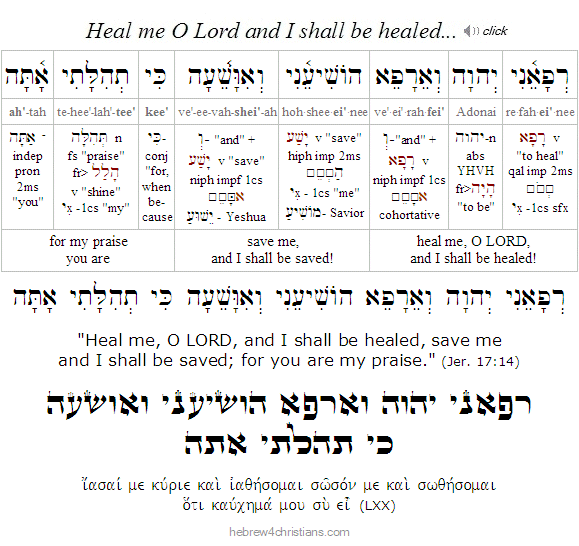 |
Teshuvah's Sweet Sorrow...
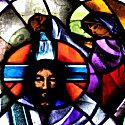
[ The following is related to the month of Elul and the theme of teshuvah (repentance)... ]
08.31.22 (Elul 4, 5782) While it's true that we express sorrow and regret for our sins - we mourn over our lives - this is an essential part of the healing process, with the end result of obtaining comfort from God (Matt. 5:4). Mere regret over sin is not enough, however, since the motive may be from shame (pride) or disappointment over some selfish loss. Esau "repented" with tears, but his wasn't true repentance since he didn't lament the loss of his heart to God's love (Heb. 12:14).
True repentance always leads to healing and life. When the woman from Magdala wept and washed Yeshua's feet with her tears, he said, "I tell you, her sins, which are many, are forgiven -- for she loved much" (Luke 7:44-48). In other words, she was lavish in her love because she deeply regretted that she had missed what was most important, what she desperately needed all along... She saw her sin as blindness to God's love... After all, why would she weep over her sins unless she loved him? And how could she love him unless he first revealed his love to her? (1 John 4:19)
"For grief (λύπη) as intended by God produces a repentance (תְּשׁוּעָה) that leads to salvation, leaving no regret, but worldly grief produces death" (2 Cor. 7:10).
Hebrew Lesson
Click to learn to read the Hebrew text:
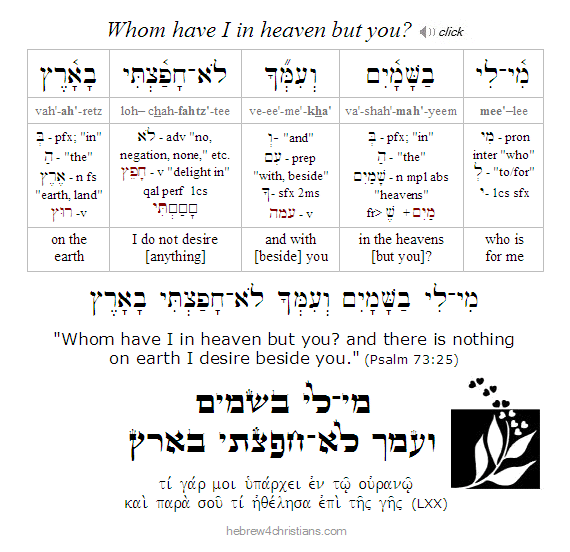 |
Guarding your Heart...

08.31.22 (Elul 4, 5782) Our Torah portion for this week, parashat Shoftim, begins: "Judges and officers you shall give to yourself (תִּתֶּן־לְךָ) in all your gates" (Deut. 16:18). In this connection some of the sages interpreted the word "gates" (שׁערים) to refer to our sense organs, for example, the "eye gate," the "ear gate," and so on. Likewise the Lord instructs us to write the words of Torah "upon the doors of our house and on our gates" (Deut. 6:9). Because we are naturally inclined to "spy after our hearts and eyes" (Num. 15:39), we are instructed to appoint "gatekeepers" to protect the sanctity of our heart and soul, as it says: "Above all else guard your heart, for from it flow the springs of life" (Prov. 4:23).
The Hebrew text for this verse is emphatic. We are to guard our hearts vigilantly, just as a prison guard or warden might keep watch over a prisoner. The phrase translated "above all else" literally means "more than anything that might be guarded" (mikkol mishmar), a construction used to intensify the command to exercise vigilance. Plainly put, this verse commands us to watch over our heart more than anything else.
And yet "the whole head is sick, and the whole heart faint" (Isa. 1:5). We understand how apt we are to go astray in our affections, and therefore the heart is easily divided, obstructed, and liable to failure... Despite its frailty, however, the heart determines totze'ot chayim, or the "springs" or "contours" of life. In the Tanakh, the word totza'ot is often used to refer to the borders of territories or the boundaries of a city. This verse is saying that from the heart of a person (lev) a "map" or "chart" to life is drawn. As the heart is either pure or corrupt, so will be the course of one's life... Purity of heart represents healing, which means being single-minded in our affections and attention before the LORD.
How you choose to guard your heart from inner corruption and hardness will determine the "road" of your life. Concerning this verse the Metzudos commentary says, "Above all – more than anything else – a person must be careful to guard his heart from improper thoughts, for one cannot contemplate using the heart – the very vortex of life – to harbor thoughts that are inimical to life." Because the flesh is weak, we must be vigilant lest we become cynical, weary, and unfeelingly selfish. An unguarded heart soon becomes troubled, lonely, suspicious, and unstable. If, however, we keep ourselves from the obstruction of sin, we will experience the free flow of compassion, encouragement, and joy. The faithful heart is open - it believes all things, hopes all things, and endures all things (1 Cor. 13:7).
"Judges and officers you shall give to yourself (תִּתֶּן־לְךָ) in all your gates." Note that that Torah states that you shall appoint these to yourself, stated in the singular, not in the plural, to suggest that it is your personal responsibility to guard your heart from negative influences. God considers it your duty to yield yourself as a vessel or "steward" of the kingdom of God (Rom. 6:13). We must regularly ask God to enlighten "the eyes of our heart" (τοὺς ὀφθαλμοὺς τῆς καρδίας ὑμῶν) according to His wisdom and power (i.e., truth revealed in Scripture), and to impart the power of the Holy Spirit to transform our desires and affections so that they conform to the character of the Messiah (Eph. 1:18).
Hebrew Lesson
Proverbs 4:23 Hebrew reading (click):
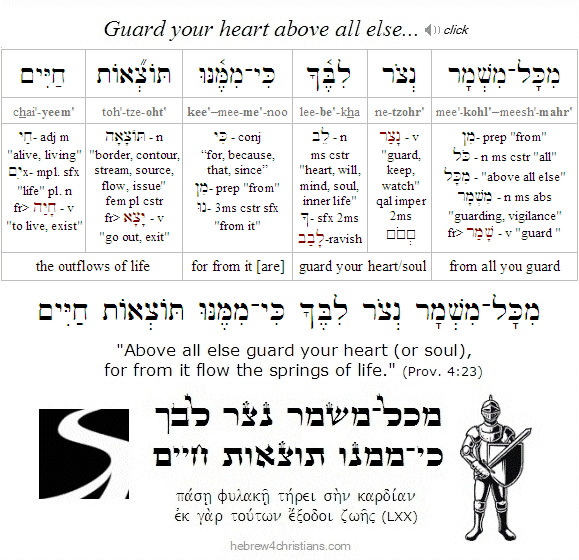 |
Assured by Love's Promise...
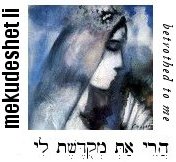
08.30.22 (Elul 3, 5782) Right now, if you are seeing this, take a moment to reaffirm that the Lord Yeshua is your deliverer and that you trust in Him for eternal life. As he promised: "I tell you the solemn truth, the one who hears my message and believes in the One who sent me has (i.e., present active indicative) eternal life and will not be condemned, but has passed over (literally, "crossed over") from death to life" (John 5:24). Note that the verb translated "has passed over" is "perfect active" that expresses completed action: "this one has already crossed over from death to life." In other words, the gift of eternal life is an accomplished reality (though it is only experienced as we truly surrender to the love and grace of God from a heart of faith). The "basis" of life is now radically new and of a different order. As the apostle Paul later summarized: "For it is by grace you have been saved (i.e., a perfect passive participle that denotes completed action done on your behalf with effects that continue to the present) through faith, and this is not from yourselves, it is the gift of God, not a result of works, so that no one may boast" (Eph. 2:9-10). I'm so glad it's not the strength of my grip that keeps me holding on to God, but the strength of His...
So "be strong and of good courage" – chazak ve'ematz! The Lord our God promises "never to leave you nor forsake you" and to be with you wherever you go (see Josh. 1:5,9; Heb. 13:5, Psalm 139; Matt. 28:20). In the Greek New Testament, the wording of Hebrews 13:5 is highly emphatic: Οὐ μή σε ἀνῶ, οὐδ᾽ οὐ μή σε ἐγκαταλείπω: "Not ever will I give up on you; no, not ever will I leave you behind." Alevai! May you hear the voice of the Good Shepherd calling you, and may He forever keep you under His watchful care. Amen.
Hebrew Lesson
Jer. 31:3b Hebrew reading (click):
Yearning for Heaven...

08.30.22 (Elul 3, 5782) It is an ongoing struggle to live in this world without being devoured by its fear, insanity, and violence. Yeshua prayed for his followers saying, "I am not asking you to take them from the world but to keep them from the evil one. They do not belong to the world any more than I belong to this world" (John 17:15-16).
To live in the world without belonging to the world marks the life of the tzaddikim who are seeking the house of love, the place where God abides. Even though we are given "traveling mercies" for our journey in this world, we must lift our heart toward heaven, desisting the world and its vanities, and regarding the place of God's heart to be our true home.
Abraham closed his eyes to this world and was given the inner light of truth that would reveal his way to God. "By faith Abraham obeyed when he was called to go out to a place that he was to receive as an inheritance. And he went out, not knowing where he was going. By faith he sojourned in the land of promise as in a strange land, living in tents with Isaac and Jacob, heirs with him of the same promise. For he was looking forward to the city that has foundations, whose designer and builder is God" (Heb. 11:8-10). For here we have no lasting city, but we seek the city that is to come (Heb. 13:14).
So let us lift up our souls unto the LORD and refuse to live in fear. Let us stand strong in faith, trusting God's promise even if we are sometimes in darkness. And let us take hope in God word: "Blessed is the one who makes the LORD his trust" (Psalm 40:4).
Hebrew Lesson:
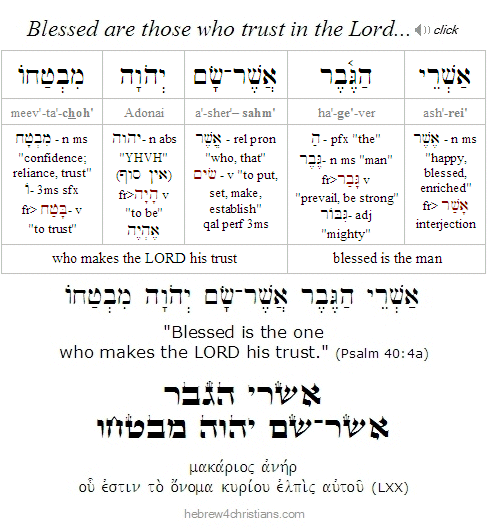 |
Teshuvah of Faith...
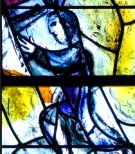
[ "Resolved, to live with all my might, while I do live." - Jonathan Edwards ]
08.30.22 (Elul 3, 5782) Teshuvah ("repentance") is an ongoing journey toward wholeness, and in this life we never fully arrive: we are always "on the road," and often we are in the dark... The way of teshuvah is therefore more of a question about how we walk the road than what the road is like or even where it may take us. As we turn to God, as we experience His claim on our lives and trust that we are His redeemed people, questions about "how" are revealed, one step at a time. We take up the cross daily, and in doing so we find ourselves on the road, even if we may not know where it is immediately taking us.
Hebrew Lesson
Isa. 50:10 Hebrew reading (click):
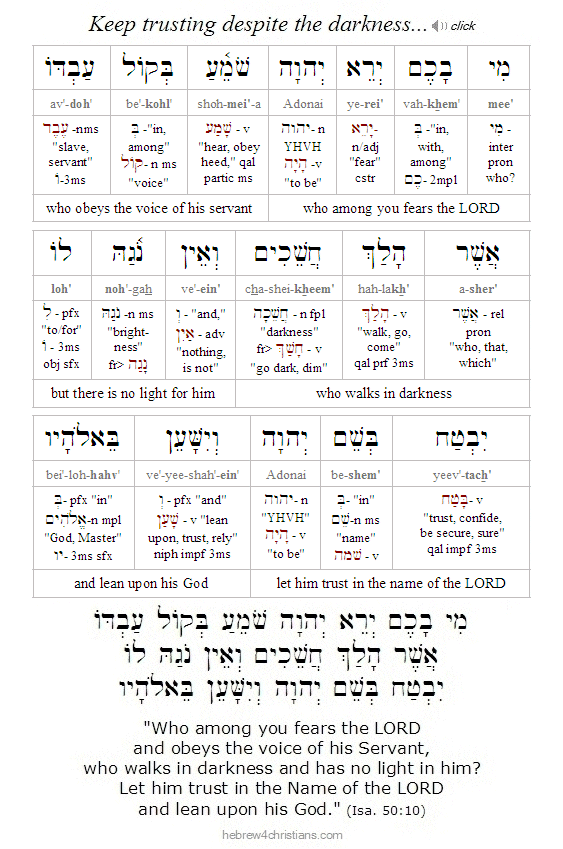 |
It is precarious to assume that a person who is walking in spiritual darkness must necessarily be outside of God's will, or that such a person is being punished by God. That, after all, was the karma-based theology delivered to Job by his "religious" friends... On the contrary, as Charles Spurgeon reminds us, "Spiritual darkness of any sort is to be avoided and not desired; and yet, surprising as it may seem to be, it is a fact that some of the best of God's people frequently walk in darkness; some of them are wrapped in a sevenfold gloom at times, and to them neither sun, nor moon, nor star appears. As the pastor of a large church, I have to observe a great variety of experiences, and I note that some of whom I greatly love and esteem, who are, in my judgment, among the very choicest of God's people, nevertheless, travel most of the way to heaven by night."
"My Lord God, I have no idea where I am going. I do not see the road ahead of me, I cannot know for certain where it will end. Nor do I really know myself, and the fact that I think I am following your will does not mean I am actually doing so. But I believe the desire to please you does in fact please you, and I hope I have that desire in all that I am doing. I hope that I will never do anything apart from that desire. And I know that if I do this you will lead me by the right road, though I may know nothing about it. Therefore, I will trust you always, though I may seem to be lost and in the shadow of death. I will not fear, for your are ever with me, and you will never leave me to face my perils alone." - Thomas Merton (Thoughts In Solitude)
Indeed, Yeshua himself entered into thick darkness for our sake, and he sometimes calls his followers go there, too (Col. 1:24). "Through struggle with his demons and the encounter with the LORD, Anthony had learned to diagnose the hearts of people and the mood of his time and thus to offer insight, comfort, and consolation. Such had made him a compassionate man." (Wisdom of the Desert Fathers)
There is a "center" or focus for life, however, and that is the cry of the heart for the LORD Himself. Therefore the LORD is called El Ne'eman (אֵל נֶאֱמָן), "the faithful God." His very Name means certainty, reliability, strength, truth, reality, presence, being, life, and so on... It follows from this that doubt is never from God, since the one who doubts is "driven like a wave of the sea and tossed" by the winds of change (James 1:6). We are given strength from heaven when we exercise bittachon (trust) that God is faithful and true, despite passing through the valley of the shadow of death itself. God abides with us during our sojourning. The LORD is the only enduring Reality in a constantly changing world, this world of flux and shadows, and He has designed it this way to cause men's hearts to search for him. "All flesh is grass, and all its beauty is like the flower of the field" - such is the condition of this ephemeral world and its fortunes. The flesh fades because the breath of the LORD blows (רוּחַ יְהוָה נָשְׁבָה) upon it (Isa. 40:7). God Himself has ordained human life to be a vapor (Psalm 39:5).
Nonetheless, despite the inescapable dissolution of life in this world, we are told not to fear, because there is good news for Zion: the LORD is coming with might to reward those who are waiting for him. He will tend his flock like a shepherd; he will gather his lambs and carry them close to his heart (Isa. 40:11). As the apostle Peter said, this good news is the eternal life given through the imperishable "seed" - the Word of God that rises forever in Yeshua (1 Pet. 1:23-25). May His Name be praised forever...
Hebrew Lesson
Isa. 40:8 Hebrew reading (click):
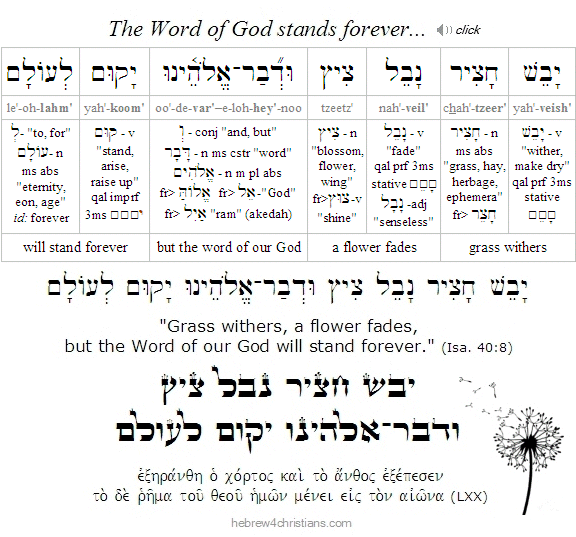 |
Being Made Whole with God...

08.29.22 (Elul 2, 5782) Shalom chaverim. In our Torah portion for this week (i.e., Shoftim) we read: "You shall be wholehearted with the LORD your God" (Deut. 18:13). Note that the word "wholehearted" in this verse (i.e., tamim: תָּמִים) is often translated as "perfect" or "blameless" in many Bible versions, though it is better to understand the word to connote being made "complete" or "whole."
When God said to Abraham, "I am El Shaddai; walk before me and be tamim (Gen. 17:1), he was not saying "be perfect" or "don't ever make a mistake," but rather be fully engaged, that is, to walk before God passionately, sincerely, with all his heart, and by doing so to "walk out" the relationship with full assurance that he is accepted and beloved by God. Likewise when Yeshua said "Be therefore perfect as your Father who is in heaven is perfect" (Matt. 5:48), he meant that we should be complete, finished, and "made whole" by knowing and receiving the overflowing love and light of God.
"You shall be wholehearted with the LORD your God" therefore is a mandate to know who you are, to know what is truly good as distinguished from what is evil, and to be united with God's passion to be healed from your inner conflicts and ambivalence (δίψυχος). We are made "whole" or "perfect" (i.e., complete) when we resolutely turn to God for healing of what divides our hearts, as it says: "The Torah of the LORD is perfect (תָּמִים), returning the soul" (Psalm 19:8). Understand the Torah's commandment, then: "You shall be tamim (i.e., whole and wholehearted) with the LORD your God," to be a prophecy of transformation for your life, friend... Amen: May you know "the love of Messiah that surpasses knowledge and be filled with all the fullness of God" (Eph. 3:19).
Hebrew Lesson
Deut. 18:13 Hebrew reading (click):
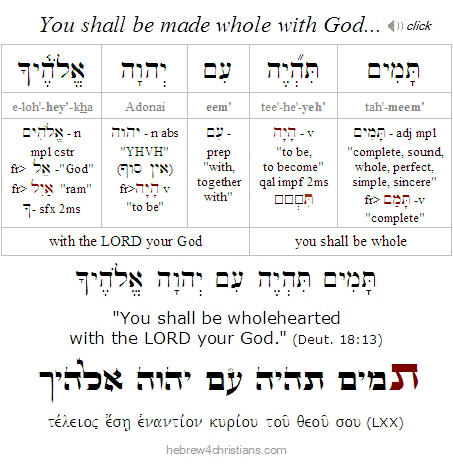 |
Note: In the Sefer Torah (i.e., the handwritten Torah scroll), the first letter of the word tamim ("wholehearted") is written extra LARGE in order to emphasize the importance of the word. Notice also the little word "with" (עִם) that follows in this verse. This hearkens to Micah 6:8: "What does the LORD require of you except to do justice (mishpat), and to love mercy (chesed), and to walk humbly (hatznea lechet) with your God?" Having a humble heart walks with the LORD. Humility begins with the awareness that 1) there is a God and 2) you are not Him.... It is the practice of da lifnei mi attah omed: "knowing before whom you stand" and living your life in light of this fundamental truth.
Our Marriage Anniversary...

08.29.22 (Elul 2, 5782) Olga and I celebrated our 19th year of marriage today. "He who finds a wife finds good blessing, and obtains favor from the LORD" (Prov. 18:22). Amen, I am grateful for the blessing of Olga and thank God for her life... Shalom.
The High Holidays Psalm...
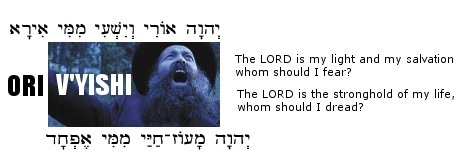
08.29.22 (Elul 2, 5782) It is an old custom to read (or to sing) the Book of Psalms during the month of Elul. In the famous Song of Moses, it is written: וַיּאמְרוּ לֵאמר אָשִׁירָה לַיהוָה / "and they spoke, saying: 'I will sing to the LORD' (Exod. 15:1). This phrase can be formed into an acronym for Elul (אלול), and the sages therefore reasoned that hearing the Psalms were vital during the Season of Repentance and Days of Favor.
Of all the great Psalms, however, Psalm 27 is considered the central one of the season of teshuvah (repentance). The midrash on the Psalms states that the word ori (אוֹרִי), "my light," refers to Rosh Hashanah (based on Psalm 37:6), whereas the word yishi (יִשְׁעִי), "my salvation" (lit. "my Jesus"), refers to the atonement given on Yom Kippur. King David also mentions that God would hide him in his sukkah (בְּסֻכּה) in the time of trouble, referring to the holiday of Sukkot (Psalm 27:5). Therefore since it alludes to all three of the fall holidays, Psalm 27 is regarded as the thematic Psalm for the High Holidays of the Jewish year.
Hebrew Lesson
Psalm 27:1 Hebrew reading (click):
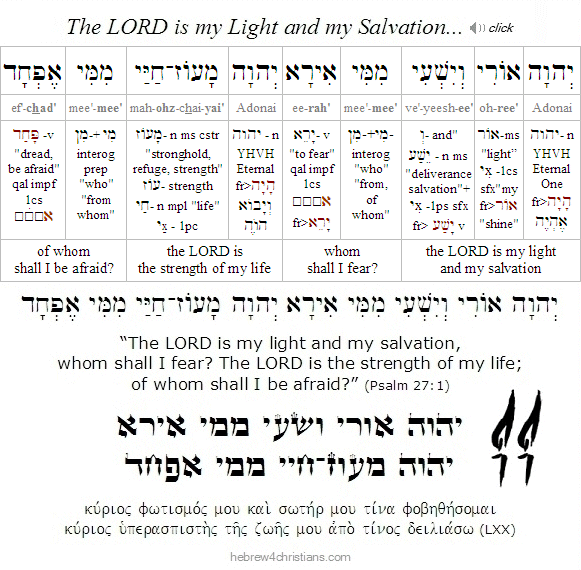 |
Finally, Psalm 27:13 contains a textual oddity. It is often translated: "Unless I had believed to see the goodness of the Lord in the land of the living." The word often translated "unless" is lulei (לוּלֵא), which read backwards spells Elul (אלול). This is said to suggest that salvation comes from faith that sees the goodness of the LORD. Repentance is only really possible if we believe in the goodness and love of the Lord "in the land of the living."
Personal note: Our six year old son Emanuel has been diagnosed with a serious case of pneumonia. He has conjunctivitis so that he can barely open his eyes. Our son Judah also has been sick for the past two weeks with intermittent fever and swollen lymph nodes. We sincerely appreciate your prayers for these boys...
Parashat Shoftim - שופטים
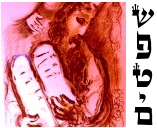
08.28.22 (Elul 1, 5782) Chodesh Elul tov, chaverim. Our Torah reading for this week (Shoftim) begins with the commandment that the people of Israel should appoint judges (i.e., shoftim: שׁפְטִים) and officers (i.e., shoterim: שׁוֹטְרִים) so that justice would be respected throughout the promised land (Deut. 16:18). The duty to practice justice is famously stated as, "tzedek, tzedek tirdof" (צֶדֶק צֶדֶק תִּרְדּף): "Justice, Justice you shall pursue" (Deut. 16:20). The word tzedek means "righteousness" and involves the obligation to adhere to moral truth. Throughout the portion the theme of social justice predominates, as the ethical characteristics for judges are defined, as well as for elders, kings, prophets, and priests, all of whom are responsible for maintaining a just and healthful society. As the prophet wrote: "The work of righteousness (tzedakah) shall be peace" (וְהָיָה מַעֲשֵׂה הַצְּדָקָה שָׁלוֹם), and added that "the service of righteousness (וַעֲבדַת הַצְּדָקָה) shall be quietness and security forever" (Isa. 32:17).
Hebrew Lesson
Opening words of the Torah portion (click):
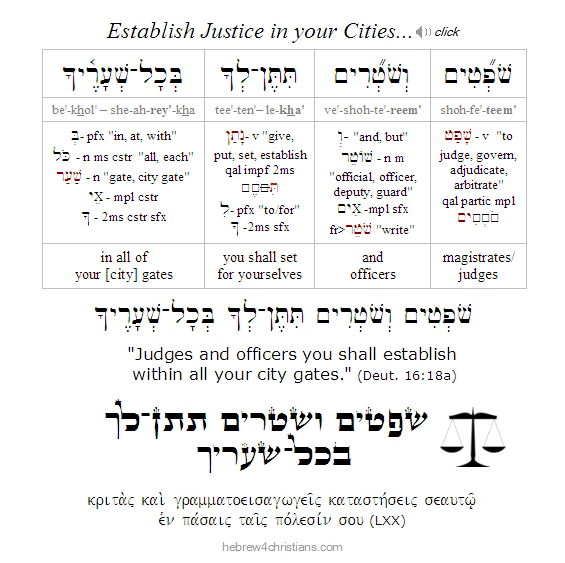 |
The call for justice, "tzedek, tzedek tirdof" (צֶדֶק צֶדֶק תִּרְדּף) is emphatically stated to teach that justice must be pursued in an entirely just manner, that is, the methods used to obtain justice must themselves be just... The Scriptures therefore do not advocate pragmatism or utilitarian thinking. There are no "noble lies" in the Kingdom of Heaven. Violence (verbal or physical) or deception done in the name of God is always forbidden and will be judged by the LORD. We must execute great restraint and caution when we seek to confront oppression in the world. If you want to change the world around you, begin with yourself....
Hebrew Lesson
Deut. 16:20 Hebrew reading (click):
Pilgrimage in a Circle...
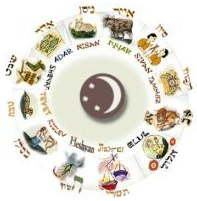
[ Sundown tonight is Rosh Chodesh Elul, the start of the month of Elul and the 40 day countdown to Yom Kippur. May we heed God's voice and turn to Him -- while there is still time.... shalom! ]
08.26.22 (Av 29, 5782) Our Torah reading this week (i.e., Re'eh) concludes with the commandment to make three "pilgrimage festivals" (i.e., shelosh regalim) each year: Passover, Shavuot (Pentecost), and Sukkot (Tabernacles). In the Torah, these "holidays" are called "appointed times" (i.e., mo'edim: מוֹעֲדִים), a word which comes from a root meaning witness (עֵד). Other words formed from this root include edah (עֵדָה), a congregation, edut (עֵדוּת), a testimony, and so on. The related verb ya'ad (יָעַד) means to meet, assemble, or even to betroth. The significance of the holy days, then, is for the covenant people of the LORD to bear witness to God's love and faithfulness by revisiting our history and by looking forward to their ultimate fulfillment, when we no longer pass through this world but abide in the heavenly reality. Meanwhile we trust in God's prophetic plan as revealed in the holy calendar, and observe the seasons as he has commanded. As it says, "All the paths of the LORD are love and truth to the ones guarding His covenant and His testimonies."
כָּל־אָרְחוֹת יְהוָה חֶסֶד וֶאֱמֶת
לְנצְרֵי בְרִיתוֹ וְעֵדתָיו
kohl-ohr·choht · Adonai · che'·sed · ve·e·met
le·noh·tze·rei · ve·ree·toh · ve·e·doh·tahv

"All the paths of the LORD are compassion and truth
for those who keep His pledge and His testimonies."
(Psalm 25:10)

Hebrew Study Card
Metaphorically the "paths of the Lord" (i.e., orchot Adonai: אָרְחוֹת יְהוָה) are likened to ruts or grooves created by the wheels of a caravan (i.e., orchah: אוֹרחָה) passing repeatedly over the same ground. These paths signify the Divine Presence journeying with God's children in this world. In temporal terms, we are able to discern the path by means of the divine calendar. God's love and faithfulness attend to His covenant (i.e., brit: בְּרִית, "pledge" or promise) and to the commemorations of the yearly "appointed times" (i.e., mo'edim: מוֹעֲדִם) which testify to God's love and faithfulness. Keeping God's testimonies, then, means that we will be careful to observe the biblical holidays in order to witness to God's truth...
Hebrew Lesson
Psalm 25:10 Hebrew reading (click):
Shababt Shalom and Chodesh Elul Tov, dear friends. May this coming Season of Teshuvah be one wherein we all draw closer to the LORD our God... Amen.
Seeing Moral Reality...

08.26.22 (Av 29, 5782) Our Torah portion (Re'eh) exhorts us to see clearly – to focus the will – by understanding that our choices have spiritual consequence, and that we are responsible for what we choose. "Re'eh - see!" Open your eyes and apprehend that there is overarching moral reality before which we are infinitely accountable. Therefore we are commanded first to see, because without clear vision we will be unable to discern what is a blessing and what is a curse – that is, we will be blind to the effect our choices have in our lives (Prov. 29:18).
Therefore choose this day, and choose life (בָּחַרְתָּ בַּחַיִּים)! Look and know there is good and there is evil, there is the sacred and the profane; there is real blessedness and loss... God will never allow us to be indifferent to Reality. We can (and we must) choose, and if we should regard ourselves as powerless, we deny the truth of our freedom – we turn away from possibility and become enslaved to a victim mentality.... You cannot opt out of responsibility for your choices, since not choosing is itself a choice, and therefore are "forced to be free" - and bear the consequences of how we live.
בְּאֵין חָזוֹן יִפָּרַע עָם
וְשׁמֵר תּוֹרָה אַשְׁרֵהוּ
be'ein · chah·zohn · yee·pah'·ra · ahm
ve'·shoh·meir · toh·rah · ash·rei·hoo

"Where there is no vision, the people cast off restraint,
but the one who keeps Torah is made happy" (Prov. 29:18).

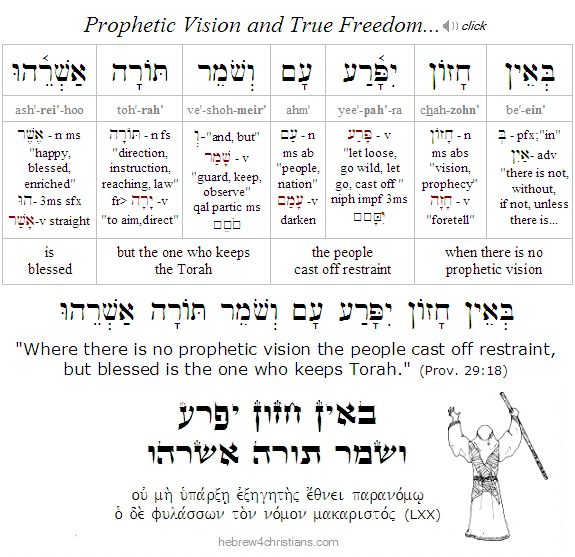
Shabbat Shalom Ahuvim... please remember us in your prayers as the kids have all been sick this week and are still not well. Kol tuv b'Yeshua and every blessing be upon you. - john
Created for a Purpose...

08.26.22 (Av 29, 5782) It's been said that God sends each soul into the world with a special message to deliver, a revelation that only he or she can disclose... No one else can bring your message to this world - only you can do this. And since God is entirely unique, you are called to be who you were created to be, not someone else. On his deathbed Reb Zusya said, "I am not afraid that the Holy One will ask me, 'Zusya, why were you not more like Moses?' Rather, I fear the Holy One will say, 'Zusya, why were you not more like Zusya?'
There are no "little people" in God's eyes, since each soul has been created by Him for His glory and purposes... As C.S. Lewis wrote, "There are no 'ordinary' people. You have never talked to a mere mortal. Nations, cultures, arts, civilizations -- these are mortal, and their life is to ours as the life of a gnat. But it is immortals whom we joke with, work with, marry, snub and exploit - immortal horrors or everlasting splendors" (The Weight of Glory). Life is a miracle and nothing is trivial. In the world to come you will be shocked to understand that everything you thought, everything you said, and everything you did was given to you from above, and therefore has tremendous significance (Matt. 12:36-37). Therefore may it please the Lord to open our hearts and eyes to truly come alive... Amen.
Hebrew Lesson:
Psalm 119:73 Hebrew reading:
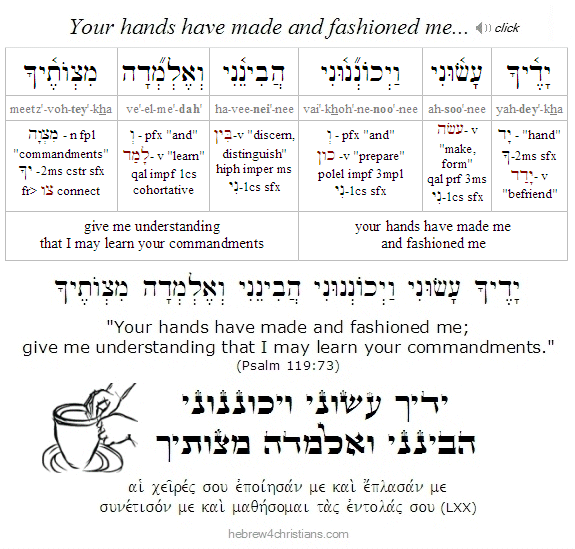 |
The Everlasting Way...
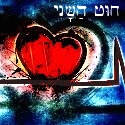
08.26.22 (Av 29, 5782) The sages say that teshuvah (return) was created before the world itself, as it says, "Before the mountains were born, or you brought the world into being, you were the Eternal God who says: "Return (שׁוּבוּ), O children of man" (Psalm 90:2-3). There is a deeper blessing that preceded our exile... The Lamb of God was slain from the foundation of the world, and God clothed humanity in divine sacrifice from the very beginning (Gen. 3:15,21; Rev. 13:8). The water of life (מַיִם חַיִּים) flows from the original orchard of Eden to the world to come (Gen. 2:10; Rev. 22:1). The LORD subjected creation to vanity for the sake of hope (Rom. 8:20), for the revelation of his greatness, as he descended into its depths to return and restore all things to himself. God decreed to enter space-time as the Son of Man, the "Second Adam," to become our Savior and healer. He came to reveal the face of God to us (2 Cor. 4:6). Yeshua "descended in order to ascend" so that would could know God's compassion, love and healing through his mesirat nefesh – his total sacrifice of body and soul – to return us to God.
Hebrew Lesson
Psalm 90:3 Hebrew reading (click):
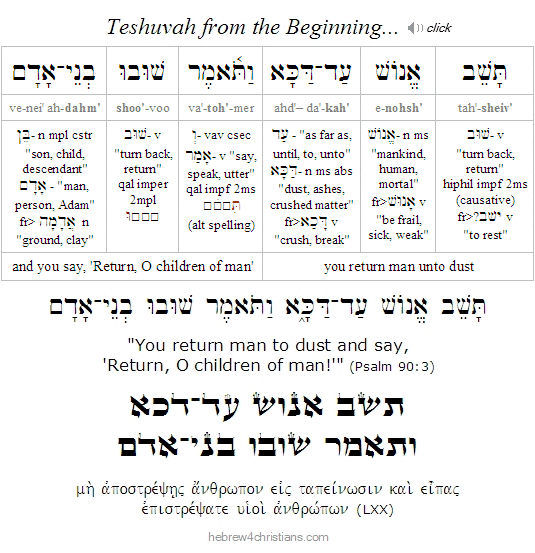 |
Teshuvah of Brokenness...
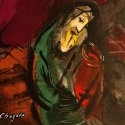
[ Rosh Chodesh Elul and the 40 days begins tomorrow evening... ]
08.26.22 (Av 29, 5782) Regarding the call to do teshuvah the LORD appeals: "Come back to me with all your heart (בְּכָל־לְבַבְכֶם) - with fasting, with weeping, and with mourning - and rend your hearts and not your garments, and return to the LORD your God (וְשׁוּבוּ אֶל־יְהוָה אֱלהֵיכֶם), for he is gracious and merciful, slow to anger, and abounding in love..." (Joel 2:13). Genuine teshuvah (repentance) is not about the "outer layers" of life, but engages the deepest depths of heart; it is not expressed in religious practices or rituals but in personal brokenness and utter desperation... As King David said, "the sacrifices of God are a broken spirit (רוּחַ נִשְׁבָּרָה); a broken and contrite heart (לֵב־נִשְׁבָּר וְנִדְכֶּה), O God, you will not despise" (Psalm 51:17). As is written in our Haftarah portion for Shabbat Shuvah: "Return O Israel (שׁוּבָה יִשְׂרָאֵל), to the LORD your God, for you have stumbled because of your iniquity; take with you words and return to the LORD (וְשׁוּבוּ אֶל־יְהוָה) and say to him, 'Take away all iniquity; accept what is good, and we will pay with bulls the vows of our lips'" (Hos. 14:1-2).
Note that the appeal to the LORD as "gracious and merciful, slow to anger, and abounding in steadfast love" (חַנּוּן וְרַחוּם הוּא אֶרֶךְ אַפַּיִם וְרַב־חֶסֶד) recalls the meaning of YHVH (יהוה) revealed to Moses in his state of brokenness over the sin of the Golden Calf (Exod. 34:6-7).
Hebrew Lesson
Joel 2:13b Hebrew reading (click):
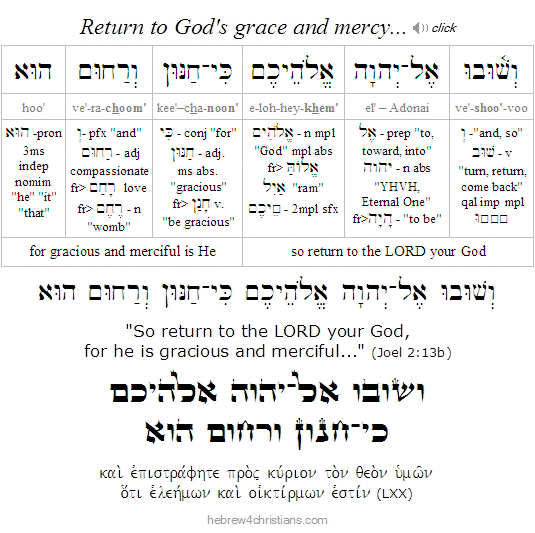 |
Seeing the Blessing...
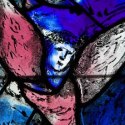
[ The following is related to our Torah reading for this week, parashat Re'eh.... ]
08.25.22 (Av 28, 5782) "See, I am giving... the blessing (הַבְּרָכָה) when you hearken (i.e, shama: שָׁמַע) to the commandments of the LORD your God which I command you today" (Deut. 11:26-27). Do not understand this as referring to blessing that results from hearing God's word, but rather the blessing that enables you to hear it in the first place... That is the blessing of being made awake, alive, and attuned to the Spirit of God. In this world you may or may not receive material blessing as you heed the truth, though you assuredly will be sustained by God's ongoing care (Psalm 37:25). The heavenly blessing is always present before you, however, when you sincerely turn to God and seek to do his will. And may it please the LORD our God to help us turn to Him now, in this hour...
"Blessed be the God and Father of our our Lord Yeshua the Messiah, who has blessed us in Messiah with every spiritual blessing in the heavenly places" (Eph. 1:3). Note that the Greek text translated "with every spiritual blessing" (i.e., ἐν πάσῃ εὐλογίᾳ πνευματικῇ) does not refer to "merely spiritual" as opposed to substantial or material blessings, but rather the blessing given by the Holy Spirit, those powers and graces "in heavenly places" (ἐν τοῖς ἐπουρανίοις), that derive from the kingdom of God, which are the highest blessings of all.
Hebrew Lesson
Psalm 112:1 reading (click):
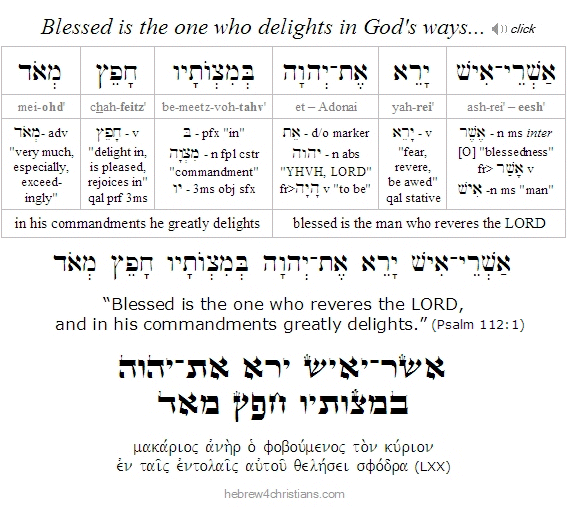 |
Education for Eternity...

[ The following entry concerns this week's Torah reading, parashat Re'eh... ]
08.25.22 (Av 28, 5782) "Know within your heart that, as a man disciplines his son, so the LORD your God disciplines you" (Deut. 8:5). This verse expresses the idea of "musar" (מוסר), or moral education intended to develop godly character within us. "My son, despise not the chastening (i.e., musar) of the LORD; neither be weary of his correction (i.e., tokhechah). For whom the Lord loves he corrects; even as a father the son in whom he delights" (Prov. 3:11; see also Heb. 12:5-6). In light of Torah we infer that God disciplines us because we are his children, for the sake of our growth and maturity, and not for vindictive reasons. God's correction indicates that he feels responsible for our character development, as a good father feels responsible for the character development of his child. Correction from the Lord is ultimately "soul-building," since it enables us to be partakers of His holiness -- and is grounded in His love and concern for us as our Heavenly Father (see Heb. 12:5-11). Hang in there, friend. "For the moment all discipline seems painful rather than pleasant, but later it yields the peaceful fruit of righteousness to those who have been trained by it" (Heb. 12:11). May God help us in our "education for eternity."
וְיָדַעְתָּ עִם־לְבָבֶךָ
כִּי כַּאֲשֶׁר יְיַסֵּר אִישׁ אֶת־בְּנוֹ
יְהוָה אֱלהֶיךָ מְיַסְּרֶךָּ
ve·yah·da'·ta · eem-le·vah·ve'·kha
kee · ka·a·sher · ye·ya·seir · eesh · et-be·noh
Adonai · e·loh·hey'·kha · me·ya·se·re'·ka

"So know with your heart that, as a man disciplines his son,
the LORD your God is disciplining you." (Deut. 8:5)

Click to listen and learn the Hebrew text:
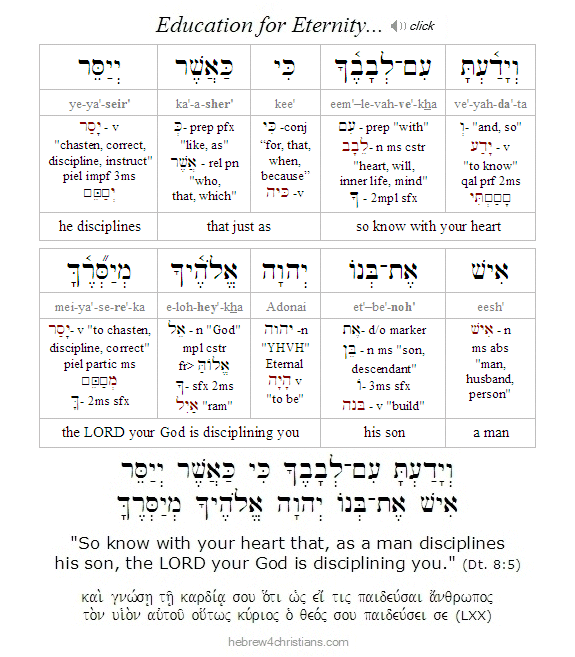
HaMakom - the Place of God
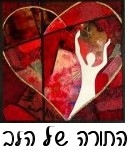
08.24.22 (Av 27, 5782) From our Torah portion this week (i.e., Re'eh) we read: "But you shall seek the place (הַמָּקוֹם) that the LORD your God will choose... there you shall go" (Deut. 12:5). This indicates the primacy of seeking: you must first seek "the place" and then you can go up (Matt. 6:33). The sages note that the gematria for this verse is the same as "You shall therefore lay up these words of Mine in your heart and in your soul..." (Deut. 11:18), which again reveals that the Divine Presence, "HaMakom" (הַמָּקוֹם), is manifest within the place of our hearts... If we seek God with all our hearts we will "come there," and we will find Him there. Our yearning for God leads us to the place of His Presence, as it says: "Open to me the gates of righteousness (שַׁעֲרֵי־צֶדֶק), that I may enter through them and give thanks to the LORD" (Psalm 118:19). It is our heartache, our hunger, thirst, and our yearning for love that opens the gate to come before God. Praise the LORD - His heart is the place we truly need.
Hebrew Lesson
Psalm 132:13 reading (click):
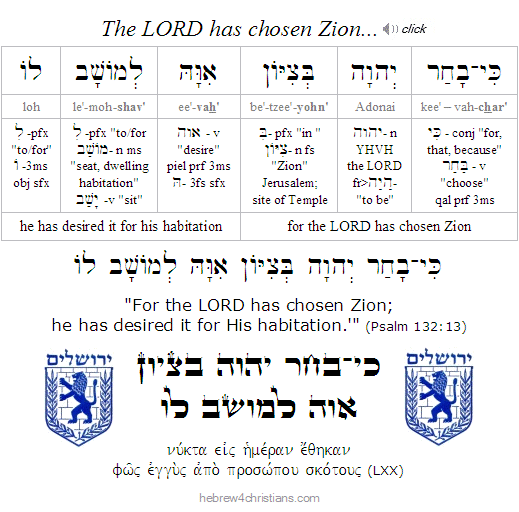 |
Of the "Place of God" (הַמָּקוֹם) the Torah says "that I may dwell in their midst" (Exod. 25:8), which can be translated as "that I may dwell within them," indicating that the point of the Tabernacle was to bring God within the hearts of His people... We must create a place within our hearts, in other words, for God to dwell within us. Yeshua likewise told us that we would experience peace and joy when we "abide in Him." Note that the numeric value of the word mishkan (מִשְׁכָּן) is the same as the word shema (שְׁמַע), "hear" or "listen" (Deut. 6:4). When we really stop to listen to the LORD, we will find His glorious and loving Presence...
Remember who you are...

[ The following entry concerns this week's Torah reading, parashat Re'eh... ]
08.24.22 (Av 27, 5782) One of the greatest mistakes is to forget who you really are and your beloved status before the LORD... "Fear not, for I have redeemed you; I have called you by name, you are mine" (Isa. 43:1). Forgetting who you are leads to forgetting who the LORD is, just as forgetting who the LORD is leads to forgetting who you are...
In our Torah portion this week we read: "You are children of the LORD your God (בָּנִים אַתֶּם לַיהוָה אֱלהֵיכֶם). You shall not cut yourselves for the dead" (Deut. 14:1). Here Moses reminds the people that they are children of the Eternal (יהוה) and therefore they were not to mourn for the dead like those without hope of life beyond the grave... Our God, the Father of Israel, is the Source of Life, and even if our earthly fathers die, we will never be orphans, because the LORD, the Everlasting God who is the "God of the spirits of all flesh" (אֱלהֵי הָרוּחת לְכָל־בָּשָׂר), always watches over us: "He will not let your foot be moved; he who keeps you will not slumber" (Psalm 121:3). But if we forget who we are, if we lose sight of our place in the Heavenly Father's heart, then we are likely to fall into a state of excessive and self-destructive mourning over the losses we experience in this world. In the most tragic cases, this can lead to the darkness of unremedied despair, "living among the tombs, crying out and cutting himself with stones" (Mark 5:5). On the other hand, if remember our place at the Father's table as his children, if we take hold that we are beloved of God - his very own "treasured people" - then we will regard the difficulties we encounter in this world as a test of faith intended for our good (Deut. 8:3,16, Jer. 29:11).
God regards us as his beloved children, and therefore we trust him as a child trusts his father. We may not always understand all that our father does, but we have complete faith in his good will toward us, even in the face of death itself. We do not engage in self-destructive mourning, then, because we are treasured by God and we trust in God's promises for eternal life (John 11:25). Because of this, Jewish halachah (legal custom) puts limits to grieving practices. Excessive mourning, interminable gloom, self-destructive anger, or the refusal to let go of our fear may indicate a lack of faith in God's care as our Father. Remember where it says "God works all things together for good," for that includes even physical death... Let us therefore "hope to the LORD (קַוֵּה אֶל־יְהוָה); be strong and strengthen our heart; and (again) let us hope to the LORD" (Psalm 27:14).
Hebrew Lesson
Isaiah 43:1b reading (click):
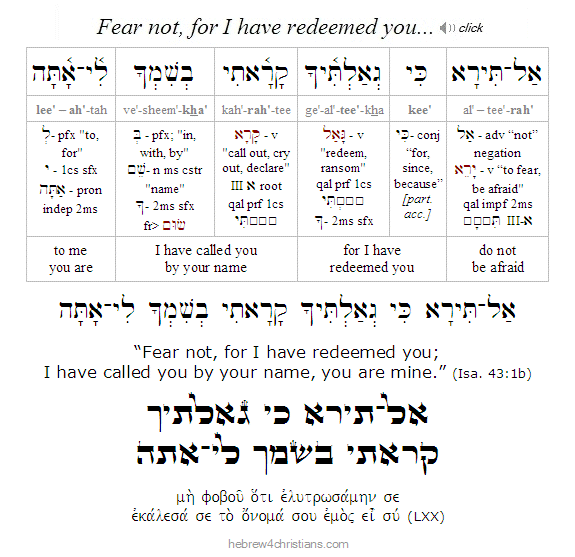 |
Note: For more on this very important topic, please see the article "Am Segulah."
Repentance and Paradox...

[ The following is related to the month of Elul and the "Season of Repentance"... ]
08.24.22 (Av 27, 5782) To be a human being is a paradox, caught between the realms of the infinite and nothingness; a union of endless possibility yet terminating limitation. Man desires to live forever but is conscious that one day he will die. He is an incongruity - a mix of flesh and spirit, saint and sinner, good and evil, angel and animal... In light of this, a spirituality that demands for us to be always happy, always "up," is dishonest, since the truth is grounded in what is real, and that includes both the miserable and the tragic as well as the joyful and sublime. It's not that there is no difference between good and evil within the heart, but both are part of who we really are. It is the bittersweet struggle, the process of walking as "saintly sinners," "holy fools," "dying immortals," and so on, that defines us. We must embrace our brokenness, in order to become whole; there is no healing without true confession of our need. Therefore we come to the paradoxical cross - the place of utter pain, separation, and death - to find healing, acceptance and life.
Please note this is not to deny that we are to walk by the Spirit and reckon ourselves dead to sin in the Messiah (Rom. 6:11); however, far from being a sign of a lack of spirituality, personal struggle is a sign of its presence.... Only those who are conscious of the tragic, who are haunted by the disparity between what "is" and what "ought" to be; only those who are divided within themselves, torn by inner tension and conflict - those aware that they are both in this world but not of it - sojourners, a long long way from home, homesick for the heavenly city, who inwardly ache and yearn to be fully redeemed - only these, it may be said, are consciously spiritual. After all, the worldling, the self-confident and self-possessed, rarely desire deliverance from themselves and are often content to rationalize the state of their soul; the spiritual person, on the other hand, senses a profound incompletion, a lack, a fracture that runs straight through the core of reality, a breach that needs to be healed...
I would utterly die of despair over myself were it not for the truth that it is not about who I am that is as important as about who He is...
There is great joy, of course, and we are indeed to "rejoice in the Lord always," but there is also real pain in our lives, and I'd rather be in the company of those mourning the mess they have made of their lives than with someone who thinks they've got it all together... "We are treated as impostors, and yet are true; as unknown, and yet well known; as dying, and behold, we live; as punished, and yet not killed; as sorrowful, yet always rejoicing; as poor, yet making many rich; as having nothing, yet possessing everything" (2 Cor. 6:8-10).
Hebrew Lesson
Psalm 41:4 Hebrew lesson (click):
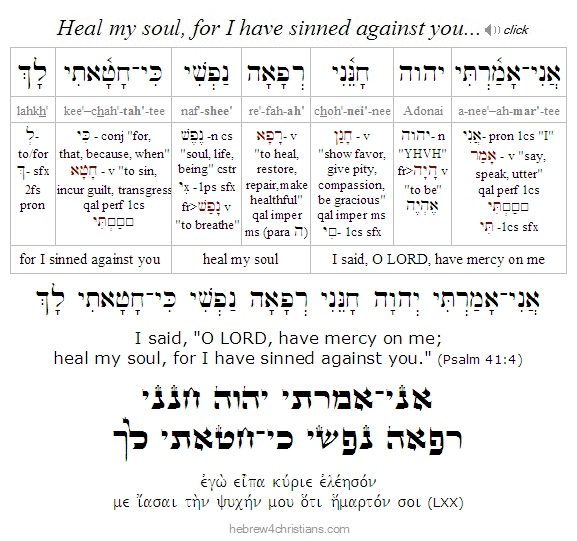 |
Personal Note: I want to express my heartfelt appreciation to each of you who stand with this ministry and encourage me to continue... You are in my prayers, and may it please the LORD our God to draw you ever closer to Him through the grace we share in Yeshua our glorious Savior. Amen, and chodesh Elul tov!
Dangers of Self-Deception...

08.23.22 (Av 26, 5782) When an enemy deceives you, he knows the truth about something and deliberately tries to conceal it from you. He may do this by telling you outright lies or by misleading your judgment in some way. This is called genivat da'at (גניבת דעת), or "stealing the mind." Regardless of the deceptive method used, however, once he defrauds you of the truth, you become subject to his manipulation and control. This is a common technique used by thieves, advertisers, politicians, public health officials, critical race and other social theorists, gender revolutionaries, community organizers, and so on....
There is a different kind of deception, however, that is more insidious than being misled by an external enemy. This deception comes from within the heart and involves choosing to believe a lie, often for self-serving or self-flattering reasons. To be sure, it is paradoxical that we can knowingly lie to ourselves, but is quite a common practice, and it makes sense once you realize that the essence of the "self" is dialectical (i.e., dialogical), and that your soul finds its voice in the midst of an conversation it has within itself.
Self-deception is a universal problem of humanity. The Scripture declares: kol derekh ish yashar be'einav – "every person's way is right in his own eyes" – indicating that by nature we are self-justifying creatures, prone to believe our own "propaganda" and engage in wishful thinking. We are apt to be biased in our self-examination and ready to excuse ourselves at every turn, rationalizing our behavior and suppressing the truth about ourselves in order to quell the voice of conscience within our hearts. When faced with an inconsistency between our behavior and our fictional self-image, we often regard ourselves as something other than what we really are. We prefer the lie to the truth. In short, we deceive ourselves.
"If anyone thinks himself to be something, when he is nothing, he deceives (or seduces) himself" (Gal. 6:3). When we hide (or suppress) our true motives from ourselves, things become spiritual precarious... If we suppress or squelch the inner voice of conscience and truth, we run the risk of becoming hardened, and ultimately locked into an irresolute and "divided self" in which the center does not hold... With no spiritual foundation within, we can become lost to ourselves. The Scriptures teach us, however, that we are responsible for our choices, and therefore we are responsible for how we think and negotiate the inner dialog of our heart. If we do not submit to the authority of God as our Creator and Lawgiver, we are left to sort through the clamor of passions on our own, in the transience of the moment...
The remedy for self-deception is honest acceptance of ourselves as God sees us, since vetokhein libot Adonai – "the Lord weighs the heart." The Hebrew word for "weighs" is takhan, meaning to measure, balance, make even, or to adjust to a standard. God's moral law functions as a "looking glass" of our inward condition, revealing both the divine standard of life required of us and also the truth of our own need for deliverance from ourselves.
It is only though the honest confession of our condition that we will find healing from the "divided self" – and thereby make our way right in the eyes of the Lord. As Yeshua said, you shall then know the truth, and "the truth shall make you free" (John 8:32).
Hebrew Lesson
Proverbs 21:2 reading (click):
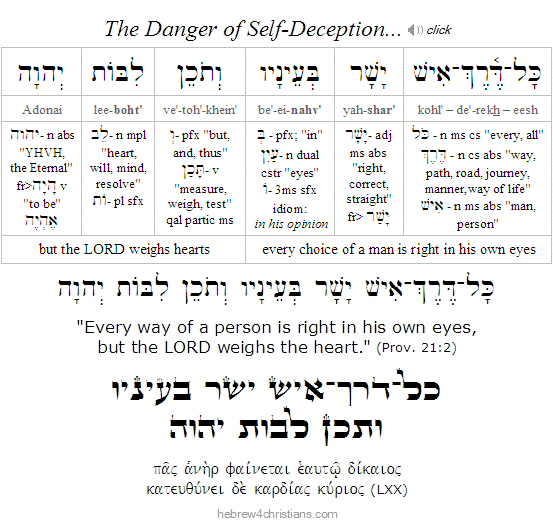 |
Daily Dvar Podcast:
Torah of the Good Eye...
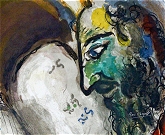
08.23.22 (Av 26, 5782) Shalom chaverim. The way we choose to see is ultimately a spiritual decision. In this "Daily Dvar broadcast, I discuss the "Torah of the Good Eye" and the spiritual need to seek goodness in everyday reality. I hope you will find it helpful. Links are below.
Linked Podcasts:
Related Article:
Teshuvah and Healing...

08.23.22 (Av 26, 5782) The biblical Hebrew word for healing is refuah (רְפוּאָה), from the root rapha (רָפָא), meaning to repair, restore, or make healthful. Some of the sages have said that the root letters indicate the meaning or essence of healing itself, namely, confessing the truth of God. This can be seen when we consider that the letter Resh (ר) refers to the head (i.e., rosh: ראשׁ), or that which is first -- suggesting that thinking and the will to do teshuvah (Psalm 90:2-3) is primary; the letter Pey (פּ) refers to the mouth (i.e., peh: פֶּה), that is, to speech, confession, and prayer; and the letter Aleph (א) refers to faith (אמונה) in the LORD (i.e., ehyeh: אֶהְיֶה), the One and only true God who is the Master of the universe (Exod. 3:14). So we can see how the Hebrew word for healing is connected first with changing our thinking by doing teshuvah, confessing our sin, and finally trusting God for life, as it says, "confess your sins to one another and pray for one another, that you may be healed" (James 5:16), and "I considered my ways, and turned my feet unto Thy testimonies" (Psalm 119:56).
Refuah shleimah (רְפוּאָה שְׁלֵמָה), or a complete healing, is ultimately found when we turn to God with all our hearts and find his shalom (שָׁלוֹם), as it says, "the Torah of the LORD is perfect, returning the soul" (Psalm 19:7). The Hebrew word for sickness (i.e., choleh: חוֹלֶה), on the other hand, comes from a root (חלה) that stands for blocked (חָסום) or profane (חל) learning (לִמוּד) of the Holy Spirit (ה). The LORD comes to seek and to save those who are lost, saying "I am your Healer" (אֲנִי יְהוָה רפְאֶךָ). Therefore confess your confidence that he forgives all your iniquities and heals everything that blocks you from his blessing. Amen.
Hebrew Lesson
Psalm 103:3 reading (click):
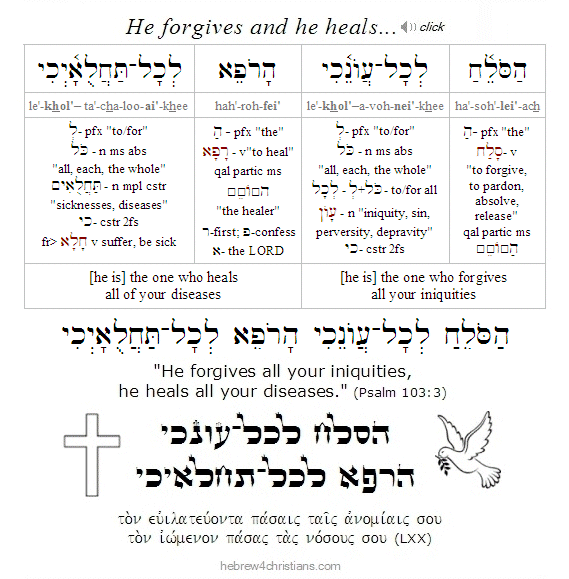 |
Please note that I am certainly not suggesting that believers will never experience sickness or physical death, since "as it is appointed unto men once to die, but after this the judgment, so Messiah was once offered to bear the sins of many; and unto them that look for him shall he appear the second time without sin unto salvation" (Heb. 9:27-28). The deepest healing we all need is spiritual, that is, deliverance from spiritual death by finding true peace with God, so that all that was, and is, and ever shall be about who we are finds its place in the divine love. We we born out of God's love, and we will die into God's love....
Torah of Teshuvah...
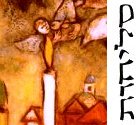
08.22.22 (Av 25, 5782) Perhaps you (like me) once learned Psalm 19:7 as, "The law of the LORD is perfect, converting the soul." However, the Hebrew text might better be translated as, "The instruction (i.e., Torah) of the LORD is perfect, returning the soul." This is the message of teshuvah (תְּשׁוּבָה), or "repentance," of course. We turn away from ourselves to discover that only the love of God given in Yeshua gives life to our dead hearts (Mark 1:15). Teshuvah is therefore first of all a matter of faith, of trusting in the miracle of God. And though it is indeed a great gift from heaven, it requires that we pass through the "narrow gate" of humility by confessing the truth about who we are (Matt. 7:13). We turn away from our pride; we acknowledge our inner poverty, our neediness, and we mourn over the loss and hurt caused by our sin. Teshuvah turns us away from our attempts to defend or justify ourselves and instead turns to God to heal our separation from love (Rom. 8:3-4). The miracle of love buries our old nature and transforms us into a new creation (2 Cor. 5:17).
Hebrew Lesson
Psalm 19:7 Hebrew read (click):
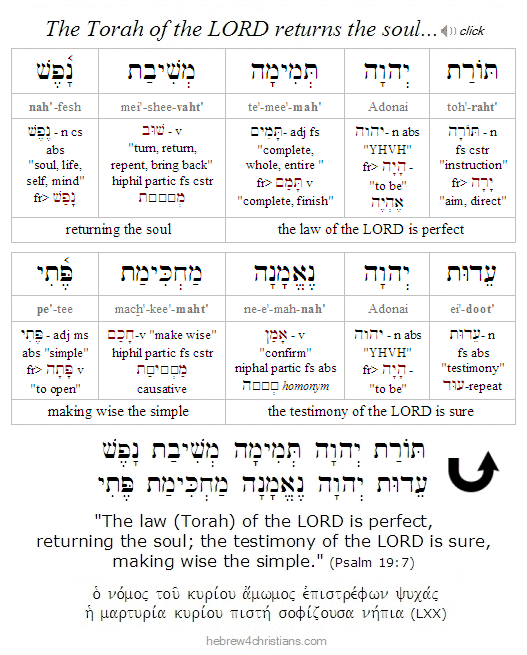 |
The 40 Days of Teshuvah...
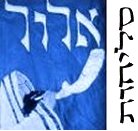
[ The Forty Day "Season of Repentance" begins Friday, August 26th this year... ]
08.22.22 (Av 25, 5782) The last month of the Jewish calendar (counting from Tishri) is called Elul (אֱלוּל), which begins at sundown on Friday, August 26th this year. Traditionally, Rosh Chodesh Elul marks the beginning of a forty day "Season of Teshuvah" that culminates on the solemn holiday of Yom Kippur. The month of Elul is therefore a time set aside each year to prepare for the Yamim Nora'im, the "Days of Awe," by getting our spiritual house in order.
During this time we make additional effort to repent, or "turn [shuv] toward God." In Jewish tradition, these 40 days are sometimes called Yemei Ratzon (יְמֵי רָצוֹן) - "Days of Favor," since it was during this time that the LORD forgave the Jewish nation after the sin of the Golden Calf (Pirke d'Reb Eliezar). Some of the sages liken these 40 days to the number of days it takes for the human fetus to be formed within the womb.
The advent of the "Season of Teshuvah" reminds us that we all fail, that we all are broken people, and that errors and mistakes are part of our daily spiritual life... We journey toward humility and compassion rather than struggle for perfection; we confess our need for forgiveness and seek reconciliation with all those we might have harmed... During this season it is common enough to hear messages about our need to turn and draw near to God for life, but it is equally important to remember that God turns and draws near to the brokenhearted for consolation. As it is said, the Lord is near to the nishbar lev (נִשְׁבָּר לֵב), the one with a broken and crushed heart (Psalm 34:18).
Brokenness is the means through which God performs some of His deepest work within our hearts. A.W. Tozer once said, "It is doubtful whether God can bless a man greatly until he has hurt him deeply." Likewise Alan Redpath once wrote, "When God wants to do an impossible task, he takes an impossible individual – and crushes him." William James called this deep work of the spiritual life Zerrissenheit, a term that roughly can be translated as "torn-to-pieces-hood," or a state of being utterly broken and in disarray... The brokenhearted live in day-to-day dependence upon God for the miracle...
"Resolved, to act, in all respects, both speaking and doing, as if nobody had been so vile as I, and as if I had committed the same sins, or had the same infirmities or failings as others; and that I will let the knowledge of their failings promote nothing but shame in myself, and prove only an occasion of my confessing my own sins and misery to God." - Jonathan Edwards
Hebrew Lesson
Psalm 34:18 Hebrew reading (click):
Note that the word "Elul" (אֱלוּל) may be read as an acronym for the phrase,
ani le'dodi ve'dodi li (אֲנִי לְדוֹדִי וְדוֹדִי לִי), "I am my beloved's, and my beloved in mine"
(Song 6:3), to encourage to become full of desire for the Beloved of our soul...
Torah's Weightier Matters...

[ The following entry concerns this week's Torah reading, parashat Re'eh... ]
08.22.22 (Av 25, 5782) Shalom friends. We read in our Torah portion this week: "See, I am setting before you today a blessing and a curse: the blessing (הַבְּרָכָה), if you obey (שָׁמַע) the commandments of the LORD your God... and the curse (הַקְּלָלָה), if you turn aside (סוּר, "withdraw," "draw back") from the way that I am commanding you today, to go after other gods that you have not known" (Deut. 11:26-28). Presupposed here, of course, is knowing what the commandments of the Lord are, which is why we are further commanded neither add nor to subtract from Torah (Deut. 4:2). We are neither to go back to passivity and slavery by making Torah another "taskmaster" (i.e., "adding" to Torah), nor are we to erect "private altars" by exalting our own interpretation as exclusionary and divine (i.e., "subtracting" from Torah) (Deut. 12:1-7). Instead, we must face up to our responsibilities by making difficult life choices: we must discern the "weightier matters of Torah" (see Matt. 23:23). When we were enslaved in Egypt, we were free from responsibility; we could play the victim by blaming others for our sins, our sorrows, our troubles. When were set free to serve God, however, we were given the power to choose to live outside of the realm of the curse by accepting God's blessing. Therefore choose life so you and your offspring may live!
Hebrew Lesson
Deut. 30:19b reading (click):
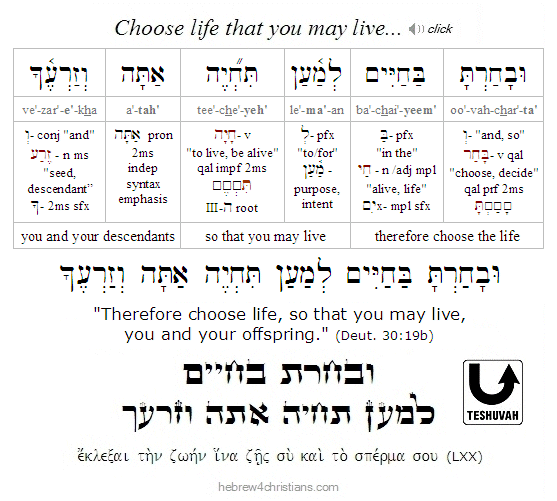 |
Prayer for this hour...

08.22.22 (Av 25, 5782) Many of us are hurting, Lord, and we sometimes are tempted to feel abandoned in our struggle... This world seems so senseless, so brutal, and so evil at times; we feel powerless, overwhelmed, and even sick inside... We look to You, O God, and for your mercy and power. Help us to accept what we cannot change and to completely trust in Your great healing, despite the sickness of the world around us and the sickness within us. Remind us that though we cannot change the world, we are given grace to sustain our trust in You, our glorious and merciful Healer. And may we never be ashamed; may we never grow bitter; may our sorrows lead us mechayil el chayil, from strength to strength. And may this time of testing lead us to greater wisdom, to compassion, and finally back to You. Amen.
God allows us to suffer because....... will any words here suffice? Suffering, like nearly everything else in the universe, is a mystery. Yes, we believe God will wipe away all our tears, but there are tears, after all, and things really hurt sometimes. Thomas Aquinas once said, "With faith there are no questions; without faith, there are no answers," which is to say that trusting in God's love ultimately gives rest to our relentless questions, whereas no amount of answers will ever be enough for the heart that refuses to trust. Having faith doesn't mean pretending to have all the answers, of course, but it affirms – even in the absence of understanding, in dark moments, in the midst of sorrow or pain or confusion – that hope is real, love is what matters most, and that God will never, ever fail us...
Again, it is a great paradox, but the more we understand our complete dependence on God, the more freedom we have from the weight of worldly fears, and this courage enables us to walk as His children in the midst of a crooked and perverse generation.
Hebrew Lesson:
Psalm 39:12 Hebrew reading:
The Blessing or the Curse...

08.21.22 (Av 24, 5782) Our Torah portion this week (i.e., parashat Re'eh) begins, "See (רְאֵה), I give before you today a blessing and a curse: the blessing (הַבְּרָכָה), if you obey the commandments of the LORD your God, which I command you today, and the curse (הַקְּלָלָה), if you ... turn aside from the way that I am commanding you today, to go after other gods that you have not known" (Deut. 11:26-28).
We obtain God's blessing (i.e., berakhah: בְּרָכָה) when we obey the LORD, and our decision to obey manifests the blessed state of walking before the Divine Presence (the direct object marker et (את) before the word "the blessing" alludes to the blessings of "Aleph to Tav," that is from Yeshua, as described in Lev. 26:3-13). As King David said, "I have set (שִׁוִּיתִי) the LORD always before me..." (Psalm 16:8). David made a choice to "set" the LORD before his eyes, for he understood that opening his eyes to Reality was the only path of real blessing.
On the other hand, we obtain God's curse (i.e., kelalah: קְלָלָה) when we close our eyes and "forget" that the LORD is always present.... Suppressing God's truth invariably leads to idolatry, that is, to self exaltation. Note that the root word for the word "curse" (kalal) means to be treated as of little account, and therefore "ratifies" the rebellious heart's attitude toward God. This is middah keneged middah - we are ignored by the LORD as we ignore Him, just as we seen by Him when we truly seek His face (Isa. 55:6-7).
So we see that the blessing or the curse really comes from our own inward decision, and God establishes the path we have chosen. As King David said, "God supports my lot" (Psalm 16:5), and Solomon wrote: לב אדם יחשׁב דרכו ויהוה יכין צעדו - "The heart of man plans his way, but the LORD directs his steps" (Prov. 16:9).
Click to listen and learn the Hebrew text:
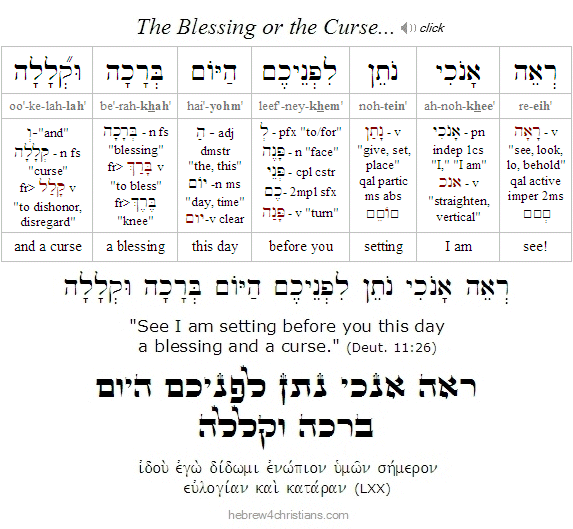 |
Note: "See, I am setting before you this day a blessing and a curse: the blessing, if you obey the commandments of the LORD your God, which I command you today, and the curse, if you do not" (Deut 11:26-28). Some of the sages say this admonition constitutes a severe reprimand of immaturity. Forty years after receving the Torah at Sinai and the people still need to be cajoled like children with promises of rewards and threats of punishments? Those who are mature in their faith recognize good and evil for what they are: they seek the good because it is the way of truth and life. It is a sign of carnality to seek God because of the manna he provides rather than to seek him as the giver of life itself....
Haftarah: Aniyah So'arah (עֲנִיָּה סעֲרָה)
The weekly haftarah portion (i.e., reading from the Prophets) is usually thematically connected with the weekly Torah portion; however, beginning with the Fast of the Fourth month until the end of the Jewish year, the connection changes. First we always read three prophetic portions of rebuke leading up to the fast day of Tishah B'Av. Then, following Tishah B'Av, and for the next seven weeks leading up to Rosh Hashanah (i.e., the new year), we read selections of comfort that foretell of the future redemption of the Jewish people and the coming Messianic Era.
The third of the "Seven Weeks of Comfort" leading up to Rosh Hashanah is called Aniyah so'arah (i.e., עֲנִיָּה סעֲרָה, "O afflicted and storm-tossed one," Isa. 54:11-55:5), which reminds the Jewish people of God's eternal and unconditional covenant of peace. Indeed of the Jewish people it is said, "no weapon that is fashioned against you shall succeed, and you shall refute every tongue that rises against you in judgment." Therefore the LORD invites the people to drink from the waters of life: "Incline your ear, and come to me; hear, that your soul may live; and I will make with you an everlasting covenant (בְּרִית עוֹלָם), my steadfast, sure love for David (Isa. 55:3; Luke 1:68-75; Acts 13:34). Note. however, that when this Sabbath occurs on the New Moon of Elul, Isa. 66:1-24 is read instead.
 |
Out of our Depths...
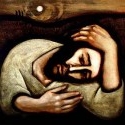
08.21.22 (Av 24, 5782) God gives us what we need, not necessarily what we want. My bout with sickness over the last four days was brutal, and I wanted to be free of its effects, though the Lord brought me low to open my heart to His presence in a new way. He knows what we need; His wounds heal. "Out of the depths have I cried unto thee, O LORD..."
"Our life is full of brokenness - broken relationships, broken promises, broken expectations. How can we live with that brokenness without becoming bitter and resentful except by returning again and again to God's faithful presence in our lives" (Henri Nouwen). It is a great paradox, but the more we understand our complete dependence on God, the more freedom we have from the weight of worldly fears, and this courage enables us to live as His children in the midst of our sorrows.
The Fight of your Life...

[ "The question is not, 'To be or not to be,' it is what we should be until we are not..."
- Soren Aabye Kierkegaard ]
08.18.22 (Av 21, 5782) Shalom friends. Because we are in the midst of a raging spiritual war, it is imperative to gird your mind and heart with the truth (John 17:17). Keep yourself armed for the battle and be aware of the common strategies of the enemy of your soul (2 Cor. 2:11). Trust in God's power to deliver you from evil (1 Cor. 10:13). Be resolute in your convictions, refusing to yield to worldly pressures to compromise your faith in the name of supposed "tolerance." It is not loving to suppress the truth of Yeshua or to minimize the truth claims of our Messiah's vision of reality.
Fight the good fight of faith, and take hold of those spiritual weapons that are "mighty through God to the pulling down of strongholds" (2 Cor. 10:4). Always be ready to yield every thought to the obedience of your LORD (2 Cor. 10:4). Know that this is the fight for your life, friend. The Prince of Peace (שַׂר־שָׁלוֹם) came to make peace between God and sinners through his sacrificial blood, but he did so by means of a terrible conflict with the powers of darkness, and his message still offends those enslaved by pride and fear...
The devil provides weapons for those in his service, namely violence, the lies of darkness, the impudence of pride, and the vain seductions of this world, and therefore it behooves us to avail ourselves of the weapons of faith received by the agency of the Spirit of God (Eph. 6:11-18). Be sober and vigilant because your adversary (ἀντίδικος) prowls about like a roaring lion, seeking someone to devour. Resist him, firm in your faith, knowing that the same experiences of suffering are being accomplished by your brethren who are in the world" (1 Pet. 5:7-8). Yield yourself to God, resist the the wicked one will flee from you (James 4:7). The end of all things draws near: stay awake and call upon the Name of the LORD.
Hebrew Lesson:
Proverbs 28:1 Hebrew reading:
Danger of Forgetfulness...
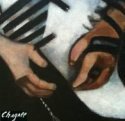
[ The following entry concerns this week's Torah reading, parashat Eikev... ]
08.18.22 (Av 21, 5782) The sages note: "Great is the power of forgetfulness, for it is also capable of causing you to forget the LORD your God, as it is written in this week's Torah portion (Eikev), "Guard yourself lest you forget the LORD your God by not keeping his commandments and his rules and his statutes, which I command you today" (Deut. 8:11).
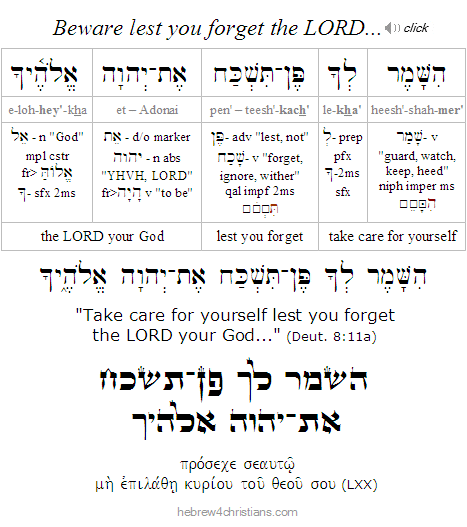 |
Note that the word "forget" in this verse comes from a root (i.e., shakhach: שָׁכַח) that means to ignore or "wither," thus evoking the words of Yeshua: "I am the vine; you are the branches. Whoever abides in me and I in him, he it is that bears much fruit, for apart from me you can do nothing. If anyone does not abide in me he is thrown away like a branch and withers (ξηραίνω); and the branches are gathered, thrown into the fire, and burned" (John 15:5-6). Therefore it is essential to earnestly strive to remember and to retain the truth that has been entrusted to you, as it is written: "Get wisdom; get insight; do not forget, and do not turn away from the words of my mouth" (Prov. 4:5).
קְנֵה חָכְמָה קְנֵה בִינָה
אַל־תִּשְׁכַּח וְאַל־תֵּט מֵאִמְרֵי־פִי
ke·neih · chokh·mah ke·neih · vee-nah
ahl-teesh-kach · ve·ahl-teit · mei·eem·rey·fee

"Get wisdom; gain insight; do not forget
and do not turn away from the words of my mouth.
(Prov. 4:5)

The Divine Light...
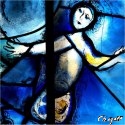
08.17.22 (Av 20, 5782) "If I say, surely the darkness shall cover me, even the night shall be light about me, for the darkness cannot hide from You, but the night shines as the day: nothing escapes your radiance" (Psalm 139:11-12). The heart of faith confesses that the light of God overcomes all the darkness, even the darkness of our own hearts, and furthermore that we can trust that God is in our darkness, in the silence, in the unknown... Yeshua was covered by the dark cloud as He suffered on the cross on your behalf. You come out of the shadows when you admit that you act just like other people, that you are human, in need of reconciliation yourself... Above all you need God. You need help. You need a miracle to help you to truly love. You may find excuses for many things, but you cannot escape the "wretched man that I am" reality that is grounded in your fears.
God sees in the darkness and is present there, too. When you feel alone, like an unbridgeable gulf lay between you and all that is good; when you feel like you want to scream but are afraid that even then no one would hear, may the LORD shine His light upon you... Amen, may His light shine upon you.
Hebrew Lesson
Psalm 139:11 reading (click):
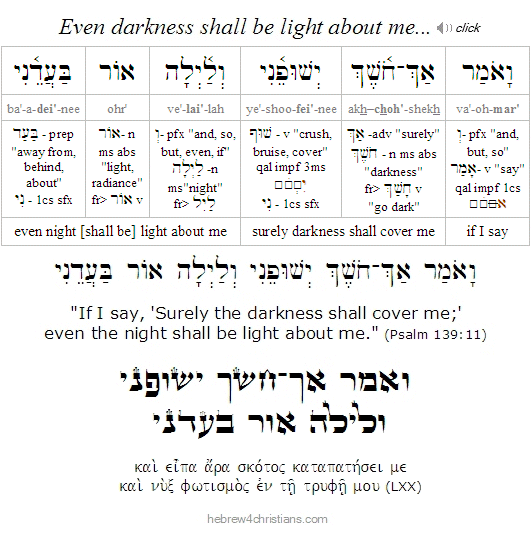 |
Prophetic Listening...
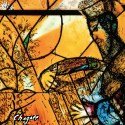
08.17.22 (Av 20, 5782) A verse from our Torah portion this week (i.e., Eikev) recalls Yeshua's words that "every scribe who has been trained for the kingdom of heaven is like a master of a house, who brings out of his treasure what is new and what is old" (Matt. 13:53). Rashi noted that the phrase often translated, "And it shall come to pass if you diligently hear" in Deut. 11:13, i.e., ve'hayah eem shamo'a teeshme'oo (וְהָיָה אִם־שָׁמעַ תִּשְׁמְעוּ), is grammatically puzzling, since the Hebrew literally reads "if you hear, you will hear," which suggests that as we listen attentively to the words of Torah, we will hear more, and we will encounter spiritual connections and applications that are new and ready for this hour. The early sages commented: "If you listen to the old, you will listen to the new" (Berachot 40a). Focusing our attention on the commandments even while in exile is likened to practice for the world to come, since then they will not be new to you when the final redemption appears. Happy are those who love the Torah. More light comes as we live in the truth (John 13:17). As Yeshua also said: "For to the one who has, more will be given, and he will have an abundance, but from the one who has not, even what he has will be taken away" (Matt. 13:12).
Hebrew Lesson
Deut. 11:13a reading (click):
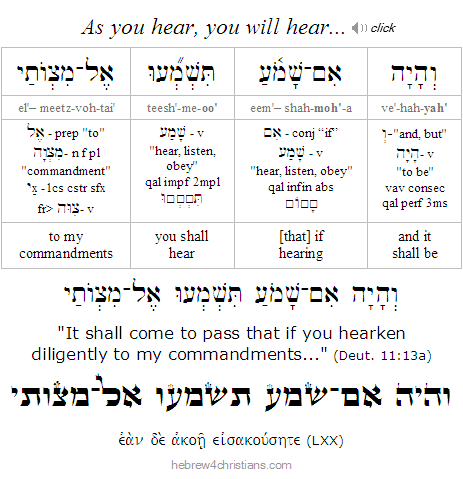 |
Heeding the Call of Hope...
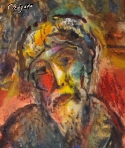
08.17.22 (Av 20, 5782) The only way out of the painful ambiguity of life is to hear a message from the higher world, the Heavenly Voice, that brings hope to our aching and troubled hearts: "Faith comes by hearing the word of Messiah - ῥῆμα Χριστοῦ" (Rom. 10:17). And yet what is the meaning of this message if it is not that all shall be made well by heaven's hand? There is hope, there is hope, and all your fears will one day be cast into outer darkness, swallowed up by God's unending comfort... "Go into all the world and make students (תַּלְמִידִים) of all nations" (Matt 28:19), and that means sharing the hope that what makes us sick - our depravity and despair - has been healed by Yeshua, and that we escape the gravity of our own fallenness if we accept his invitation to receive life in him. "For you will light my lamp; the LORD my God will outshine my darkness."
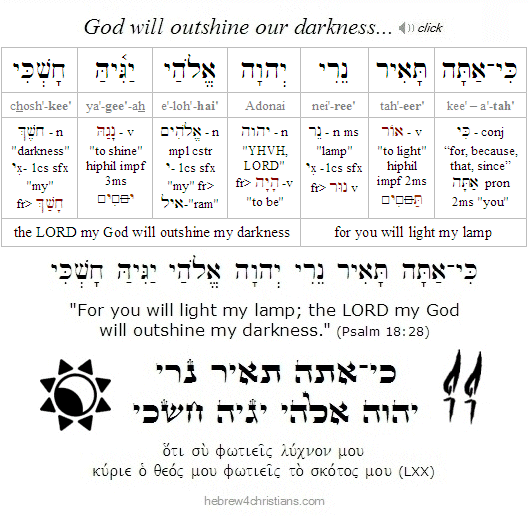 |
Exercising faith means actively listening to the Eternal Voice, the Word of the LORD that calls out in love in search of your heart's trust... To have faith means esteeming God's love for you, that is, understanding that you truly matter to God, and that the Divine Voice calls out your name, too.... Living in faith means consciously accepting that you are accepted by God's love and grace. Trusting God means that you bear ambiguity, heartache, and darkness, yet you still allow hope to enlighten your way.
The Rizhiner Rebbe once said, "Let your light penetrate the darkness until the darkness itself becomes the light and there is no longer a division between the two. As it is written, "And there was evening and there was morning, one day." Yea, the darkness and the light are both alike unto Thee, O LORD, as it is written: "If I say, "Surely the darkness shall cover me, and the light about me be night, even the darkness is not dark to you; the night is bright as the day, for darkness is as light with you" (Psalm 139:11-12).
We walk by faith, not by sight - by hearing the Word of God, heeding what the Spirit of God is saying to the heart (2 Cor. 5:7). For now we "see through a glass darkly," which literally means "in a riddle" (ἐν αἰνίγματι). A riddle is an analogy given through some resemblance to the truth, though quite often the correspondences are puzzling and even obscure. Hence, "seeing through a glass darkly" means perceiving obscurely or imperfectly, looking "through" something else instead of directly apprehending reality. This is contrasted with the "face to face" (פָּנִים אֶל־פָּנִים) vision and clarity given in the world to come, when our knowledge will be clear and distinct, and the truth of God will no longer be hidden. Being "face to face" with reality means being free of the riddles, the analogies, the semblances, etc., which cause us to languish in uncertainty... Now we know in part, but then shall we know in whole.
Despite the obscurity of life in this temporary age, we are encouraged not to lose heart, since though our outer self is wasting away, our inner self is being raised into newness (ἀνακαινόω) day by day (2 Cor. 4:16). "For our light and transient troubles are achieving for us an everlasting glory whose weight is beyond description, because we are not looking at what can be seen but at what cannot be seen. For what can be seen is temporary, but what cannot be seen is eternal" (2 Cor. 4:17).
Therefore walk "by faith" as if the invisible is indeed visible. Stay strong and keep hope, for it is through hope that we are saved (Rom. 8:24). Faith is the conviction (ἔλεγχος) of things unseen (Heb. 11:1). Do not be seduced by mere appearances; do not allow yourself to be bewitched into thinking that this world could ever be your home. No, we are strangers and pilgrims here; we are on the journey to the reach "the City of Living God, to heavenly Jerusalem, to the assembly of the firstborn who are enrolled in heaven" (Heb. 12:22-23). Therefore do not lose heart. Stay focused and keep to the narrow path. Set your affections on things above since your real life is "hidden with God" (Col. 3:1-4). Do not yield to the temptation of despair. Look beyond the "giants of the land" and reckon them as already fallen. Keep pressing on. Chazak, chazak, ve-nit chazek - "Be strong, be strong, and let us be strengthened!" Fight the good fight of the faith. May the LORD our God help you take hold of the eternal life to which you were called (1 Tim. 6:12). Amen.
 |
The Whole Commandment...
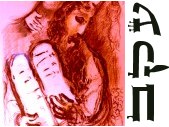
[ The following is related to our Torah reading for this week, parashat Eikev.... ]
08.16.22 (Av 19, 5782) From our Torah portion for this week (i.e., parashat Eikev) we read: "The whole commandment that I am commanding you this day you shall observe and do, so that you may live..." (Deut. 8:1). The Hebrew phrase kol ha'mitzvah (כל־המצוה), here translated as "the whole commandment," refers to the heart attitude, or the inner passion of the soul. Some have linked the word "commandment" (מצוה) with the word "connection" (צוותא), suggesting that God's commandments are the means by which we cleave to Him, as is written: "this is the love of God (אהבת אלהים), that we hold fast to his commandments" (1 John 5:3). The commandments are "for life" (Lev. 18:5), which means they serve as the call of the Beloved to rise to something far greater...
Hebrew Lesson
Deut. 8:1 Hebrew reading (click):
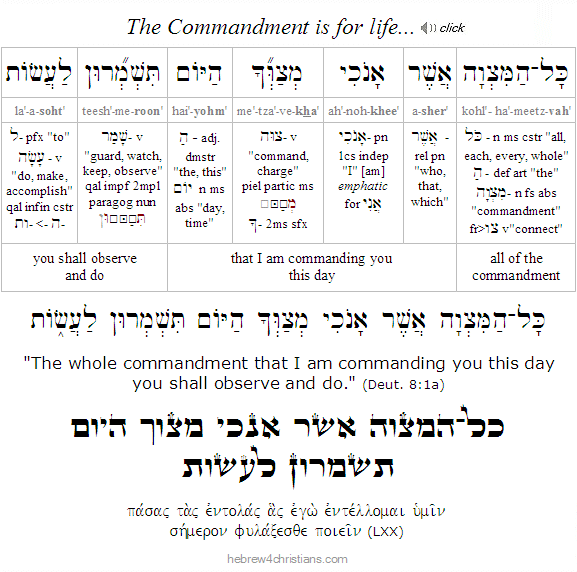 |
The "whole commandment," then, is to walk in God's love and to grow into the full stature of his truth. As it is written, tamim yiyeh im Adonai Elohekha: "You shall be wholehearted with the LORD your God - תמים תהיה עם יהוה אלהיך" (Deut. 18:13), and "Fear God and keep his commandments - כי־זה כל־האדם - for this is the whole man" (Eccl. 12:13).
The Kotzker once said, "The prohibition against making idols includes the prohibition against making idols out of the commandments. We should never imagine that the whole purpose of the Torah is its outer form, but rather the inward meaning." Indeed, sacrificial blood was placed over the tablets of the law (i.e., the blood sprinkled on the kapporet, or the "crown" of the Ark) that represented God's forgiveness and atonement for sin. The life is "in the blood," which represents God's passion, the deepest truth of Torah. And this is the message of the gospel itself, of course, since the blood of Yeshua passionately shed for our sake has opened up a new and everlasting way for us to be rightly related to God (Heb. 9:12).
Hebrew Lesson
Eccl. 12:13 Hebrew reading (click):
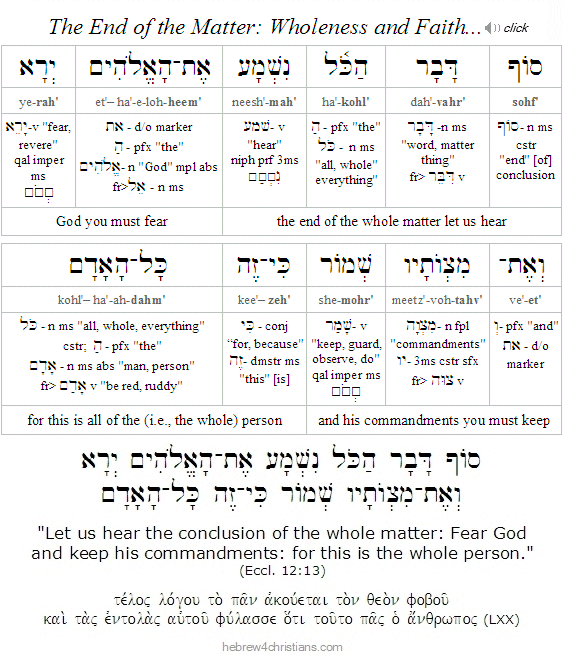 |
Gratitude and Seeing...

08.16.22 (Av 19, 5782) We are instructed to look for small miracles -- everyday "signs and wonders." In our Torah portion for this week (i.e., Eikev) we read: "And you shall bless the LORD your God for the good land he has given you." (Deut. 8:10). Whenever we derive benefit or enjoyment from something we are to bless (i.e., thank) God for his goodness. Jewish tradition says that if one eats or drinks without saying a blessing, it is as if he has stolen from God. From the verse, "What does the LORD ask of you..." (Deut. 10:12), the sages infer that a person should say at least 100 blessings a day, since the word מה, "what," alludes to the word מאה, a "hundred." The Hebrew term for gratitude is hakarat tovah (הַכָּרַת טוֹבָה), a phrase that means "recognizing the good." The heart looks through the eye, and therefore how we see is ultimately a spiritual decision: "If your eye is "single" (i.e., ἁπλοῦς, sincere, focused)," Yeshua said, "your whole body will be filled with light" (Matt. 6:22). When we see rightly, we are awakened to God's Presence in the little things of life, those small miracles and glories that constantly surround us. The good eye of faith sees hundreds of reasons to bless God for the precious gift of life (1 Cor. 10:31). Open your eyes... The LORD is "enthroned among the blessings of His people" (Psalm 22:3).
Addictions, cravings, lusts, etc., arise from a refusal to be satisfied, by hungering for more than the blessing of the present moment. "My people have committed two evils: they have forsaken me, the fountain of living waters, and hewed out cisterns for themselves, broken cisterns that can hold no water" (Jer. 2:13). The living waters are present for us, but we will only find them if we open our hearts to the wonder of God in this moment. We can "break the spell" of continual dissatisfaction, of the power of greed, ambition, and so on, when we discover that our constant hunger is really a cry for God and His blessing. This is the blessed "hunger and thirst" given by the Spirit (Matt. 5:6). Our sense of inner emptiness is an invitation to come to the waters and drink life. So come to God's table and ask the Lord Yeshua to give you the water that will satisfy your heart's true thirst for life...
It is written: "Oh, taste and see that the LORD is good! Blessed is the man who takes refuge in him! Oh, fear the LORD, you his saints, for those who fear him have no lack" (Psalm 34:8-9). We can only "taste and see" when we are earnest however, when we seek God with passion... When you pray, lift up your heart and soul to God, asking for the miracle to surrender to Him in the truth. Where it says, "with all your heart" (בְּכָל־לְבָבְךָ), present before him all your passion and desires; your hopes and your needs, your fears and your anger; and where it says, "with all your soul" (וּבְכָל־נַפְשְׁךָ), offer before him your very soul, as if to be sacrificed in his service; and where it says, "with all your muchness" (וּבְכָל־מְאדֶךָ) offer to him all your strength, all your means, and all your dreams. Ask to be filled with the Ruach HaKodesh to be enabled to apprehend the glory of God in the face of the Messiah (בִּפְנֵי הַמָּשִׁיחַ), through whom we are being transformed for the glory of God.
Hebrew Lesson
Psalm 34:8 Hebrew reading (click):
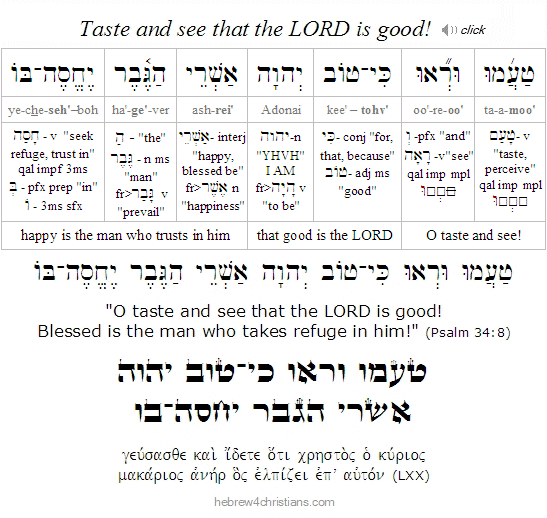 |
Idolatry and Rage...
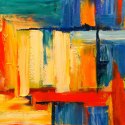
[ The following is related to our Torah reading for this week, parashat Eikev.... ]
08.16.22 (Av 19, 5782) We are warned not to destroy ourselves by allowing bitterness, anger, or fear to consume our hearts. In our Torah this week (Eikev) we read: "And you shall not bring an abominable thing (תּוֹעֵבָה) into your house and become devoted to destruction like it" (Deut. 7:26). The sages of the Mishnah said that yielding to rage is equivalent to idol worship and should never be brought into the home. Indeed, rage is linked with avodah zarah - idolatry - because it exalts the ego and claims that the Lord can't (or won't) help you in your moment of testing or need. The Scriptures are clear, however, that "there is no test given to you that you cannot handle with God's help" (1 Cor. 10:13), and we are invited to come boldly before the Divine Presence to find just such help in our time of need (Heb. 4:16). Believing that you can't overcome your fear or anger problem is therefore a form of idolatry since it assumes that you are enslaved to a self-destructive power greater than yourself, and that you owe its allegiance by obeying its impulses. However it is written: Lo yiheyeh vekha el zar (לא־יִהְיֶה בְךָ אֵל זָר) -- "there shall be no foreign god within you" (Psalm 81:9), which means that we must expressly deny the ego's demand to have its will be done. Being full of a sense of self-importance (or even powerlessness) is to be ensnared by vanity and to have a foreign god "within you." God and human arrogance cannot coexist - since the inner world of the arrogant person denies God's rightful place as King. As it is written in our Scriptures: "The wrath of man (קֶצֶף אָדָם) does not work the righteousness of God" (James 1:20). God will indeed help us if we ask according to his will (1 John 5:14-15). Thank you, Lord. "Blessed is the LORD who delivers us from self-destruction." Amen.
בָּרוּך יהוה שֶׁמַצִיל אוֹתנוּ מֵהַרֵס עַצְמִי
bah·rookh · Adonai · sheh·ma·tzeel
oh·tah'-noo · mei'·ha-reis · atz·mee

"Blessed is the LORD who delivers us from self-destruction."
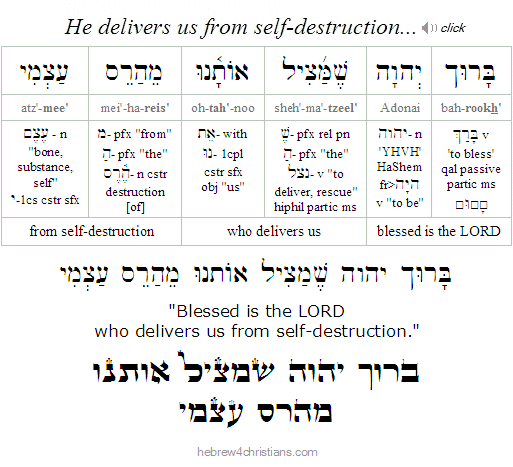
Mehareis Atzmi Blessing (pdf)
Connecting with God...
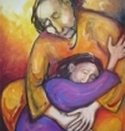
[ Even one step in the right direction is - a step in the right direction; the miracle begins there... ]
08.15.22 (Av 18, 5782) From our Torah portion this week (i.e., parashat Eikev) we read: "And now, Israel, what does the LORD your God require of you, but to fear the LORD your God, to walk in all his ways, to love him, to serve the LORD your God with all your heart and with all your soul, and to keep the commandments and statutes of the LORD, which I am commanding you today for your good?" (Deut. 10:12-13). Ultimately we must make the choice whether we will respect life or not, since that is the question set before us... In this present world, God "hides" so that people may seek him (Isa. 45:15; Matt. 13:10-15). The voice of conscience may be suppressed and the revelation of nature ignored; moreover, some things are perceived only if they are looked for in the right way, for instance, the Divine Presence is not apprehended apart from humility and reverence. We must "make room" for wonder; we must open the "eye of the heart" to see what is greater than our everyday vision. "It is good to look at the sky often, as this helps develop the awe of God." Indeed the word for fear, yirah (יִרְאָה), is connected with the word for seeing, ra'ah (רָאָה). When we really see life as it is, we will be filled with wonder over the glory of it all. Every bush will be aflame with the Presence of God and the ground we walk upon shall suddenly be perceived as holy (Exod. 3:2-5). Nothing will seem small, trivial, or insignificant. In this sense, "fear and trembling" (φόβοv καὶ τρόμοv) before the LORD is a description of the inner awareness of the sanctity and eternal significance of life itself (Psalm 2:11, Phil. 2:12).
Connecting with God is paradoxical. We find verses that teach both the fear of the Lord (i.e., his power), and others that teach the amazing love of the Lord (i.e., his grace). We are drawn to God in adoration, appreciation, wonder, and love, and yet we are compelled to shrink back because of His overwhelming power, glory, holiness, and radiance. Therefore we see "the disciple whom Jesus loved" both leaning on his chest but also falling on his face in "dreadful adoration" (John 13:23; Rev. 1:17). Only when these heart attitudes are combined is the heart balanced. But the fear of the Lord is primary (see Psalm 111:10; Prov. 1:7, 9:10), and when we walk in it, we are released from the common fears of men by apprehending a far surpassing power that overrules all things. Again, it is a paradox: if we fear lesser things we lose sight of the awe of God; but if we first revere God, we will lose sight of lesser fears.
In Jewish tradition, seeing the Presence of God in all things is called yirat ha-rommemnut (יִרְאַת הָרוֹמְמוּת), or the "Awe of the Exalted." We might get a sense of this reverential awe when we behold the canopy of stars in the night sky, or when we look down from atop a mountain peak, or when we catch site of a spectacular sunset. Or we might experience it during the birth of a baby or the death of a loved one... This sense of awe or "transcendent mystery" is also called yirat Adonai (יִרְאַת יְהוָה), the "fear of the Name." It presents a holy hush, a feeling that you are standing before something utterly wonderful, sacred, set apart, mysterious, and profoundly significant; it both attracts yet causes you to tremble...
Hebrew Lesson
Deuteronomy 8:6 reading (click):
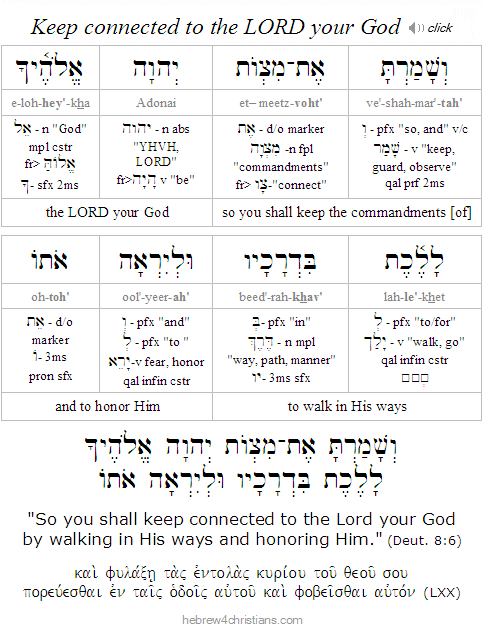 |
Opening your Heart...

08.15.22 (Av 18, 5782) Our Torah reading for this week (i.e., parashat Eikev) appeals for us to let go of our hurt and anger: "Circumcise (i.e., cut away) the barriers to your heart, and be no longer unresponsive to love" (Deut. 10:16). The metaphor of a "circumcised heart" (ברית מילה של הלב) symbolizes cutting away the outer covering of the heart so that it is "opened up" to feel once again. God wants us to let go of "hard feelings" so we can experience compassion (i.e., com+passion: "feeling-with") and sympathy for other people... Heart circumcision represents a radical turning away from the insular realm of the self toward the emotional realm of others and God. When our hearts are open, we are able to receive the flow of the Spirit of God and obey the "law of the Messiah" (תּוֹרַת הַמָּשִׁיחַ) to bear one another's burdens (Gal. 6:2).
וּמַלְתֶּם אֵת עָרְלַת לְבַבְכֶם
וְעָרְפְּכֶם לא תַקְשׁוּ עוֹד
oo·mal·tem · et · ohr·lat · le·vav·khem
ve·ohr·pe·khem · loh · tak·shoo · ohd

"Cut away the barriers to your heart,
and be no longer unresponsive to love."
(Deut. 10:16)

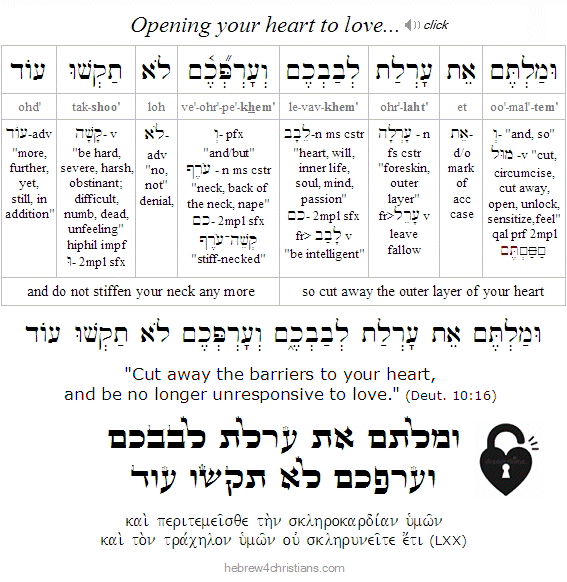
Physical circumcision represents a sign or mark of inclusion; it is a token that you are one of God's family, a Jew, though it is only a sign or token. Spiritual circumcision is an inner operation of the heart that marks you a true child of heaven. It is about your identity and purpose. Therefore we see the paradox that some physical Jews are not spiritual Jews, and some spiritual Jews are not physical Jews (though some are both), as the Apostle Paul said: For no one is a Jew who is merely one outwardly, nor is circumcision outward and physical. But a Jew is one inwardly, and circumcision is a matter of the heart, by the Spirit (ἐν πνεύματι), not by the letter. His praise is not from man but from God (Rom. 2:28-29).
Metaphorically speaking, a heart that is insensitive, indifferent, unfeeling, and callous toward the needs of others is "hard" or "uncircumcised." Often such hardness comes as a result of living in a fallen world. Many wounded people live with "scar tissue" that surrounds their heart, making them feel numb and unwilling to open up and trust others. Their affections have become disordered and they rationalize blaming others or seeking various forms of entitlement. "Turning off your heart" can mean suppressing any positive regard for others (empathy) while nurturing anger and self-righteousness, or it may mean withdrawing from others as a lifeless shell (both approaches vainly attempt to defend the heart from hurt). Although Yeshua always showed great compassion, especially to the wounded and broken in spirit (Isa. 42:3), He regularly condemned the "hardness of heart" (called "sclero-cardia," σκληροκαρδία) of those who resisted his message of healing and love.
A hard heart is closed off and impermeable to love from others, and especially from God. It is a "difficult" (קָשֶׁה) heart, inflexible and even cruel. Scripture uses various images to picture this condition, including a "heart of stone" (Ezek. 36:26, Zech. 7:12), an "uncircumcised heart" (Jer. 9:26), a "stiff neck" (Deut. 31:27), and so on. Stubbornness is really a form of idolatry, an exaltation of self-will that refuses to surrender to God. If you are wounded and afraid to open your heart in trust to others, ask God for healing...
 |
Wounds of Loneliness...

08.15.22 (Av 18, 5782) The late Henri Nouwen said that there are two great fears (or wounds) that we all face. The first is the fear that we were not wanted at the time of our birth into this world, and the second is that we will not be wanted at the time of our death. "Not being welcome is your greatest fear. It connects with your birth fear, your fear of not being welcome in this life, and your death fear, your fear of not being welcome in the life after this. It is the deep-seated fear that it would have been better if you had not lived" (Inner Voice of Love). If you carry a wound of abandonment within your heart - if you live in dread over your worth as a human being, seriously wondering whether it would have been better had you never been born, then you know the taste of hell itself - the emotional prison of feeling lost, defective, rejected, shameful - unable to love or to be loved...
Is not the lament of the lonely heart to find a sense of welcome, or acceptance, or peace within? Is it not the heart's cry for connection? Yet even the very gospel message cannot make traction within a heart lost to its own shame... Therefore the miracle of salvation is profoundly connected with faith that you are loved and lovable - despite yourself - and that this love derives from the core of all that truly exists. Is this not "home" in the spiritual sense? Is this not "Zion, the perfection of holiness?" That God prepares a table for you in the presence of your enemies, yea, those enemies of self-rejection, abandonment, fear, and shame? And that there - in the midst of your lost and forlorn condition you are found, treasured, and celebrated? Is not that "place" God's very heart - Jesus dying upon the cross, gasping for each breath - knowing everything about you and loving you anyway?
In our Torah reading this week (Eikev), Moses asks us to "soften our hearts" by remembering that we are beloved of God (Deut. 10:12-16). He reminds us that the though Lord is "the God of gods" (אֱלהֵי הָאֱלהִים) - the power that transcends the gods of our idolatry (i.e., our fears, our disordered attachments, our shame), and the "Lord of lords" (אֲדנֵי הָאֲדנִים) - the Center and Authority of what is most real, he nevertheless cares for the lowly orphan and the grieving widow - he reaches out to the needy and the abandoned - and he desires to console the "stranger," the one shattered of heart, who has no sense of belonging, no pride of tribe, nor place to lay his head (see Deut. 10:17-18). God cares about those who are lost, hurting, and alone: He came to save all such from their despair.
But how does God reach the bound soul that walks alone among the tombs, cutting himself in his torment (Matt. 8:28-34)? How can he heal the deep trauma, the disassociated and broken of heart? How else but by the miracle of his intervention, quickening an otherwise numb and dead heart to come alive, to breathe in hope, and to begin to believe that - despite everything that has happened - he was wanted all along, from the very beginning, and that the wound of his sorrow was given so that he could find out who he really is and where he really belongs... The wound you were given is part of your story, and healing comes from accepting God's love for you -- and understanding how the Lord goes through the wound with you and for you...
Life in this fallen world is likened to a vapor or a passing shadow (Psalm 144:4). Nothing abides; good things here never last; and we labor under the unmentionable anxiety that death will separate us from everyone and everything we love. However, death is not the end for the us, for "love is stronger than death, passion fiercer than the grave; its flashes are flashes of fire, the very flame of the LORD" (Song 8:6). We will live for He lives...
"What will death be like?" they asked the Master. "It will be as if a veil is ripped apart and you will say in wonder, "So it was you all along!" (De Mello). Death is a most poignant homecoming, a place of joyful welcome, wherein all shall be well for ever. The righteous have an everlasting foundation in the faithful heart of God. Faith in the LORD believes that a single supreme, all-knowing, all-powerful and benevolent spiritual Power directs all things, and that Messiah is the beginning, middle, and end of all conscious meaning, truth, and substance, as it is written: כִּי הַכּל מִיָּדוֹ הַכּל בּוֹ וְהַכּל לוֹ הוּא, "For from him and through him and to him are all things" (Rom. 11:36). A life of faith in the one true God imparts the blessing of shalom (inner peace) and assures the heart that all shall be made well by the love of God. So then, "if we live, we live to the Lord, and if we die, we die to the Lord. So then, whether we live or whether we die, we belong to the Lord" (Rom. 14:8). For the believer in Messiah, death does not define us, and indeed, we trust that God will attend to us in the moment of our utmost extremity (John 5:24; 11:25-26). If we desire eternal life with all our hearts and remember our end before the Lord, we will be free of the fear of death. Amen ve'amen.
Hebrew Lesson
Psalm 147:3 reading (click):
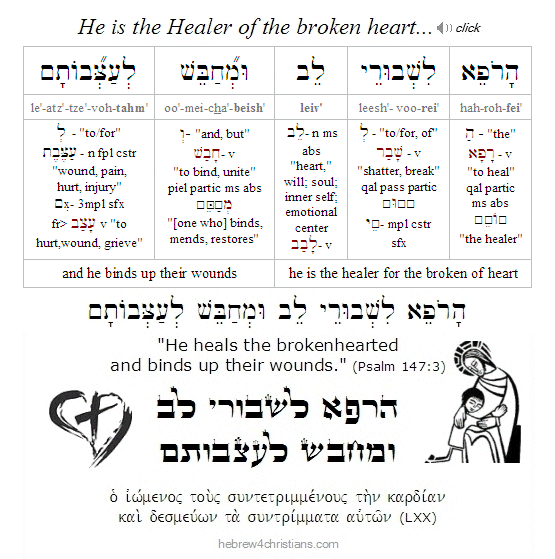 |
Note: I have quoted Henri Nouwen at times on this site, and I have been blessed reading some of his books over the years. Someone recently told me that Henri was a "homosexual Catholic" and I had no business quoting him. I knew he was a Catholic, though I had no idea about his sexual orientation. Here's what I read about this issue: click.
Parashat Eikev - עקב
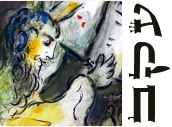
[ The Torah reading for this week is parashat Eikev, which is traditionally read during Shabbat Va'tomer, the second "Sabbath of Consolation" after Tishah B'Av.... ]
08.14.22 (Av 17, 5782) In our Torah reading for this week (i.e., parashat Eikev), Moses continues his farewell address to Israel by saying, "And because (עֵקֶב) you will listen to these rules and keep and do them, the LORD your God will keep with you the covenant and the love that he swore to your fathers" (Deut. 7:12). Note that the word eikev (עֵקֶב), often translated "because," literally means "heel," which recalls Jacob (יעקב) the "heel-holder" who wrestled with the pain of his past to learn to bear the name Israel (יִשְׂרָאֵל), the "prince of God" (Gen. 32:28)... And like Jacob, we must grapple to believe that the covenant of God's love and acceptance is for us, too...
The Sassover rebbe interpreted the opening verse of our Torah portion, "And because you will listen..." (וְהָיָה עֵקֶב תִּשְׁמְעוּן) as, "and it shall be when your heel is ready to take a step, you will listen to your heart." This is the step of faith. As you begin to walk with God, you will come to know yourself as a child of the great King. Likewise regarding the related verse in the Torah, "Because Abraham heard my voice" (עֵקֶב אֲשֶׁר־שָׁמַע אַבְרָהָם בְּקלִי), the sages read, "Abraham heard the word 'down to his heel'" (Gen. 26:5). Like Abraham, we will hear God's voice as we walk with him by faith...
Hebrew Lesson
1 Chron. 22:19a reading (click):
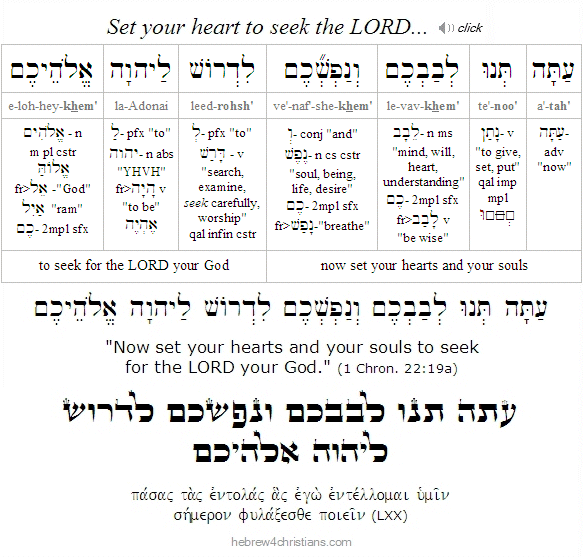 |
The portion begins: "ve'hayah eikev..." (Deut. 7:12). Here translators differ about how to understand the Hebrew. The JPS version, for instance, renders this as "and if you listen," whereas others render it as, "and because you listen..." The former translation makes the blessing seem conditional upon obedience, whereas the latter reading affirms the obedience that leads to blessing... The Hebrew word eikev (i.e., עקב, "heel," "step"), however, refers to action, and therefore it may be regarded as a prophecy expressing faith that the blessing which God swore on oath will be fulfilled. May it be so for us, chaverim...
Hebrew Lesson
Opening words of parashat Eikev (click):
EikevAudio Podcast...

Trust in Difficult Days...
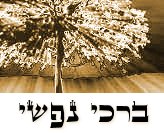
08.12.22 (Av 15, 5782) We are living in times of difficulty leading up to the coming of our Messiah, Yeshua, and therefore we all need courage and grace to persevere. When Andrew Murray was bedridden and sick, he advised another sufferer using these words: "In time of trouble say: "First, He brought me here. It is by His will I am in this straight place; in that I will rest. Next, He will keep me here in His love, and give me grace to behave as His child. Then, He will make the trial a blessing, teaching me the lessons He intends me to learn, and working in me the grace He means to bestow. Last, In His good time He can bring me out again – how and when He knows. [Therefore] let me say I am here, (1) by God's appointment; (2) in his keeping; (3) under His training; and (4) for His time."
Deep within I discover that I can bless the Lord, losing sight of myself and my fears as I affirm my deepest purpose and heritage: "My (boundary) lines have fallen to me in pleasant places; indeed, my inheritance is beautiful to me" (Psalm 16:6). Though I might have felt bereft and even tempted to curse my estate, by God's grace I am made able to give thanks and to bless, even in the midst of my troubles and pain: "I will bless the LORD who has counseled me; my conscience disciplines me in the night" (Psalm 16:7). Therefore שִׁוִּיתִי יְהוָה לְנֶגְדִּי תָמִיד - "I have set the Lord always before me" – especially in desperate moments when I can barely endure – since I have learned that "because he is at my right hand, I shall not come undone" (Psalm 16:8). God gives me strength to renew my hope: therefore "my heart is made glad, my whole being rejoices, and my body rests in trust" (Psalm 16:9). Amen, Shabbat Shalom!
Hebrew Lesson
Psalm 35:9 Hebrew reading (click):
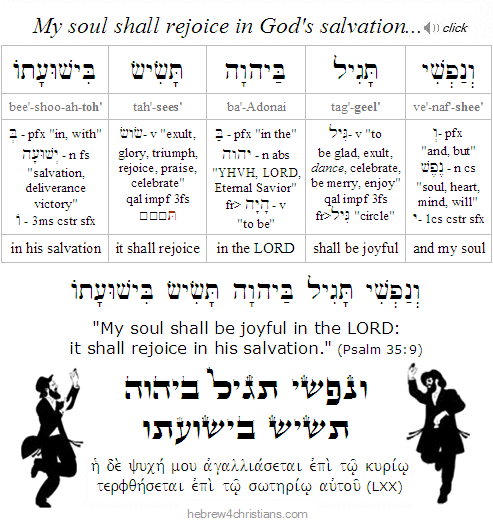 |
The Holiday of Tu B'Av...

08.12.22 (Av 15, 5782) Tu B'Av (ט"ו באב, the "fifteenth [day] of [the month of] Av") is an annual holiday of love and affection (sometimes called chag ha-ahavah: חַג הָאַהֲבָה) that is celebrated as a sort of "Valentine's Day" in modern Israel (though it is a much older holiday that St. Valentine's Day). Just as Yom Kippur (the Day of Atonement) originally celebrated the reconciliation of Israel to the LORD after the sin of the Golden Calf, so Tu B'Av originally celebrated the reconciliation of Israel for the Sin of the Spies. Therefore both the fifteenth of Av and Yom Kippur became joyous times celebrating forgiveness and restoration to the LORD. Indeed, the Babylonian Talmud (Ta'anit 31a) quotes Shimon ben Gamliel as saying, "Israel had no holidays as joyous as the fifteenth of Av and the Day of Atonement, when the maidens of Israel would go out and dance in the vineyards... What were they saying: Young man, consider whom you choose to be your wife..."
Since it marks the "last" festival of the Jewish year, Tu B'Av prophetically pictures our marriage to the Lamb of God (Seh Elohim), Yeshua our beloved Messiah. On a soon-coming day those who belong to him and are faithful to follow his ways will be blessed with the unspeakable joy as their "wedding day" finally has come. This is heaven itself - to be in the Presence of the LORD and to be His beloved (Rev. 19:6-9).
With the advent of the holiday of Tu B'Av, we are reminded of the beautiful phrase, ani l'dodi ve'dodi li (אֲנִי לְדוֹדִי וְדוֹדִי לִי), "I am my beloved's, and my beloved is mine" (Song. 6:3), a phrase the sages say is an acronym for the name Elul (אלול). Since the month of Elul begins in just a couple of weeks (i.e., Friday, August 6th this year), the entire month is set apart to prepare us for the coming High Holidays in early September. During this time it we engage in cheshbon ha-nefesh ("soul searching") and to derive comfort that God is forgiving and loving to those who turn to Him. The sages chose the seven "Haftarot of comfort" to encourage us to make our hearts ready for the upcoming High Holiday Season.
Hebrew Lesson
Song 6:3 reading (click):
Every Prayer Answered...

08.12.22 (Av 15, 5782) If you earnestly pray but are tempted to suspect that God is indifferent to your pleas, remind yourself that every prayer uttered to God from a heart of honest faith, that is, from a heart that trusts in God's redemptive love given in Messiah, is indeed answered, and not a syllable goes unheeded or will be lost before heaven. Just as assuredly we believe that no one will get away with evil -- that justice will eventually be served and all wrongs redressed at the bar of Eternal Judgment -- so we understand that every utterance of the heart of faith finds compassionate response from the heart of heaven. Indeed the essence of teshuvah (return, "repentance") is heartfelt prayer, and therefore when we bring honest words and turn back to accept the truth, God's mercy and compassion are decisively evoked (1 John 1:9). The most important thing is not to lose faith, however, but to believe that God hears you and will indeed answer the cry of your heart. Decide to believe and settle your expectation. Never give up hope. God is faithful; He will do it (1 Thess. 5:24).
King David asked for God's direct and miraculous intervention to heal his soul: "Cause me to me hear your lovingkindness in the morning, for in You do I trust. Cause me to know the way I should go, for I lift up my soul to you" (Psalm 143:8). David's request was that he would be empowered to hear God's loving voice calling to his heart at the start the day, to be assured of God's kindness and favor. Note that the Hebrew verbs used in this verse are both hiphal imperatives, implying that God is the agent or cause of the action. We lift up our heart in expectation, understanding that the LORD alone is the One who is able to draw us near to Him: "You [God] cause me to hear... You [God] cause me to know..."
Hebrew Lesson
Psalm 143:8 Hebrew reading (click):
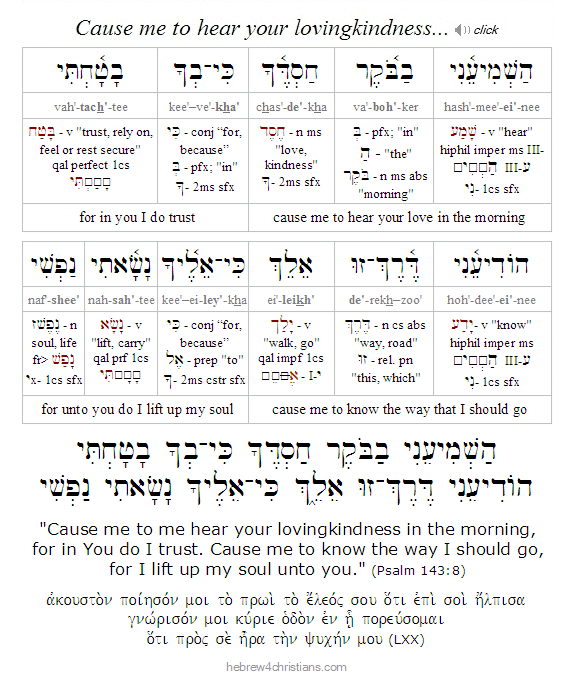 |
The First Commandment...

08.12.22 (Av 15, 5782) Our Torah for this week (Va'etchanan) includes the first part of the Shema (שמע): "Hear, O Israel, the LORD is our God; the LORD is One, and you shall love (וְאָהַבְתָּ) the LORD your God with all your heart and with all your soul and with all your might" (Deut. 6:4-5). During its recitation we pronounce each word very carefully and cover our eyes with our right hand, focusing on the sovereignty of God and our primary need to love Him with our whole being. Yeshua said that the Shema was the "first" commandment of Torah (see Mark 12:28-31). Note that the opening declaration of the Shema includes three Divine Names: Lord (יהוה), God (אלהים), and Lord (יהוה) again, which suggests the multiplicity-in-oneness (unity) that the word "echad" implies (see below). The two letters Ayin (ע) and Dalet (ד) are written enlarged in the opening verse of the Shema. Together, these letters form the word 'ed (עֵד), which means "witness," suggesting that we recite the Shema to testify of the sovereignty of God and our duty to love Him bekhol levavkha, (בּכָל־לְבָבְךָ) with all our being.
שְׁמַע יִשְׂרָאֵל יְהוָה אֱלהֵינוּ יְהוָה אֶחָד
she·ma · Yis·ra·el · Adonai · e·loh·hey'·noo · Adonai · e·chad

"Hear, O Israel, the LORD is our God, the LORD is one LORD."
(Deut. 6:4)

Hebrew Study Card / Shema Reader Page
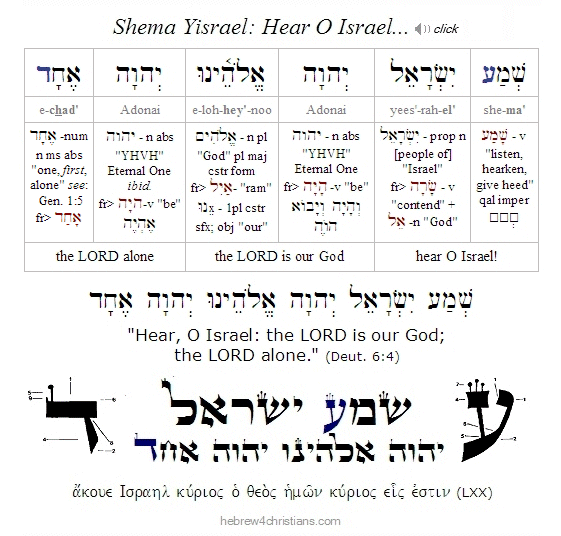
The Shema says "The LORD our God is one LORD" (יְהוָה אֱלהֵינוּ יְהוָה אֶחָד). Interestingly, the word echad (אֶחָד) in Hebrew, translated as "one," implies unity in diversity, not absolute numerical identity (the word for one and only one, i.e., "unique," is yachid (יָחִיד)). For example, in Exodus 26:6 the parts of the Tabernacle (Mishkan) are to be constructed so that "it shall be one (echad) tabernacle," and Ezekiel spoke of two "sticks" (representing fragmented Israel) as being reunited into one: "and they shall be one (echad) stick in My hand" (Ezek. 37:19). Moses also uses echad in Genesis 2:24 when he says: "And they (husband and wife) will become one flesh (basar echad)." God's attributes as Compassionate Source of life, Eternal Judge, and Savior, are unified and affirmed in this verse. Ultimate Reality is multidimensional, personal and loving, and that is part of the very essence of God. There is no such thing as a "Person" - either human or Divine - that exists in an absolute vacuum, outside of relationship. Absolute monism is inconsistent with the idea of Divine Personhood, just as Aristotle's "Unmoved Mover" is a logical absurdity.
Note: For more information about the Shema and its blessings, or to download Shema study pages, please see the Shema section of the site. Shalom.
Comfort and Hope...

08.12.22 (Av 15, 5782) From this week's Torah (i.e., parashat Va'etchanan) we read: "if you seek for the LORD your God from there, you will find him, if you search for him with all your heart (בְּכָל־לְבָבְךָ) and with all your soul" (Deut. 4:29). From where do we search, from what place, except while we are in exile, after hardship, testing, and tribulation? If you seek for the LORD your God from there - in the midst of your exile, in the midst of your heart's cry - you will find him there, in your heart. This message is a prophecy, so that even after testing befalls you, in the end you will belong to the LORD and will hear his voice.
"Where is God to be found?" asks the Kotzker Rebbe, but "in the place where He is given entry!" As the Apostle Paul wrote, "The word is near you, in your mouth and in your heart" (that is, the word of faith that we proclaim); because, if you confess with your mouth that Yeshua is LORD and believe in your heart that God raised him from the dead, you will be saved. For with the heart one believes and is justified, and with the mouth one confesses and is saved. For the Scripture says, "Everyone who believes in Him will not be put to shame." For there is no distinction between Jew and Greek; for the same LORD is LORD of all, bestowing his riches on all who call on him. For "everyone who calls on the name of the LORD will be saved" (Rom. 10:8-13). Even in the face of the tribulations and distresses we may encounter in this world, the lovingkindess (chesed) of the Lord is always present for those who look to Him in trust (Lam. 3:22-23).
Hebrew Lesson:
Lamentations 3:22-23 reading (click):
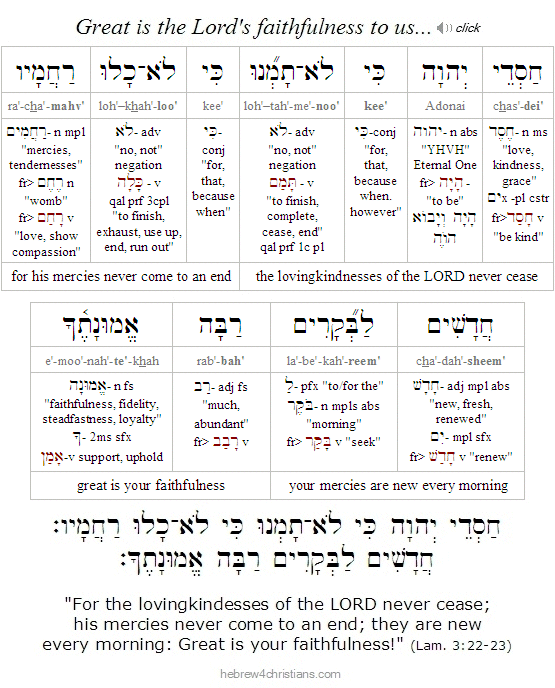 |
The Heart of Heaven...

08.12.22 (Av 15, 5782) In our Torah for this week (Vaetchanan), Moses recalled the awesome revelation of the Torah at Sinai, describing how the mountain "burned with fire unto the heart of heaven" (בּעֵר בָּאֵשׁ עַד־לֵב הַשָּׁמַיִם) when the Ten Commandments were inscribed upon the two tablets of testimony (Deut. 4:11-13). The sages say that the tablets represented a heart, as it says, "write them on the tablet of your heart" (Prov. 3:3), and God's word is likened to a fire that reveals the great passion of God's heart for us (Jer. 23:29; Deut. 4:24). Tragically, the two tablets were smashed after the people lost sight of the heart of heaven (לב שמים), and therefore God requires a broken heart - teshuvah - to behold his glory once again. Therefore we see that Yeshua died of a broken heart upon the cross for our return to God, when the fire of his passion burned unto the very heart of heaven, and in his mesirat ha'nefesh we see the greater glory of God...
Hebrew Lesson
Proverbs 3:3 reading (click):
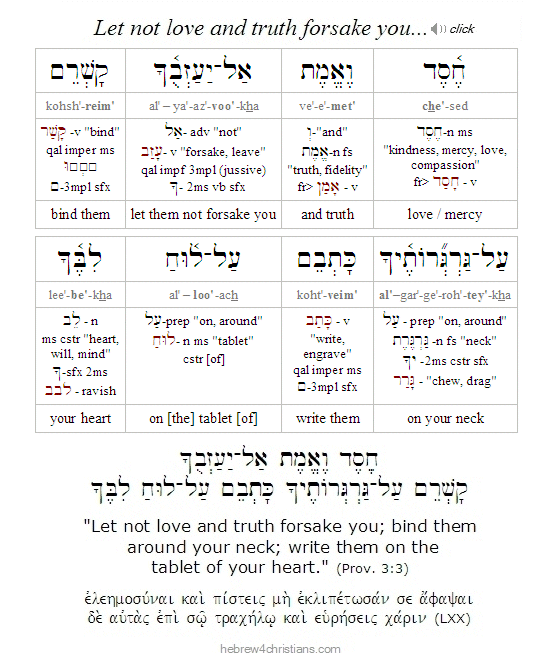 |
Every Soul a Teacher...
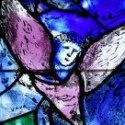
08.11.22 (Av 14, 5782) Every one of us is a teacher of sorts, proclaiming through our personal choices what we believe to be true. False teachers are those whose choices "teach" that there is no God, no eternal life, no meaning to life, and ultimately, no real hope... It cannot be any other way, for we all teach by our choices; we communicate by our assumptions of what we regard is of "ultimate concern." Don't be fooled by the phony intellectuals of our day: so-called "postmodern" philosophy never answered any of the haunting existential questions of life, such as: What is reality? Why is there something rather than nothing? What is the purpose of life? What happens when we die? Who am I? Do moral choices matter? and so on, but instead merely reinterpreted the hunger for meaning to be about power and control... Nonsense! People may evade the great questions of life by pretending they are unknowable, but Scripture attests that all people are created in God's image and are intuitively aware of God's reality and power: "For His invisible attributes, namely, his eternal power and divine nature, have been clearly perceived, ever since the creation of the world, in the things that have been made; so they are without excuse" (Rom. 1:20). We have a sacred duty to honor God's truth and that implies we bear a sacred animosity toward lies and false teaching. "Do not be deceived: associating with false teaching corrupts good character" (1 Cor. 15:33). We abhor sin because it wounds and kills the soul. Think straight; awaken to the holiness of life; turn away from vain thoughts and lies; embrace the truth of God's salvation.
Every day we make decisions regarding good and evil, and therefore every day we are deciding (i.e., proclaiming, teaching, and attesting) our faith to others. The issue is not whether we will teach others, but what we will teach them by the testimony of our lives and the decisions we make regarding our ultimate concerns...
יִרְאַת יְהוָה שְׂנאת רָע
גֵּאָה וְגָאוֹן וְדֶרֶךְ רָע
וּפִי תַהְפֻּכוֹת שָׂנֵאתִי
yeer·at · Adonai · se·noht · rah
gei·ah · ve'·ga·ohn · ve'·de'·rekh · rah
oo'·fee · tah·poo·khot · sah·nei'·tee

"The fear of the LORD is to hate evil -
pride and boasting and the way of evil
and perverted speech I hate."
(Prov. 8:13)
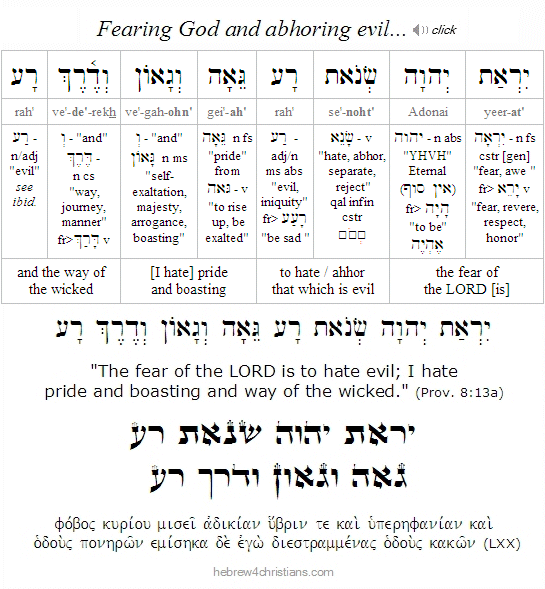 |
Contrary to the philosophy of this fallen world, the essence of love is not spineless tolerance, for tolerating evil is a form of hating what is good... Followers of Yeshua must love the truth and abhor the lie. Tolerating sin in a world ripe for judgment is a tacit form of "collaboration" with the enemy... Indeed, the only thing regarded as intolerable in the devil's world is the objection that people have a supposed "liberty" to sin. But the LORD is clear on this point: "Woe to those who call evil good and good evil, who put darkness for light and light for darkness, who put bitter for sweet and sweet for bitter! Woe to those who are wise in their own eyes and who flatter themseves as understanding" (Isa. 5:20-21). Therefore we are enjoined: "O you who love the LORD, hate evil" (Psalm 97:10). Yes, hate what is evil and love what is good (Amos 5:15). The connection between loving God and hating evil is repeated in the New Testament: "Let your love be genuine (ἀνυπόκριτος, without a "mask" put on): abhor what is evil; cling to what is good (Rom. 12:9). If we truly love the LORD, let us walk in the awe of His great Name by hating what is evil.
Hebrew Lesson
Isaiah 5:20a reading (click):
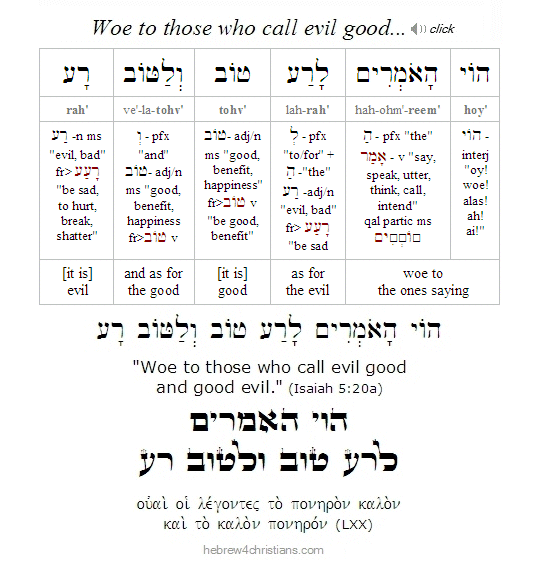 |
The so-called "elite" of this world wage their war by systematically redefining everything in terms that invert common historical usage. They call good evil and evil good. They've no linguistic warrant for doing this except for their "will to power" that justifies deception.
Hebrew Lesson
Job 17:12 reading (click):
Tyranny and God's Judgment...
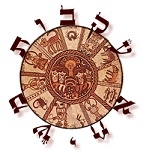
[ "If God does not judge America, he owes Sodom and Gommorah an apology..." ]
08.11.22 (Av 14, 5782) "Hear, O heavens, and give ear, O earth: for the LORD hath spoken, I have nourished and brought up children, and they have rebelled against me. The ox knows its owner, and the donkey its master's crib, but Israel does not know, my people do not understand." Ah sinful nation, a people laden with iniquity, a seed of evildoers, children that are corrupters: they have forsaken the LORD, they have provoked the Holy One of Israel unto anger, they are gone away backward. Why should ye be stricken any more? you will revolt more and more: the whole head is sick, and the whole heart faint. From the sole of the foot even unto the head there is no soundness in it; but wounds, and bruises, and putrifying sores: they have not been closed, neither bound up, neither mollified with ointment. Your country is desolate, your cities are burned with fire: your land, strangers devour it in your presence, and it is desolate, as overthrown by strangers" (Isa. 1:2-7).
"Freedom is never more than one generation away from extinction" - and now we are here.... Godlessness, anarchy, and treachery rule the day; every one does what is "right" in their own eyes continually (Gen. 6:5). Consequently people no longer are capable of thinking clearly: God has given their minds over to madness and derangement (Rom. 1:28). Since engineered lawlessness and depravity are so widespread, America has fallen into tyranny. There is no political remedy, either from the left or the right... Justice has fallen and our culture is reaping the whirlwind. For the ungodly who despise moral authority and truth, devastating judgment awaits: the righteousness of the LORD will be vindicated. As for the remnant that still believes, only the LORD can protect us now... May God show his mercy. כָּל־רֹאשׁ לָחֳלִי וְכָל־לֵבָב דַּוָּי - "The whole head is sick, and the whole heart faint" (Isa. 1:5).
Hebrew Lesson
2 Chron. 20:12b reading (click):
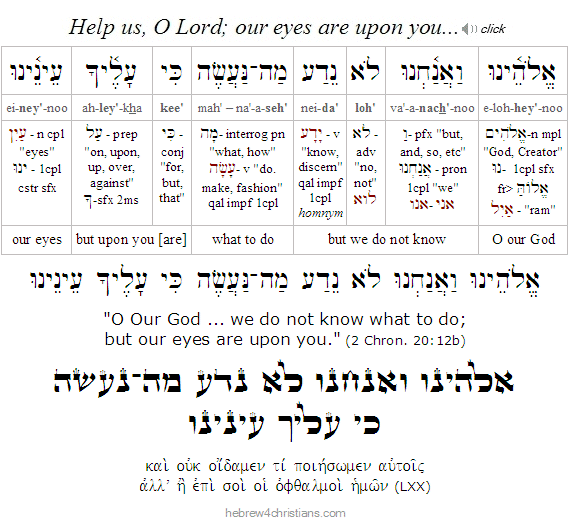 |
The Works of God...

08.11.22 (Av 14, 5782) Yeshua somberly warned those who professed faith: "Not everyone who says to me, 'Lord, Lord,' will enter the kingdom of heaven, but the one who does the will of my Father who is in heaven. On that day many will say to me, 'Lord, Lord, did we not prophesy in your name, and cast out demons in your name, and do many mighty works in your name?' And then will I declare to them, 'I never knew you; depart from me, you workers of lawlessness'" (Matt. 7:21-23). Despite the practice and profession of their faith, these people were strangers to God... They had a false sense of assurance, believing that they were "serving God" while they really were not... So the essential question here is whether Yeshua truly knows you. You may know a lot about God, religion, spirituality, and yet you may remain unknown by him... So where do you find life? What are you loving? Where are you going?
"Not everyone who says to me, 'Lord, Lord,' will enter the kingdom of heaven, but the one who does the will of my Father who is in heaven" (Matt. 7:21). Yet what is the will of the Father but to trust in Messiah for life (John 6:40)? "What must we do, to be doing the works of God?" Yeshua answers: "This is the work of God, that you believe in the One whom he has sent" (John 6:28-29). The Torah of God centers on trusting the Messiah (Titus 3:5-7).
On that day many will say to me, 'Lord, Lord, did we not ... do many mighty works in your name?' And then will I say to them, 'I never knew you; depart from me, you workers of lawlessness' (Matt. 7:22-23). From this we see that good works - even those done in the name of Messiah - are insufficient for life, and that something more is needed... That "something more" is the reality of relationship with him. However, even Yeshua's sacrifice on the cross can't bring you into relationship with him apart from receiving it for your healing... By faith you encounter Yeshua clothed in your flesh, your sin, and suffering death for you. "As long as Christ remains outside of us we are separated from him."
Some people feel frightened when they consider all this, but fear arises only if we miss Yeshua's point... Good works can't save you, even those performed in the Savior's name... What saves you is trusting in God's great love for your life: "This is the work of God, to trust in the One whom God has sent [for you]" (John 6:28-29). Genuine salvation is "from the LORD," that is, comes as a result of his loving intervention on your behalf (Titus 3:5-7; Eph. 2:8-10). This is the will of the Father, the true Torah of the LORD, namely, to honor the Messiah and know him by faith... You trust him for eternal life, you believe that he bears your sins, you seek to know his heart, and you desire to share your life with him. It is lawlessness to reject the Torah of the LORD that commands us to follow Messiah and know him in all our ways - including the ways of our struggles, our fears, and so on... Each of us must wrestle alone, in the dark places of fear, to find our new name from God (Gen. 32:24). Is the blessing for you or not? The essential thing is to know (and more importantly) to be known by Yeshua.... It is a matter of trust, of sharing your heart, being real with him, walking with him, loving him... "This is the work of God, to trust in the One whom God has sent [for you]." Trusting in the Lord means accepting that you are truly loved (and made safe) because of who God is...
The gospel is "the power of God for salvation to everyone who believes, to the Jew first and also to the Greek" (Rom. 1:16). It is a miracle of being in a right relationship with God. We are pursued by his love, and he haunts us until we surrender to his will... Like Jonah we first must be "swallowed up" in consciousness of our own rebellion before we realize we are undone, that we are without remedy apart from God's intervention and deliverance. We start there - in the "belly of the fish" - and later are resurrected to go forth by God's mercy and grace. As we look to Yeshua, as we lean on him, he reveals more of himself to us. He gives us the grace and strength we need; he is always enough...
Whether Yeshua is living in you (and you are living in Him) is the most important question of your life upon which everything else turns. The great mystery is "Christ in you, the hope of glory" (Col. 1:27). As Ravenhill once said, "I don't ask people if they're saved anymore; I look them straight in the eye and say, "Does Christ live inside you?" Indeed, He is present right now -- for you -- in this very moment... Are you connected with Him in the truth? Are you drawing life from His life? Do you really live in Yeshua? "God is making his appeal through us. We implore you on behalf of Messiah, be reconciled to God" (2 Cor. 5:20).
Hebrew Lesson
Isa. 43:11 Hebrew reading (click):
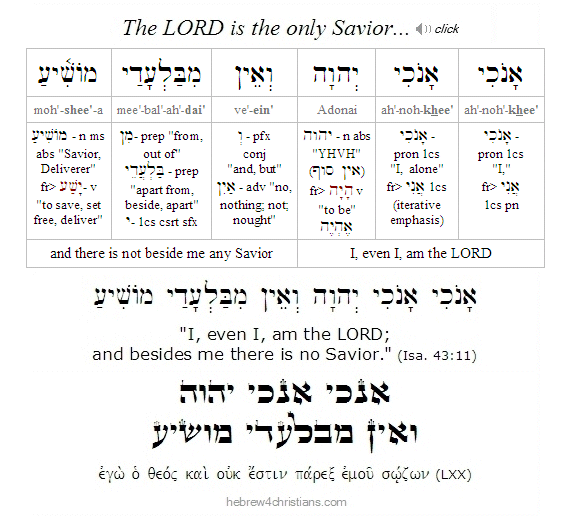 |
Insiders and Outsiders...
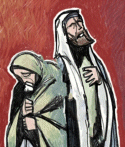
"And would not suffer that any man should carry any vessel through the Temple" (Mark 11:16).
08.10.22 (Av 13, 5782) The parable of the Pharisee and the Tax Collector is a well-known teaching of Yeshua. Two people go to the Temple to pray, one a devout Pharisee, and the other a despised tax collector. The Pharisee thanked God that he was not like other men (on account of his religious devotion), whereas the tax collector lamented that he was a sinner and simply appealed to God for mercy. The surprising "twist" to the story, however, is that the tax collector was justified in the eyes of heaven, and not the Pharisee (Luke 18:10-24).
Most people assume Yeshua told this story to teach how pride can deceive the heart, and that humility is essential to be rightly related to God, and while this application may be rightly inferred from the parable, it is important to understand that the Pharisee only did what was expected of him regarding his religious obligations at the time. Indeed, the Pharisees (i.e., perushim: פְּרוּשִׁים) were Torah scholars who sought to obey Moses' teaching wholeheartedly, as did the Apostle Paul (Acts 22:3). When the Pharisee of the story thanked God for not being like other men, such as thieves, adulterers, or "even like this tax collector," he was not necessarily being prideful but "honest," at least in terms of his devotion for the law: "I fast twice a week; I give a tenth of all my income," the former statement exceeding the law's demand, and the later in full compliance. In fact, this rabbi's speech was typical of pious blessings recorded from the same period of Jewish history.
The tax collector, on the other hand, was an "outsider" to the religious establishment and therefore he stood "afar off" as he made pathetic appeal to God for mercy. His prayer was an unvarnished and heartsore cry to heaven for help. The surprise ending of the story, and what likely unsettled the audience of Yeshua's day, was that the tax collector "went down to his home justified" while the Pharisee did not. In the eyes of heaven, the tax collector was the real "insider" whereas the Pharisee stood "afar off," an outsider to God's heart...
But what's the moral of the story? First, of course, is the straightforward lesson regarding the virtue of humility - that is, the importance of knowing "in your kishkas" how much you need God, and therefore abandoning religious traditions (and the praises of men) in heartfelt contrition, looking instead to God for righteousness. But second, Yeshua is teaching that the kingdom of God has come and is no longer to be found in the confines of the Temple. Knowing the Divine Presence and walking in holiness is no longer the domain of religion but is a matter of the heart of the individual who trusts in God's mercy to deliver him from the guilt of his sin. Holiness, or the realm of the sacred, has transcended the confines of the Temple because the one who expresses the heart of the Divine Presence has come to seek and to save the lost. Yeshua was sacrificed "outside the camp," the curtain of the Temple was torn asunder, so that whosoever will believe in God's mercy in Yeshua will be saved.
Hebrew Lesson
Micah 6:8 reading (click):
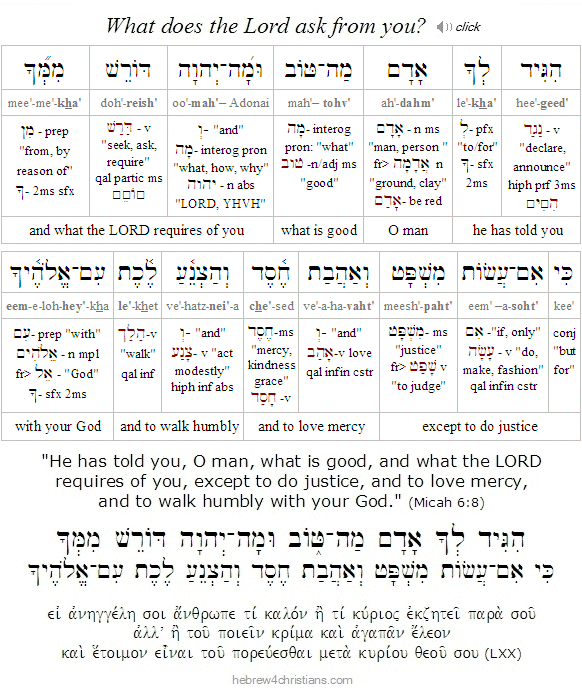 |
It is tragic that some pastors can preach about the pride and self-righteousness of the Pharisees, while turning a blind eye to their own preferred interpretations that are often held at the expense of brotherly love and unity among believers... For instance, some pastors will teach about how Jesus loves people and then turn around and condemn (i.e., ostracize) individuals and churches that differ with them regarding matters of "mint and cummin" in the realm of the Spirit. The "weightier matters" of the law, chaverim - the very heart of the Father for the lost - should be our guiding principle, even when we do theology, and perhaps *especially* when we do so. Shalom.
The Listening Heart...
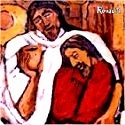
08.10.22 (Av 13, 5782) Being a disciple of Yeshua is to be bonded to his heart: He is our Teacher and his curriculum is the way of our lives... The danger we face is losing sight of his living truth by attending to other matters. For instance, we can substitute our heart connection with him by focusing on "lesser matters of the law" (Matt. 23:23), i.e., by being "religious," or we can fool ourselves by presuming that the law "has come to an end" in order to justify our sins (Matt. 5:17-18). Either way, however, whether we be Torah observant "legalists" or lawless "antinomialists," we disregard what Yeshua wants from us.
It is God's Spirit and truth that enable us to have an intimate heart connection with the Living God (אֱלֹהִים חַי). This connection is grounded, first of all, in the confession of our great need for God's healing and love, and secondly, in our gratitude (faith) for God's Presence in our lives. "If we walk in the light, as He is in the light, we have fellowship with one another" (1 John 1:7). It is the truth of Yeshua that sets us free, and the gift of the freedom that God gives us is to learn to walk with Him and to know him in all our ways (Prov. 3:6).
Hebrew Lesson
Prov. 3:6 Hebrew reading:
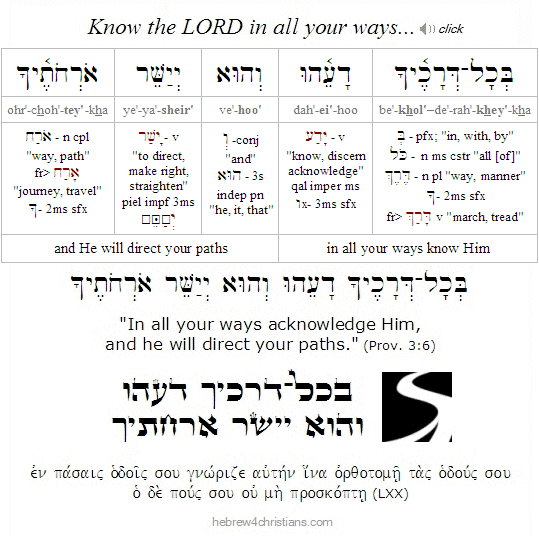 |
Struggles and Faith...

[ "When you sigh and groan over your unfulfilled yearning for holiness, it causes you to be attached to the ruach of holiness. Sighing is drawing breath – which is life itself." (Nachman) ]
08.09.22 (Av 12, 5782) Do you sometimes have trouble trusting God? Do you wrestle with fear, anxiety, or worry? Does an inexplicable dread or sense of hopelessness sometimes oppress you? Do you secretly wonder what's wrong with you - and whether you are truly saved, after all? Please hang on. Doubting and questioning are often a part of the journey of faith, and we don't have to be afraid of our questions, concerns, and difficulties... Being full of "certainty" is not the same as being full of faith, after all, since many sincere people are sincerely self-deceived, while many others experience fear, loneliness, and trouble as a result of their faith. There is so much we simply do not know, and it is dishonest to pretend otherwise. God knows your heart and its struggles; he knows all your secret fears. Thankfully, there is a special prayer included in the holy Scriptures for those times when we feel especially unsteady or insecure: "Lord, I believe, help thou my unbelief..." (Mark 9:24). Here we may bring our (lack of) faith to God for healing....
We should not be scandalized that we sometimes struggle with our faith. After all, Yeshua constantly questioned his disciples: "Do you now believe?" (John 16:31). And that's why we are commanded to "put off" the old nature and to "put on" the new nature -- because God knows we are fickle admixtures, contradictions, carnal-yet-spiritual, inwardly divided souls that need to learn to trust in the miracle of God with all our hearts....
Of course it's easy to believe when things are going well, when faith "makes sense" or provides you with a sense of community, etc., but when things are difficult, when there are disappointments, pain, grief, losses, etc., then you need to trust in the unseen good, the "hidden hand" of God's love, despite the trouble of your present circumstances. This is part of faith's journey: leaning on God's care, despite the "valley of the shadow of death," despite the tests... The way may sometimes be difficult, but "the tested genuineness of your faith -- more precious than gold that perishes though it is tested by fire -- will be found to result in praise and glory and honor at the revelation of Yeshua the Messiah" (1 Pet. 1:7).
Hebrew Lesson
Psalm 119:19 Hebrew reading:
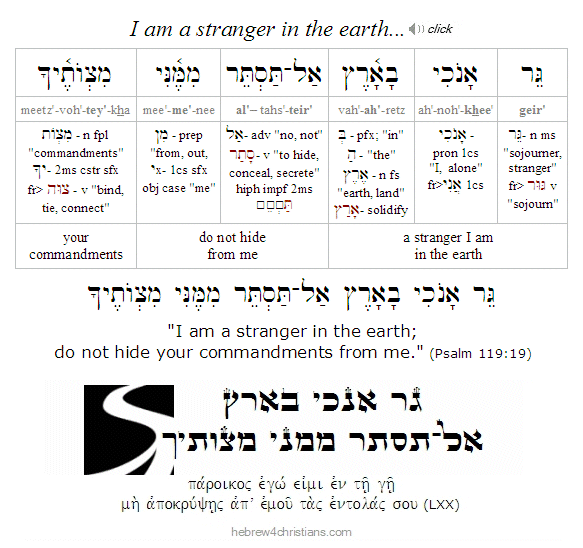 |
Mitzvah of Connection...

[ "Prayer is the root of all attachment and devotion to God. Prayer is the gate through which we approach God, and through prayer we may come to know Him." - Likutey Moharan II, 84 ]
08.09.22 (Av 12, 5782) The Hebrew word "mitzvah" (מִצְוָה) is often translated as "commandment," though its basic idea is about connection to God (i.e., the root צוה means to bind or unite). Being connected with the Almighty means talking with him, relating to him as your heavenly Father, and trusting that he esteems you as his beloved child. Whatever else you may think about the commandments of God, this idea of a love connection is foundational and essential. The very first of the Ten Commandments is anochi Adonai Elohekha, "I am the Lord your God" (אנכי יהוה אלהיך) which summons your heart to receive the touch of the Spirit of God. There is no love like that of the Lord, but you can't feel that love if you don't speak to Him, pouring out your heart and clinging to the truth of his love for you....
Hebrew Lesson
Psalm 62:8 Hebrew reading:
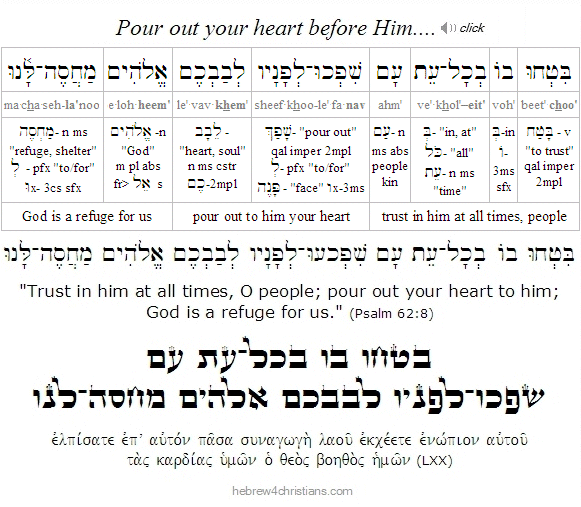 |
Privately pouring out your heart to God in an honest, transparent, and earnest way is sometimes called hitbodedut (הִתְבּוֹדְדוּת), a word that means "solitude." As we unburden our souls before the Lord, made empty so that can begin to truly listen, as it says, "In returning and rest you shall be saved; in quietness and in trust shall be your strength" (Isa. 30:15). Only after we sigh deeply and surrender are we receptive to the voice of the Spirit's whisper. "Blessed are all those who wait for Him" - אַשְׁרֵי כָּל־חוֹכֵי לוֹ (Isa. 30:18). We wait, we abide, even when God takes his time or does not immediately intervene. We do not lose heart, for we find strength when we trust in God's love... No prayer uttered to the one true God in the passion of truth will ever go unanswered. The Light of the world still shines: Yeshua, be my inner word, my heart, and my groaning for life today, and forevermore, amen.
Since the essence of Torah is connection to God, the greatest blessing is to be filled with a steadfast desire to draw close to him, to experience hunger and thirst (visceral yearning) for God's presence and touch. Holy desire – expressed in the yearning of heartfelt prayer – is therefore a state of true blessedness, and the more desperate our need for God the more blessed we are. It is our desire, our holy need, that creates a bond between our soul and its Creator, and that is the deeper meaning of mitzvah... "Blessed are those who hunger and thirst for righteousness, for they shall be satisfied" (Matt. 5:6).
 |
Return to your heart...
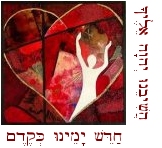
08.08.22 (Av 11, 5782) The condition of this evil world says absolutely nothing to us regarding the veracity of the life of faith... Our duty is to live before the Divine Presence at all times -- regardless of whatever our circumstances. "In relationship to God one can not involve himself 'to a certain degree.' God is precisely the contradiction to all that is 'to a certain degree'" (Kierkegaard). A believer must be contemporary with Christ's presence on earth, since the Eternal entered historical time to offer a timeless relationship with all who would believe. Our Lord touches us because He connects with our hearts in the present hour...
So what do you truly believe? What do you love? How do you "relate" to life? For those who trust in the Presence of God in Yeshua, nothing "happens" randomly or at a distance from our Heavenly Father's care... We do not know Yeshua as some hoary figure of the past, nor as a remote hope of the heart, but in the blood and guts of our daily struggle -- in the midst of our connection with him as we journey in faith. God's love is not a secondhand gift... Yeshua asks each of us: 'Who do you say that I am?' (Mark 8:29) and awaits for us to "show up" in our faith to reach out to Him.
From our Torah portion this week (i.e., Vaetchanan) we read, "Know therefore today and return to your heart (והשׁבת אל־לבבך), for the LORD is God in heaven above and on the earth beneath; there is no other" (Deut. 4:39). Here again we see the centrality of the heart as the mode to encounter God (Luke 17:21). Savor the phrase, "Know therefore today and return to your heart..." It the heart that is the place of connection with God... As Yeshua said, "Behold, I stand at the door and knock. If anyone hears my voice and opens the door, I will come in to him and eat with him, and he with me" (Rev. 3:20). Today is the day to "return to your heart" and receive again God's love for your soul...
Hebrew Lesson
Deut 4:39 Hebrew reading (click):
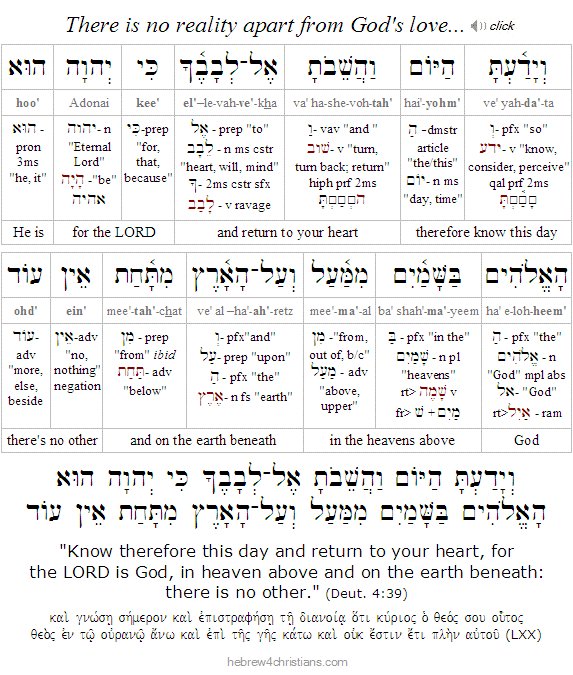 |
Praying to Pray...

[ "It is unbelievable what a person of prayer can achieve if he would but close the doors behind him." - Soren Kierkegaard ]
08.08.22 (Av 11, 5782) Our Torah portion for this week (i.e., Vaetchanan) begins, "And I pleaded (ואתחנן) with the LORD at that time, to say..." (Deut. 3:23), which implies that we must first pray in order to be able to pray, that is, we make ourselves ready to pray by finding the inner freedom and grace to groan before the LORD.... If you can't find the words to pray, or if you seem unwilling, then plead with the LORD and ask for the Holy Spirit to groan on your behalf (Rom. 8:26). Weep in order to weep; sigh in order to sigh; praise in order to praise. "Ask, and it will be given to you; seek, and you will find; knock, and it will be opened to you" (Matt. 7:7). Amen: "O Lord, open my lips, and my mouth will show forth your praise" (Psalm 51:15).
The need to pray with the proper focus, intention, and heart is surely one of our greatest needs... "Lord, teach us to pray" (Luke 11:1). The disciples were not asking for a formula or recipe prayer (such as might be recited from a prayer book), but for the right motivation, direction, and "Torah" of prayer... If we ask according to his will, God hears us (1 John 5:14), since we are speaking heaven's "language" of truth and humility. Therefore pray for the ability to pray earnestly, to commune in trust with your heavenly Father. The prayer of a righteous person has great power (James 5:16).
אדני שׂפתי תפתח
ופי יגיד תהלתך
Adonai · se·fah·tai · teef·tach
oo·fee · ya·geed · te·heel·lah·te'·kha

"O Lord, open my lips,
and my mouth will declare your praise."
(Psalm 51:15)

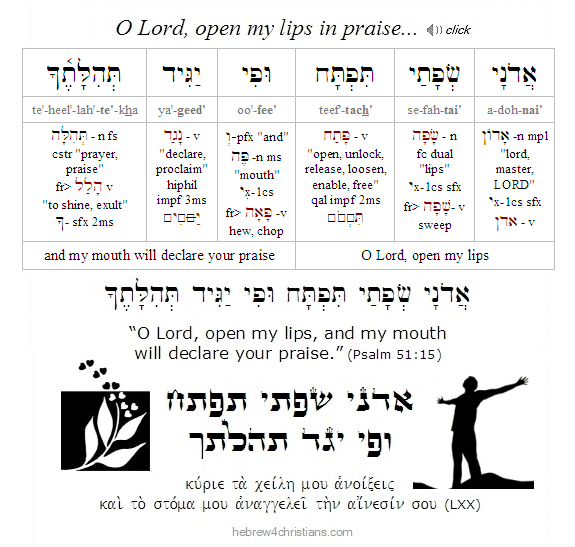
Cleaving to God...
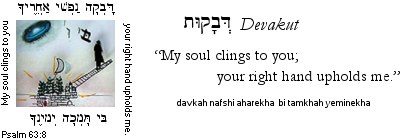
[ The following concerns this week's Torah reading, parashat Vaetchanan, which is always read on the Sabbath following Tishah B'Av... Nachamu, nachamu... ]
08.08.22 (Av 11, 5782) Our Torah portion this week says: "But you who have cleaved to the LORD your God are all alive today" (Deut. 4:4). The Hebrew word devakut (דְּבָקוּת) means "cleaving" and refers to communion with God. This word comes from the root word davak (דָּבַק), meaning to "cling" or "stick" (the Modern Hebrew word for "glue" is devek (דֶבֶק) which also comes from the same root). The sages comment that we can cleave to God only one day at a time. As Yeshua said: "Take therefore no thought for tomorrow: for tomorrow shall take thought for the things of itself. Sufficient for the day its own trouble" (Matt. 6:34). One day at a time. The LORD gives us daily bread (לֶחֶם חֻקֵּנוּ) so that we may persevere for this day. "For he is our God, and we are the people of his pasture and the sheep of his hand today -- if you hear his voice" (Psalm 95:7). Today, if you hear his voice, do not harden your heart (Heb. 3:15). "Take care, brothers, lest there be in any of you an evil, unbelieving heart, leading you to fall away from the living God, but encourage one another every day, as long as it is called "today," so that none of you may be hardened by the deceitfulness of sin" (Heb. 3:12-13).
Hebrew Lesson
Deut. 4:4 Hebrew reading (click):
Shavuah Tov Podcast:
Parashat Vaetchanan...

08.07.22 (Av 10, 5782) Shavuah tov, chaverim. Our Torah reading for this week (i.e., Vaetchanan) is always read on the Sabbath that immediately follows the somber holiday of Tishah B'Av (תשעה באב). In Jewish tradition, this special Sabbath is called "Shabbat Nachamu" (שַׁבַּת נַחֲמו), "the Sabbath of Comfort" and the assigned the prophetic portion is from the Book of Isaiah that begins with the famous phrase: נַחֲמוּ נַחֲמוּ עַמִּי - Nachamu, Nachamu ami - "Comfort, O comfort, my people..." (Isa. 40:1). With the advent of this special Sabbath, we have just seven weeks to prepare for the new year (i.e, Yom Teruah or "Rosh Hashanah") and the High Holidays - a "jubilee" season that heralds the return of Yeshua.
Hebrew Lesson
Isaiah 40:1 Hebrew reading (click):
Va'etchanan: Moses' Plea...

[ Our Torah reading for this week, parashat Vaetchanan, is always read on the Sabbath immediately following Tishah B'Av, called Shabbat Nachamu, or "the Sabbath of Comfort." ]
08.07.22 (Av 10, 5782) This week we will study parashat Vaetchanan (פרשת ואתחנן), a rich Torah portion that includes some of the most foundational texts of the Jewish Scriptures, including the Ten Commandments, the Shema (the duty to love God and study His Torah), as well as the commandments of tefillin and mezuzot. In addition, in this portion Moses predicted the worldwide exile and the eventual redemption of the Jewish people in acharit hayamim (the prophesied "End of Days").
The Torah portion begins with Moses' plea to the LORD to be allowed entry into the Promised Land, despite God's earlier decree (see Num. 20:8-12; 27:12-14). The Hebrew word va'etchanan (וָאֶתְחַנַּן) comes from the verb chanan (חָנַן), which means to beseech or implore. It derives from the noun chen (חֵן), grace, implying that the supplication appeals to God's favor, not to any idea of personal merit (in Jewish tradition, tachanun (תַּחֲנוּן) are prayers recited after the Amidah begging for God's grace and mercy). Moses was asking God to show him grace by reversing the decree that forbade him to enter the Promised Land.
Hebrew Lesson
Deut:3:23 Hebrew reading (click):
In addition to our Torah readings, on the 15th day of the month of Av we observe chag ha-ahavah (חַג הָאַהֲבָה), or "the holiday of love." Since it marks the "last" festival of the Jewish year, prophetically the 15th of Av (called Tu B'Av) pictures our marriage to the Lamb of God (Seh Elohim), the LORD Yeshua our beloved Messiah. On a soon-coming day those who belong to the LORD and are faithful to follow His ways will be blessed with the unspeakable joy of an eternally intimate relationship with Him. This is heaven itself - to be in the Presence of the LORD and to be regarded as His beloved (Rev. 19:6-9). Maranatha.
Daily Perush Podcast:
God's Glory and Tishah B'Av...
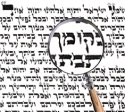
08.06.22 (Av 9, 5782) Shalom chaverim. In this "Daily perush broadcast" (see link below) I provide a quick exegesis and reading of a significant phrase in King Solomon's prayer at the dedication of the First Temple, namely, "Behold heaven and the heaven of heavens cannot contain you" (2 Chron. 6:18b), and then reflect on the meaning of these words in relation to the destruction of the Temple in Jerusalem.
Hebrew Lesson
2 Chron. 6:18b reading (click):
Following Yeshua...

08.05.22 (Av 8, 5782) When Yeshua says "follow me," he doesn't mince words or ask for the impossible; neither does he seek "admirers" or the celebrity of mere men. To follow Yeshua means to walk along the same road he did, not in the physical sense, of course, but in the way or "how" of the road... To "walk as he walked" means your life will share his heart, vision, and spirit as much as is possible in your present circumstances. The life of the Teacher is the road; his heart voices the spirit that calls the disciple ahead; he prepares a place for you in the communion of his love. May the Lord help you to press on toward the goal of the upward call in Yeshua the Messiah (Phil. 3:14). Amen.
"What dreadful untruth it is to admire in relation to the truth instead of following it... When there is no danger, when there is dead calm, when everything is favorable to Christianity, it is all to easy to confuse an admirer with a follower, and this can happen very quietly; the admirer can die in the delusion that the position he took was the true one. Give heed, therefore, to the contemporaneity of Christ." - Soren Kierkegaard (Practice in Christianity).
Hebrew Lesson:
Psalm 141:8 reading (click):
The Tishah B'Av Prophecies...
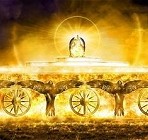
08.05.22 (Av 8, 5782) Yeshua foretold the destruction of the Second Temple when he lamented: "O Jerusalem, Jerusalem, the city that kills the prophets and stones those who are sent to it! How often would I have gathered your children together as a hen gathers her brood under her wings, and you were not willing! Behold, your house is left unto you desolate. For I tell you, you will not see me again, until you say, Barukh Haba Ba'shem Adonai: 'Blessed is he who comes in the name of the Lord.' Yeshua then left the Temple and was going away, when his disciples came to point out to him the buildings of the Temple. But he answered them, "You see all these, do you not? Truly, I say to you, there will not be left here one stone upon another that will not be thrown down." (Matt. 23:37-24:2). Note well that we are not awaiting the construction of the "Third Temple" which will be hastily erected during the time of Jacob's Trouble during the Great Tribulation, but we await the "Fourth Temple," that is, the Temple that will be built by Tzemach Tzaddik (צֶמַח צַדִּיק), namely, the Messiah the Son of David (מָשִׁיחַ בֶּן־דָוִד) who will come again to establish the Kingdom of Zion upon the earth in fulfillment of the promises of God (Zech. 6:12; Jer. 23:5). At that glorious time the mourning of the Jewish people will forgotten, as it is written: "Thus says Adonai Tzeva'ot (יהוה צְבָאוֹת): The fast of the fourth month (Tammuz), and the fast of the fifth month (Tishah B'Av), and the fast of the seventh month (Gedaliah), and the fast of the tenth month (Asarah b'Tevet), will be to the house of Judah for joy and rejoicing and for pleasant appointed seasons. Therefore love truth and peace" (Zech. 8:19). In that coming day, "The LORD will be king over all the earth. On that day the LORD will be one and his name one."
וְהָיָה יְהוָה לְמֶלֶךְ עַל־כָּל־הָאָרֶץ
בַּיּוֹם הַהוּא יִהְיֶה יְהוָה אֶחָד וּשְׁמוֹ אֶחָד
ve·hah·yah · Adonai · le·me'·lekh · al-kohl-hah·ah'·retz
bai·yohm · ha·hoo · yee·he·yeh · Adonai · e·chad · oo·she·moh · e·chad

"And the LORD will be king over all the earth.
On that day the LORD will be one and his name one."
(Zech. 14:9)

Click to listen and learn the Hebrew text:
As I've mentioned repeatedly over the years, the word "Zion" (i.e., tziyon: צִיּוֹן) is mentioned over 160 times in the Scriptures. That's more than the words faith, hope, love, and countless others... And since Zion is a poetic form of the word Jerusalem, the number of occurrences swells to nearly 1,000! It is therefore not an overstatement to say that God Himself is a Zionist.... "Out of Zion, the perfection of beauty, God shines forth" (Psalm 50:2). Zion represents the rule and reign of God in the earth and is therefore synonymous with the Kingdom of God. The entire redemptive plan of God -- including the coming of the Messiah Himself and our very salvation -- is wrapped up in the concept of Zion. It is the "historiography" of God -- His "philosophy of history," if you will.
In a sense, the great vision of Zion is the heart of the Gospel message and the focal point of God's salvation in this world. Zion represents our eschatological future -- our home in olam haba (the world to come). Even the new heavens and earth will be called Jerusalem -- "Zion in her perfection" (Rev. 21). "This is what Adonai Tzeva'ot says: I am very jealous for Jerusalem and Zion, but I am very angry with the nations that feel secure" (Zech. 1:14-15). "For Zion's sake I will not keep silent, for Jerusalem's sake I will not remain quiet, till her righteousness shines out like the dawn, her salvation like a blazing torch" (Isa 62:1). "The builder of Jerusalem is God, the outcasts of Israel he will gather in... Praise God, O Jerusalem, laud your God, O Zion" (Psalm 147:2-12).
It is worth noting that in the discussion from the Talmud, the 6,000 years of human history are divided into three epochs of 2,000 years each. The period of "tohu" occurred from the time of the fall of Adam until the call of Abraham; the period of "Torah" occurred from Abraham until the time of the destruction of the Second Temple, and the period of the "Messiah" refers to the time when the Messiah could appear before the Kingdom is established in Zion. The time immediately preceding the appearance of the Messiah will be a time of testing in which the world will undergo various forms of tribulation, called chevlei Mashiach (חֶבְלֵי הַמָּשִׁיחַ) - the "birth pangs of the Messiah" (Sanhedrin 98a; Ketubot, Bereshit Rabbah 42:4, Matt. 24:8). Some say the birth pangs are to last for 70 years, with the last 7 years being the most intense period of tribulation -- called the "Time of Jacob's Trouble" / עֵת־צָרָה הִיא לְיַעֲקב (Jer. 30:7). The climax of the "Great Tribulation" (צָרָה גְדוֹלָה) is called the great "Day of the LORD" (יוֹם־יהוה הַגָּדוֹל) which represents God's wrath poured out upon a rebellious world system. On this fateful day, the LORD will terribly shake the entire earth (Isa. 2:19) and worldwide catastrophes will occur. "For the great day of their wrath has come, and who can stand?" (Rev. 6:17). The prophet Malachi likewise says: "'Surely the day is coming; it will burn like a furnace. All the arrogant and every evildoer will be stubble, and that day that is coming will set them on fire,' says the LORD Almighty. 'Not a root or a branch will be left to them'" (Mal. 4:1). Only after the nations of the world have been judged will the Messianic kingdom (מַלְכוּת הָאֱלהִים) be established upon the earth. The remnant of Israel will be saved and the 1000 year reign of King Messiah will then commence (Rev. 20:4).
 |
The concept of the King Messiah, the "Anointed One" who would one day come to deliver his people from oppression at the beginning of an era of world peace has been the sustaining hope of the Jewish people for generations. King Messiah is the instrument by whom God's kingdom is to be established in Israel and in the world. This hope runs throughout the entire Tanakh. According to rabbinical Judaism (following Maimonides), this Messiah figure is not divine, though he certainly has divine powers and attributes. Indeed, he functions as Israel's Savior who would be empowered by God to:
- Restore the Kingdom of David (Jer. 23:5, Jer 30:9, Ezek. 34:23)
- Restore the Temple in Zion (Isa. 2:2, Micah 4:1, Zech. 6:13, Ezek. 37:26-28)
- Regather the exiles (Isa. 11:12, 43:5-6, 51:11)
- Offer the New Covenant to Israel (Jer. 31:31-34)
- Usher in world peace and the knowledge of the true God (Isa. 2:4; 11:9). This will include the entire world speaking Hebrew (Zeph. 3:9).
- "Swallow up" death and disease (Isa. 25:8)
- Raise the dead to new life (Isa. 26:19)
- Spread Torah knowledge of the God of Israel, which will unite humanity as one. As it says: "God will be King over all the world -- on that day, God will be One and His Name will be One" (Zech. 14:9)
According to this general framework of history, we are currently living in the "days of the Messiah," just before the time of great worldwide tribulation that will lead to the prophesied acharit hayamim (אַחֲרִית הַיָּמִים), or the "End of Days." This is the age in which the spirit of the Messiah is available to all. These are "days of God's favor" that are ending soon. According to traditional Jewish sources (Pesachim 54b; Midrash Tehilim 9:2), no one knows the exact time when the Messiah will appear -- though there are some hints. The condition of the world during the end of days will be grossly evil (2 Pet. 3:3; 2 Thess. 2:3-4, 2 Tim. 3:1-5). The world will undergo various forms of tribulation, collectively called chevlei Mashiach (חֶבְלֵי הַמָּשִׁיחַ) - the "birth pangs of the Messiah" (Sanhedrin 98a; Ketubot, Bereshit Rabbah 42:4, Matt. 24:8). Some sages say the birth pangs will last 70 years, with the last 7 years as the most intense period -- the "Time of Jacob's Trouble" / עֵת־צָרָה הִיא לְיַעֲקב (Jer. 30:7). Just before the arrival of Yeshua as Mashiach ben David, a period of tribulation and distress for Israel will occur. After this "great tribulation" period, however, Yeshua will usher in Yom YHVH, the "Day of the LORD," and the sabbatical millennium, the 1000 year reign of King Messiah will commence (Rev. 20:4). (For more click here.)
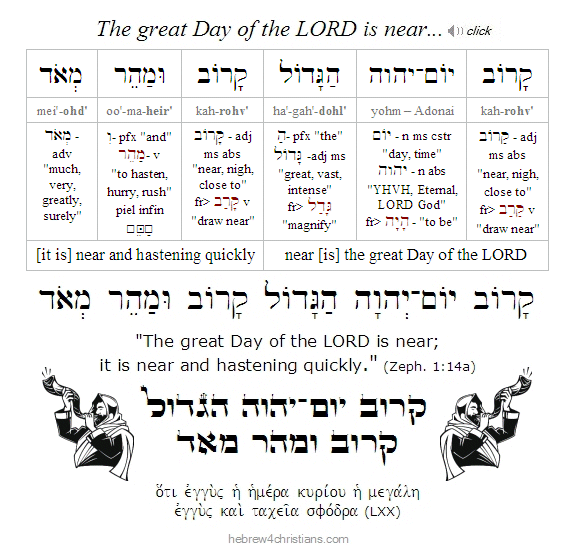 |
Although "Day of the LORD" (i.e., yom Adonai: יוֹם יְהוָה) is often associated with Tishah B'Av and the catastrophic destruction of the Jewish Temple, the words of the prophets were only partially fulfilled, and there awaits another Day coming when God will terribly shake the entire earth (Isa. 2:19). "For the great day of their wrath has come, and who can stand?" (Rev. 6:17). The prophet Malachi likewise says: "'Surely the day is coming; it will burn like a furnace. All the arrogant and every evildoer will be stubble, and that day that is coming will set them on fire,' says the LORD Almighty. 'Not a root or a branch will be left to them'" (Mal. 4:1). For those who are godless, the great Day of the LORD is a time of horrific judgment, but for those who belong to the LORD, it represents a day of victory and great blessing. Regarding that day the prophet Malachi said, "Then you will trample down the wicked; they will be ashes under the soles of your feet on the day when I do these things" (Mal. 4:3).
Ultimately the Great Tribulation period is purgative and restorative for Israel (sometimes called yissurim shel ahavah, or "the troubles of love"). The prophets wrote that Zion will go through labor and then give birth to children (Isa. 66:8). Thus the Vilna Gaon wrote that the geulah (national redemption) is something like rebirth of the nation of Israel. This accords with the prophetic fulfillment of Yom Kippur as the Day of Judgment and time of Israel's national conversion. In the verse from prophet Jeremiah regarding the "Time of Jacob's Trouble," it's vital to see the goal in mind - "yet out of it he is saved" (וּמִמֶּנָּה יִוָּשֵׁעַ). When Yeshua returns to Zion, all Israel will be saved (Rom. 11:26). The sages note that childbirth is a time of radical transition and struggle for the baby -- from the time of relatively peaceful existence within the womb into the harsh light of day -- and therefore a similar transition between this world and the Messianic world to come is about to take place...
 |
The End of Karma...
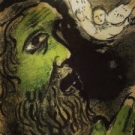
08.05.22 (Av 8, 5782) Human suffering, as opposed to that of animals, transcends the realm of the "phenomenological" to that of self-conscious interpretation. The purely animal mind is immersed in the present moment, and its suffering (though real) is experienced without context, without a story, with no sense of meaning or ulterior cosmic purpose.
When Job was tested by God, he was immersed in a religious philosophy that provided a "map" for ordering the temporal circumstances, or phenomena, of human life. Good and evil were descriptive categories grounded in God's approval or disapproval of a person's character and choices. If evil things happened, then, God was expressing his disapproval of the behavior or character of the person; if good things happened, God was expressing his approval...
This was the rather crude idea of "karma" that lay behind much religious superstition and nonsense of that time. If a person suffered, then God disapproved of the person (or ignored him), and conversely, if God approved of the person, suffering would not occur. And it was sometimes unclear exactly what pleased God or offended him, ideas of "luck" and "chance" blended in with superficial notions of moral cause and effect. Superstitious religiosity thus sought to improve a person's spiritual condition by "bribing" God through flattering words or rituals, or by seeking his approval by doing good deeds....
Meister Eckhart once said that we need God to deliver us from "God," by which he meant that we need the revelation of truth to deliver us from our illusions of who God is and what God is like. After all, people tend to make God in their own image, and yet the LORD forbids all such forms of idolatry. We need God to know the truth about God.
This might explain Job's wife's response to the loss of her home, her children, and the tortuous suffering of her husband. "Curse God and die" she counseled, which might mean: "Everything you've believed about God is an illusion - you have been 'religious,' you have been pious of heart, you have been a good man, and yet all this woe has befallen us... You seek for answers using terms of a religious philosophy to get us through life, and for awhile that map seemed to work, but now it has shown itself to be untrue, or at least it is powerless to help you. Forget the map! Forget the attempt to decipher why you (and me) are suffering - for the map itself has led you astray, and there is nothing left but to let it all go - to die to all that...."
On the face of it we tend to condemn Job's unnamed wife for being faithless, but just imagine what she was going through at the time, alongside her husband.... Her words of exasperation were unsettling, to be sure, but they were the words of someone who was greatly suffering and in need of grace....
The religious philosophy of karma runs deep within the human heart, even among the Jewish people. The law itself is karmic. How else could the "good Pharisee" pray: "I thank you God, that I am not like other men..." His gratitude was based on his comfort that he had played the "game" of religion better than others. Is that the best that legalistic Judaism can offer?
Among other things, the Book of Job "deconstructs" the religious idea of God as strictly karmic to be something more than we can fathom, as King Solomon later said during the dedication of the Holy Temple, "Behold, heaven and the heaven of heavens cannot contain You. How much less this temple which I have built!" (1 Kings 8:27).
And yet is this not the very thing we must do, to "make a place" for God within us? "Let them make for me a sanctuary that I may dwell within them" - וְעָשׂוּ לִי מִקְדָּשׁ וְשָׁכַנְתִּי בְּתוֹכָם (Exod. 25:8). Moses' instruction to build a Mishkan was symbolic, of course, for the people were acquainted with the vast glories of the Egyptian temples, pyramids, and so on. By contrast, the Mishkan was small, humble, and nearly inconspicuous; it represented God's Presence in disguise, unseen by proud eyes, but the very place of the Spirit of God and truth (Isa. 45:15). "Building a Mishkan" then meant "enshrining faith, hope, and love" within our hearts, beautifying and magnifying the greatness of God within us. It is an idea of God that goes well beyond "mechanical karma" to that of deep heart relationship with the Lord...
God spoke to Job from the midst of the whirlwind (סְעָרָה), and it was from the midst of the head-spinning revelation that he heard God speak.... But how did Job get there? Was it not only after he had rebuffed the religious philosophy or "map" that his friends sought to justify his sufferings? Job was adamant, however: that map didn't work - "God" had failed him; "God" had hurt him unjustly, etc. All this "God-talk" was just that - ignorant blather used to justify the old news of karma - but something more else was going on - truth was beginning to be revealed. Using Eckhart's terms, God was delivering Job from his illusions about "God."
How did Mary Magdalene come to know the truth? How did the unnamed tax collector at the Temple who dared not lift up his eyes toward heaven? How did Jonah? How did you? Indeed, how can anyone come to know God apart from having their "world" crumble into dust and ashes before them? And in the midst of the implosion, in the eye of the whirlwind that churns overhead, God then speaks words to the heart...
Whatever the words are - divine poetry of the sort Job heard or something else, it doesn't matter so much what is being said but who is saying the words, that is, who is looking upon you in all your frailty, brokenness, and ruin - whatever the words, then, what is crucial is that the person hears, the person believes, the person is wholly engaged before the One who is beyond all our understanding, and the One who is beyond all our understanding then condescends and speaks into our tears, imparting peace that is beyond all our understanding - peace that is essentially ineffable, incommunicable - an inner sense of knowing that (despite everything) "all is well, and all manner of thing shall be well..."
Did God answer Job's question, then? Yes he did, for he gave Job what his heart needed most of all. Like the distinction between the "good Pharisee" and the "bad tax collector," God's ways are higher than our ways, and his thoughts than our thoughts, and therefore his Spirit "cuts through the soul and the spirit, and the joints and the marrow" to discern the thoughts and intents of the heart (Heb. 4:12). We are whatever we are by the grace of God, and faith is the "substance of hope" that affirms that this story, our story, is a good one, no matter what may happen. Let everyone be fully persuaded in his own mind.
"For we don't live for ourselves or die for ourselves. For whether we live, we live unto the Lord; and whether we die, we die unto the Lord: whether we live therefore, or die, we are the Lord's" (Rom. 14:7-8). Let us therefore come boldly to the throne of grace, that we may obtain mercy and find grace to help in time of need (Heb. 4:16). "In me is darkness, but with You light; I am lonely, but You do not leave me; I am feeble in heart, but with You is help; I am restless, but with You is peace. In me is bitterness, but with You is patience; I do not understand Your ways, but You know the way for me" (Bonhoeffer). "Let me seek you in the darkness of my silence, and find you in the silence of Your light, which is love shining as the sun, flowing like the river, and joying like the heart" (Meister Eckhart).
"The whole world sighs..." (Apostle Paul). "It is of the very essence of Christianity to face suffering and death not because they are good, not because they have meaning, but because the resurrection of Jesus has robbed them of their meaning" (Merton). Amen, the final word is found in the resurrection life of our Lord, the one who emptied himself, clothed himself in our frailty, and overcame the sickness of death on our behalf.
God is both infinitely just and infinitely loving, and both of these "attributes" are inseparably a part of who he is. God is One. Nonetheless, the cross of Yeshua proves that "love is stronger than death, passion fiercer than the grave; its flashes are flashes of fire, a raging flame, the very flame of the Lord" (Song. 8:6). Amen, and shalom to you, chaverim.
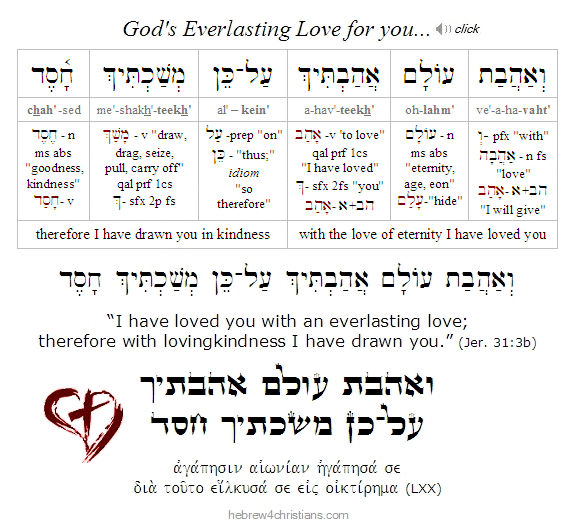 |
The City of the King...
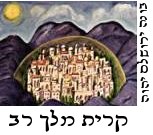
[ The following is related to the fast of Tishah B'Av, which begins Saturday, August 6th.... ]
08.04.22 (Av 7, 5782) The somber holiday of Tishah B'Av recalls the tragic anniversary of the "sin of the spies" and God's subsequent decree that the generation redeemed from Egypt would die in exile from the promised land (Num. 14:26-37), though providentially it also marks the date of the destruction Temple in Jerusalem (both the first and second Temple) and the subsequent exile of the Jewish people. Because it remembers the loss of the vision of Zion, this date is observed with fasting, heartfelt lamentation and fervent calls for teshuvah (repentance).
Jerusalem (or Zion) is central to the Jewish heart since it represents all the promises of the Lord spoken by the Hebrew prophets to Israel... When religious Jews pray three times a day, they always turn toward the Holy City (i.e., mizrach: מזרח "east"). Synagogues likewise place the holy ark (the place where Torah scrolls are kept) on the wall closest to Jerusalem. Many observant Jews keep small section of an eastern wall of their house unpainted as a sign of mourning for the destruction of the Temple. Every year we close the Passover Seder with the words, La-Shanah Haba'ah Bi Yerushalayim! ("Next year in Jerusalem"). These same words are invoked to conclude the holiest day of the Jewish year, Yom Kippur. Indeed Yeshua called Jerusalem the "City of the great King" (Psalm 48:2; Matt 5:35): It is the place where He was crucified, buried, resurrected, and from where He ascended to heaven. It is also the birthplace of the true church (כלה של משיח) and the focal point of humanity's eschatological future. At the Second Coming, Yeshua will physically return to Jerusalem to restore the throne of King David. Then all the New Covenant promises given to Israel will be fulfilled as the Kingdom of God is manifest upon the earth.
God loves Zion since it symbolizes His redemptive program in human history. In a sense, Zion is the heart of the Gospel message and the focal point of God's salvation in this world. Zion represents our eschatological future -- our home in olam haba (the world to come). Even the new heavens and earth will be called Jerusalem -- "Zion in her perfection" (Rev. 21). "This is what Adonai Tzeva'ot says: I am very jealous for Jerusalem and Zion, but I am very angry with the nations that feel secure" (Zech. 1:14-15). "For Zion's sake I will not keep silent, for Jerusalem's sake I will not remain quiet, till her righteousness shines out like the dawn, her salvation like a blazing torch" (Isa 62:1). "The builder of Jerusalem is God, the outcasts of Israel he will gather in... Praise God, O Jerusalem, laud your God, O Zion" (Psalm 147:2-12).
Hebrew Lesson
Psalm 137:5 Hebrew reading (click):
For more on this, see "The Significance of Zion and the Tragedy of Tishah B'Av."
The Plea of Moses...

[ The following entry is related to our Torah portion this week, parashat Devarim... ]
08.04.22 (Av 7, 5782) Various commentators regard Sefer Devarim (i.e., the Book of Deuteronomy) as Moses' final warning to Israel in light of their repeated failures and setbacks. Some (primarily Christian) commentators even go so far as to say that the book represents an indictment against the Jewish people that warrants regarding them as a cursed people. (This is essentially the repugnant doctrine of "replacement theology" that denies ethnic Israel has a future and a hope in God's plan of salvation.) Even many Jewish commentators, among them Rashi, seem to focus on Moses' rebuke (i.e., tochachah: תּוֹכָחָה) of Israel and regard the book in a negative light. Because of this, it should be stressed at the outset that Moses' correction of Israel - including his review of the unseemly history of the desert generation - was primarily intended to remind the Jews of their high calling, their new identity, and their preciousness as God's people. As will be seen, Moses wanted Israel to remember its identity as am segulah (עַם סְגֻלָּה), God's "treasured possession among all peoples" (Exod. 19:5). Moses' admonition (מוּסָר) functions more like the plea of a father to his children to walk in a manner that is worthy of his name than a stinging rebuke of the sins of his children. "My son, despise not the discipline (musar) of the Lord; neither be weary of his correction (tochachah). For whom the Lord loves he corrects; even as a father the son in whom he delights" (Prov. 3:11; cp. Heb. 12:5-6). Therefore we read, "Know then in your heart that as a man disciplines his son (כַּאֲשֶׁר יְיַסֵּר אִישׁ אֶת־בְּנוֹ), the LORD your God disciplines you (הוה אֱלהֶיךָ מְיַסְּרֶךָּ)" (Deut. 8:5).
To underscore this point, notice that just before Moses began his reproof of Israel, he declared his love and faith in the people. "The LORD your God has multiplied you until you are today as numerous as the stars in the sky (כְּכוֹכְבֵי הַשָּׁמַיִם). May the LORD, the God of your fathers, make you a thousand times more as you are (כָּכֶם), and bless you, as He promised you" (Deut. 1:10-11). Moses first brought up God's love for the Jews before he began his admonition. Notice he used the word kachem (כָּכֶם, "as you are") in this blessing. May the LORD multiply you - as you are - a thousand times! You are beloved; you are worthy: may the LORD bless you a thousand times over! (How different is this picture of Moses than the typical cartoon made of him by many in Christianity, who envision him smashing the tablets as if that were his "last word" on the subject of the Torah to Israel!)
Were the people perfect then? Obviously not, as would be clear through Moses' later admonition to them. Nonetheless, Moses used a "good eye" to see their potential as God's chosen people. Here was this ragtag group of desert wanderers, descendants of slaves from the "house of slavery," whom the LORD God Almighty personally redeemed to be His own treasured possession. Despite their failures in the past and all that went before, Moses reminded them that they were esteemed as mamlechet kohanim ve'goy kadosh (מַמְלֶכֶת כּהֲנִים וְגוֹי קָדוֹש), a "kingdom of priests and a holy people" (Exod. 19:6).
Hebrew Lesson
Isaiah 1:27 Hebrew reading (click):
Daily Dvar Podcast:
Blessing of Holy Desperation...
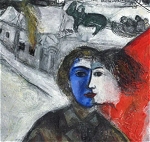
08.04.22 (Av 7, 5782) Shalom chaverim yakarim. In this "Daily Dvar broadcast" (see link below) I discuss what I have called the "blessing of holy desperation," or that very special blessing of needing God so viscerally that you would otherwise fall apart or even self-destruct apart from his ongoing intervention in your life. I hope you will find it helpful.
Hebrew Lesson
Psalm 147:3 Hebrew reading (click):
Gospel in Few Words...

08.03.22 (Av 6, 5782) CAN YOU EXPOUND THE essential meaning of the "gospel" (εὐαγγέλιον) in a single (and preferably short) sentence? How about "Yeshua the Messiah came into the world to save sinners" (1 Tim 1:15), or perhaps, "For our sake he made Him to be sin who knew no sin, so that in Him we might become the righteousness of God" (2 Cor. 5:21)? Of course "unpacking" the meaning of these sentences is where things get more difficult, but a succinct expression of faith can often provide us with a starting point...
"He himself bore our sins in his body on the tree, that we might die to sin and live to righteousness. By his wounds you have been healed" (וּבַחֲבֻרָתוֹ נִרְפָּא־לָנוּ). "For in him all the fullness (πᾶν τὸ πλήρωμα) of God was pleased to dwell, and through him to reconcile to himself all things, whether on earth or in heaven, making peace by the blood of his cross. And you, who once were alienated and hostile in mind, doing evil deeds, he has now reconciled in his body of flesh by his death, in order to present you holy and blameless and above reproach before him, if indeed you continue in the faith, stable and steadfast, not shifting from the hope of the message (εὐαγγέλιον) that you heard" (Col 1:19-23).
"For the Messiah also suffered once for sins, the righteous for the unrighteous (δίκαιος ὑπὲρ ἀδίκων), that he might bring us to God, being put to death in the flesh but made alive in the spirit" (1 Pet. 3:18). "And God is so rich in mercy (מָלֵא רַחֲמִים) and who loves us with such intense love (בְּרב אַהֲבָתוֹ אֲשֶׁר אָהַב אתָנוּ), even when we were dead because of our acts of disobedience, he brought us to life along with the Messiah- it is by grace that you have been delivered (בַּחֶסֶד נוֹשַׁעְתֶּם). That is, God raised us up with the Messiah Yeshua and seated us with him in heaven, in order to exhibit in the ages to come how infinitely rich is his grace, how great is his kindness toward us who are united with the Messiah Yeshua. For you have been delivered by grace through trusting, and even this is not your accomplishment but God's gift" (Eph. 2:4-8).
And of course there is always the old "stand by" verse of John 3:16:
כִּי־כֵן אהֵב אֱלהִים אֶת־הָעוֹלָם
עַד־אֲשֶׁר נָתַן בַּעֲדוֹ אֶת־בְּנוֹ אֶת־יְחִידוֹ
וְכָל־הַמַּאֲמִין בּוֹ לא־יאבַד
כִּי בוֹ יִמְצָא חַיֵּי עוֹלָם׃
kee-khen oh·heiv E·loh·heem et-ha'·oh·lahm
ad-a·sher nah·tan ba'·a·doh et-be·noh et-ye·chee·doh
ve'khol-ha·ma·a·meen boh, loh-yoh·vad
kee voh yeem·tzah chai·yei oh·lahm

"For God so loved the world that he gave his only and unique Son,
so that whoever trusts in Him should not be destroyed, but have eternal life"
(John 3:16)

Hebrew Study Card
Here are a few other simplified expressions of our faith (I am sure you can come up with some others, friends): "He has freed us from our sins by his blood" (Rev. 1:5); "he that has the Son has life" (1 John 5:12); "Yeshua died for our sins, was buried, rose again on the third day, and forever reigns" (1 Cor. 15:3-4,25).
Let's push this approach a bit further. How about just four words?
- "Mercy triumphs over judgment" (James 2:13)
- "Righteousness and peace kiss" (Psalm 85:10)
- "Saved by his life" (Rom. 5:12)
- "You have been healed" (1 Pet. 2:24)
- "Name above all names" (Phil. 2:9)
- "In Him is life" (John 1:4)
- Angel of the LORD (מַלְאַךְ יְהוָה)
- Branch of the LORD (צֶמַח יְהוָה)
Three words?
- "Yeshua loves me"
- "God saves sinners" (Luke 19:10)
- "God is love" (1 John 4:16)
- "God is Light" (1 John 1:5)
- "It is finished" (John 19:30) - this can be one word: "tetelestai!"
- "No other Name" (than Yeshua/Jesus) - Acts 4:12
- Stone of Israel (אֶבֶן יִשְׂרָאֵל)
- Creator of Israel (בּוֹרֵא יִשְׂרָאֵל)
Can we find two words?
- "Messiah Crucified" (המָּשִׁיחַ הַנִּצְלָב)
- "Jesus Saves" (ישוע מציל)
- "My help" (בְּעֶזְרָתִי)
- Everlasting Father (אֲבִיעַד)
- Wonderful Counselor (פֶּלֶא יוֹעֵץ)
- Consuming Fire (אֵשׁ אֹכְלָה)
Or how about just one word?
- LORD (יהוה)
- Yah (יָהּ)
- Amen (אָמֵן)
- Chesed / love (חֶסֶד)
- Grace (חֵן)
- Abba (Father)
- Avi / Father (אֲבִי)
- Ehyeh (I AM, אֶהְיֶה)
- Hakedoshim (הַקֳּדָשִׁים)
- Judge (הֲשֹׁפֵט)
- Healer (המרפא)
- Refuge (מַחְסֶה)
- Rock (הַצּוּר)
- Helper (הַעוֹזֵר)
- Lover (מְאַהֵב)
- Spirit (הָרוּחַ)
- Truth (הָאֱמֶת)
- Faithful (אֵמוּן)
- Hope (תִקוָה)
- Beloved (אָהוּב)
- Friend (חבר)
- Salvation (יְשׁוּעָה)
- Deliverer (מוֹשִׁיעַ)
- Redeemer (גּוֹאֵל)
- Mediator (מְתַוֵך)
- Priest (הַכֹּהֵן)
- Messiah (הַמָּשִׁיחַ)
- Moshia - Savior (מוֹשִׁיעַ)
- King (הַמֶּלֶךְ)
- Wonderful (פֶּלִאי)
- Jesus / Yeshua (יֵשׁוּעַ) - because whatever your need, the answer is found in Him.
Finally - dare I suggest it? - how about no words at all? To paraphrase Francis of Assisi, "Go into all the world and preach the gospel - and sometimes use words." Of course words are important, but by themselves they are never enough, and very often they are unnecessary (James 2:18)... There is a language of love ("the works of love") that goes beyond any diction the tongue may express. This is why the Name of the LORD always is something more than a mere word, concept, or idea... The Name of the LORD is God's love and power and glory and grace and kindness and mercy and passion as He Himself knows it to be real, true, and utterly invincible in all things...
חֶסֶד־וֶאֱמֶת נִפְגָּשׁוּ
צֶדֶק וְשָׁלוֹם נָשָׁקוּ
che'·sed ve'·e·met neef'·gah'·shoo
tze'·dek ve'·shah·lohm nah·shah'·koo

"Love and truth have met,
justice and peace have kissed." (Psalm 85:10)

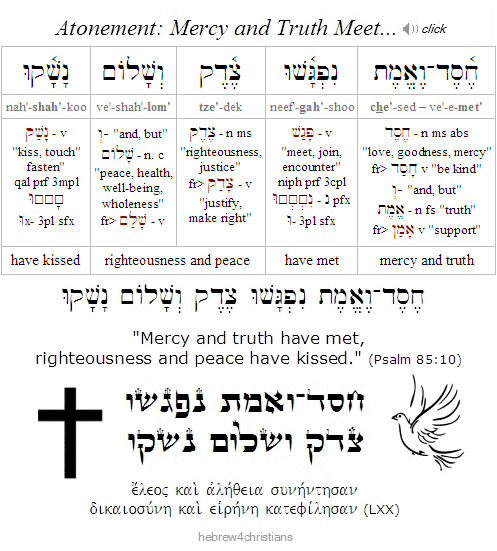
Shabbat Chazon (שבת חזון)
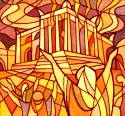
08.03.22 (Av 6, 5782) Parashat Devarim is always read on the Sabbath before the 9th of Av (i.e., Tishah B'Av) the saddest date on the Jewish calendar, and the traditional date on which both the First and Second Temples were destroyed. This Sabbath is called "Shabbat Chazon" (שַׁבַּת חַזוֹן), the "Sabbath of Vision," so named from the opening verse of the Haftarah: "Chazon Yeshayahu ven-Amotz," the "Vision of Isaiah, the son of Amoz" (Isa. 1:1).
When it was first recorded, Isaiah's vision of the destruction of the Temple was still future, and the Jews still had a chance to repent before the great tragedy befell them. However, since they did not repent, calamity finally overtook the inhabitants of Judah.... Despite this devastation, however, the Berditchever Rebbe saw in Shabbat Chazon a distant "vision" of the Third Temple of Messianic times, as indicated by Moses' farewell address as a "second Torah" (i.e., mishneh ha'torah: מִשְׁנֵה הַתּוֹרָה), that is, a prophetic retelling given to the generation that finally would enter the Promised Land.
Despite a long period of exile and mourning, the Sabbath before Tishah B'Av foretells the World to Come, a time when our redemption will be complete and all traces of the pain of our past forgotten, as was spoken by Moses himself (Deut. 32:43) and later by the prophet Zechariah: "Thus says the LORD of hosts: 'The fast of the fourth month (i.e., Tammuz) and the fast of the fifth (i.e., Tishah B'Av) and the fast of the seventh (Gedaliah) and the fast of the tenth (Asarah B'Tevet) shall be to the house of Judah seasons of joy and gladness and cheerful feasts. Therefore love truth and peace'" (Zech. 8:19). The time is coming when the sorrows of our exile will be turned into the joys of redemption!
Hebrew Lesson
Hosea 14:1 Hebrew reading (click):
Note: For more see: "Vision of Destruction: Further Thought on Shabbat Chazon." For more information about Tishah B'Av, click here.
Love and Reproof...
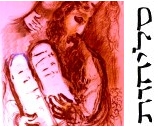
08.03.22 (Av 6, 5782) Just before Moses began his reproof of Israel, he declared his love and faith in the people. "The LORD your God has multiplied you until you are today as numerous as the stars in the sky (כְּכוֹכְבֵי הַשָּׁמַיִם). May the LORD, the God of your fathers, make you a thousand times more as you are (כָּכֶם), and bless you, as He promised you" (Deut. 1:10-11). Moses first brought up God's love for the Jews before he began his admonition. Notice he used the word kachem (כָּכֶם, "as you are") in this blessing. May the LORD multiply you - as you are - a thousand times! You are beloved; you are worthy: may the LORD bless you a thousand times over! (How different is this picture of Moses than the typical cartoon made of him by many in Christianity, who envision him smashing the tablets as if that were his "last word" on the subject of the Torah to Israel!)
Were the people perfect then? Obviously not, as would be clear through Moses' later admonition to them. Nonetheless, Moses used a "good eye" to see their potential as God's chosen people. Here was this ragtag group of of desert wanderers, descendants of slaves from the "house of slavery," whom the LORD God Almighty personally redeemed to be His own treasured possession. Despite their failures in the past and all that went before, Moses reminded them that they were esteemed as mamlechet kohanim v'goy kadosh (מַמְלֶכֶת כּהֲנִים וְגוֹי קָדוֹש), a "kingdom of priests and a holy people" (Exod. 19:6).
Moses' approach gives us insight about how we might correct the people we truly love. Often people become defensive when they are criticized and stop listening. Adding sincere praise and encouragement helps them open up to our message, since it is grounded in a sense of respect and value for their well-being. God thinks highly of the Jewish people, and that is the very first thing to be heard. God greatly esteems us, too. Despite the fact that we are sinners, God truly loves us. He considers us worthy to be saved. Again, why else did Yeshua suffer and die on the cross if God did not value our lives so much?
Shame is never the goal of the Torah. As King David prayed: Elohai bekha vatachti; al-avoshah (אֱלהַי בְּךָ בָטַחְתִּי אַל־אֵבוֹשָׁה): "My God, I trust in you; let me not be ashamed" (Psalm 25:2). Some people use the idea of God's "law" as a sort of club to hammer a sense of guilt upon the soul. They insist that man is "totally depraved" and under God's death sentence. Such people then hope to explain the good news of the gospel to escape God's righteous wrath for sin. These people, perhaps well-meaning, forget that the LORD is "near" - karov- to the brokenhearted. This adverb means "close enough to touch." The same root is used for the word korban (קָרְבָּן), an offering that draws us near to God, as well as karov (קָרוֹב), a near kinsman. In other words, God's desire has always been for people to draw near to Him, and He has always provided a way for people to do so -- even those who lived under the terms of the Sinai Covenant.
Guilt (אַשְׁמָה) is an objective state of being sinful that may or may not be accompanied by feelings of remorse, but shame (בּוּשָׁה), at least in its toxic sense, is a state of soul that regards itself as fundamentally flawed, inadequate, and essentially unlovable. God does not want us to grovel in self-disgust or live in constant fear of His judgment. He does not want us to hate ourselves or to regard ourselves as unlovable. As His creation, He loves us and finds us of value and worth. Why else would he have given His Son up to ransom us from sin and death? Like a parent who loves his child but wants to correct him by saying, "this doesn't become you," so God wants us to remember who we really are. He wants us to "walk in love" as His "dear children of light" (Eph. 5:8). God's correction is meant to form His character within us, and this first must begin with our assurance of our value, dignity, and worth in His eyes.
We are commanded to judge with tzedakah, with love as our underlying assumption. If God so commands us, surely we can trust that He likewise judges us this way. God's love is his essence - "God is love" (ὁ θεὸς ἀγάπη ἐστίν) - and He regards you as worthy to receive His love and blessing. He loves you b'ahavat olam - with "an everlasting love" (אַהֲבַת עוֹלָם), and therefore in chesed he draws you to Himself (Jer. 31:3). Why else would Yeshua die on the cross unless He expressed God's desire to judge others favorably?
Be encouraged, chaverim. You are "fearfully and wonderfully made" and you have a future and a hope in the world to come (Jer. 29:11). "There is no fear in love, but perfect love casts out fear. For fear has to do with punishment, and whoever fears has not been perfected in love" (1 John 4:18). Keep hope. God's love never fails (1 Cor. 13:8).
Hebrew Lesson
Psalm 25:2 reading (click):
The Will to Believe...
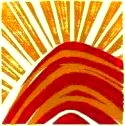
[ The following entry is related to our Torah portion this week, parashat Devarim... ]
08.03.22 (Av 6, 5782) In our Torah for this week (i.e., Devarim) we read: "But you were not willing to ascend (וְלא אֲבִיתֶם לַעֲלת), but became bitter (מָרָה) against the Word of the LORD your God" (Deut. 1:26). Moses' rebuke was not that the people were afraid to conquer the land as much as that they had lost heart and no longer desired to take hold of God's promise. The people gave up their dream; they forsook their hope; and they had lost the "devotion of their youth, their love as a bride, how they followed the LORD in the desert, into a land not sown" (Jer. 2:2). The people's failure was on two levels: First they lapsed in faith by abdicating trust in God's word, and second, they had lost the passion of their first love. In light of this, the sages say that the greater problem was that of losing heart, since the heart directs the will to believe in the miracle of God, or not...
Moses' rebuke of the people's heart condition recalls the sober warning Yeshua gave to the Ephesian believers: "I know your works, your toil and your patient endurance, and how you cannot bear with those who are evil, but have tested those who call themselves apostles and are not, and found them to be false. I know you are enduring patiently and bearing up for my name's sake, and you have not grown weary. But I have this against you, that you have abandoned the love you had at first. Remember therefore from where you have fallen; repent, and do the works you did at first. If not, I will come to you and remove your menorah from its place, unless you repent" (Rev. 2:2-5). Likewise the author of the Book of Hebrews commented: "And to whom did he swear that they would not enter his rest, but to those who were disobedient? And with whom was he provoked for forty years? Was it not with those who sinned, whose bodies fell in the desert? So we see that they were unable to enter because of unbelief" (Heb. 3:17-19). The question of our faith is essential: "It is a fearful thing to fall into the hands of the living God" (Heb. 10:31).
Hebrew Lesson:
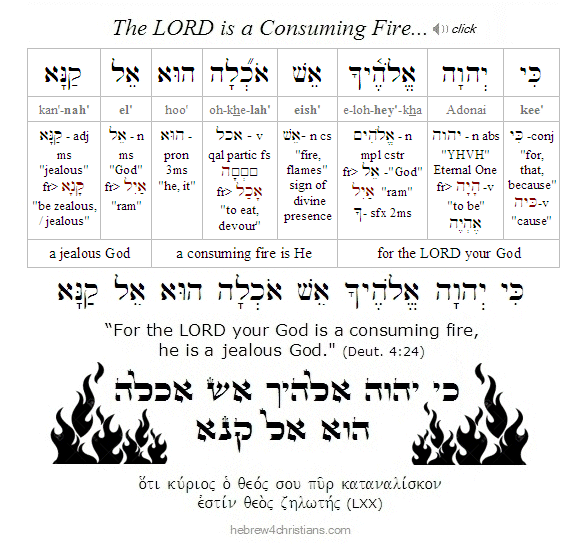 |
He Carries us Through...
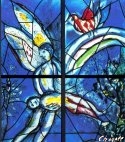
[ The following entry is related to our Torah portion this week, parashat Devarim... ]
08.03.22 (Av 6, 5782) From our Torah this week (Devarim) we read: "The LORD your God carried you, as a man carries his son, all the way that you went until you came to this place" (Deut. 1:31). Part of the miracle of faith is coming to believe that you matter – that your thoughts, words, and deeds all are of interest to God. You may be tempted to regard yourself as unseen and powerless before the Creator of the universe. How is it possible for anyone to serve the Infinite One, since "even the heavens, and the heaven of heavens, cannot sustain You" (1 Kings 8:27)? Are we not made of clay, whose foundation is but dust? (Job 4:19). Here the miracle of faith believes that God, the LORD and Source of all life, seeks relationship with us, and that He makes place within Himself to hear us, to engage our lives, and to walk with us... Indeed, "the Word was made flesh and dwelt among us:" God emptied himself (κενόω) and clothed himself with human dust so that we could be touched by His love. The LORD carries us through our exile so that we might know and trust him...
Hebrew Lesson
Isaiah 46:4b reading (click):
"And just as we have borne the image of the man of dust,
so we shall also bear the image of the man of heaven" (1 Cor. 15:49).
The Torah of Sorrows...

08.02.22 (Av 5, 5782) The Scriptures are filled with desperate cries of the heart... "How long, O LORD? Will you forget me forever? How long will you hide your face from me? How long must I take counsel in my soul and have sorrow in my heart all the day?" (Psalm 13:1-2). "Make haste to help me, O LORD, my salvation!" (Psalm 38:22). "My soul melts away from sorrow; strengthen me according to your word" (Psalm 119:28). "Answer me quickly, O LORD! My spirit fails! Hide not your face from me, lest I be like those who go down to the pit" (Psalm 143:7). God know that "hope deferred makes the heart sick" (Prov. 13:12), so there can be no turning to God, no teshuvah, apart from the presence of real hope (תִּקְוָה). Indeed, as the Apostle Paul wrote: "We are saved by hope" (Rom. 8:24).
The late Henri Nouwen wrote, "I am beginning to see that much of praying is grieving." Contrition, grief, and regret for our sins is at the heart of genuine teshuvah. Crying is a expression of utter humility, helplessness, and need. In this life we weep over many things, but we inwardly cry for our Abba, our heavenly Father's love... "Whenever you find tears in your eyes, especially unexpected tears, it is well to pay the closest attention. They are summoning you to where you should go next" (Frederick Buechner).
"Whenever you find tears in your eyes, especially unexpected tears, it is well to pay the closest attention. God is speaking to you through them of the mystery of where you have come from and is summoning you to where you should go to next. (Frederick Buechner, Whistling in the Dark: 1988).
An old Jewish prayer, uttered somewhat wistfully, begins, "O Lord, I know that Thou wilt help us; but wilt Thou help us before Thou wilt help us?" It's not always easy to wait for God, especially when we are in pain or anxiety, but we must never, ever, give up; we must never ever, abandon our heart's longing for ultimate healing. Faith exercises hope in the Reality, Substance, and Being (ὑπόστασις) of the Invisible and is made captive to undying hope (Heb. 11:1). Therefore the Spirit cries out: "Hope to the LORD; be strong and strengthen your heart; and (again) hope to the LORD" (Psalm 27:14). "Blessed are you, LORD our God, King of the Universe, who walks with the wounded" (שֶׁהוֹלֵךְ עִם הַפְצוּעִים).
Hebrew Lesson
Psalm 13:1 Hebrew reading (click):
Daily Dvar Podcast:
Faith and the Challenge of Evil...

08.02.22 (Av 5, 5782) As people of faith in the LORD, we profoundly feel the tension between affirming both that our loving Creator sustains all things by the word of his power and also acknowledging the ongoing depravity of human beings and how that results in suffering, heartache, and pain in this world. In the following theological audio discussion, I ponder some questions that arise when we seriously consider these matters:
What are you Seeking?

08.01.22 (Av 4, 5782) "Love not the world, neither the things that are in the world; if any one loves the world, the love of the Father is not in him" (1 John 2:15). The best way to keep a prisoner from escaping is to make sure he never knows he's in prison (Dostoevsky). We may abstain from overt forms of worldliness, but when we subconsciously accept the unspoken assumptions and values of this world, we become functional idolaters. Worldliness seeks its comfort in the present hour; it has its own mythology and religious worship.
Test yourself by thinking about what concerns you most. What takes up most of your attention? What do you really want? Where do you look to find value, significance, and worth? What can't you live without? Do you desire romantic love? A political change? Are you addicted to entertainment? fantasy-thinking? the internet? your phone, or perhaps your work? Do want your own way and feel frustrated when other demands arise? Do you wrestle with pride? lust? covetousness? Are you tempted by fear or anxiety? Do you make an idol out of your career and "providing for your family?" Or do you perhaps seek religious "observance" or new experiences to justify your spiritual life? What "barns" are you filling today, friend? (Luke 12:16-20). God sees all things, of course; He knows those who "hide deep from the LORD," whose deeds are in the dark, and think, "Who sees us? Who knows us?" (Isa. 29:15). Yeshua lamented: "This people draws near to me with their mouth, and honors me with their lips; but their heart is far from me" (Matt. 15:8). The LORD says, "Return! Turn from your idols of the heart (i.e., gilgulim, vain repetitions, addictions, reincarnation, illusions, etc.), and be grounded in what is real (Ezek. 14:6). God understands that we are only healed - that is, made whole - when we order our affections aright within our souls. We cannot enjoy the truth about life if we are living a lie. As C.S. Lewis once said, "God cannot give us a happiness and peace apart from Himself because it is not there" (Mere Christianity).
Hebrew Lesson
Psalm 36:9 Hebrew reading lesson:
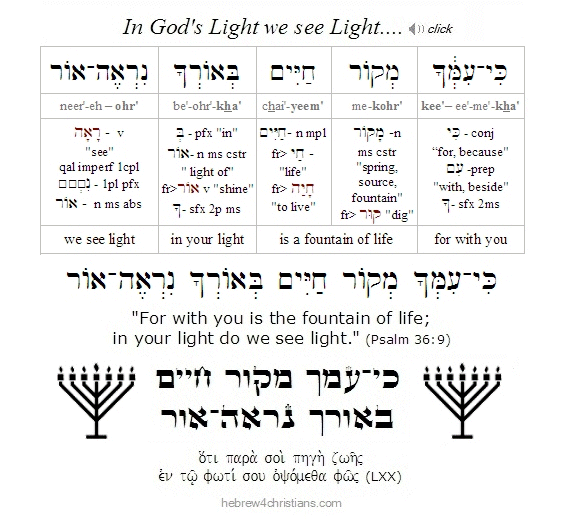 |
The problem with many of us is not that we are so hungry, but rather that we are not hungry enough... We settle for junk food when God spreads out his banqueting table before us. There is a "deeper hunger" for life, and I pray we are all touched by such hunger pangs; there is a "blessed hunger and thirst" that feeds our heart's cry for God (Matt. 5:6); there is a "divine discontent" that leads to a deeper sense of contentment for the heart...
In the end, if we cannot say we have lived well, then nothing else matters... Seeking God is a process, a "how" of life, not a recipe or formula, no matter how venerated. Seeking God is the goal of life, and in the world to come, I am afraid that most of us will regret that we did not pursue the Eternal with all our hearts while we had the opportunity to do so...
"Give up yourself and you will find your real self. Lose your life and you will save it. Submit to death, death of your ambitions and favourite wishes every day and death of your whole body in the end submit with every fibre of your being, and you will find eternal life. Keep back nothing. Nothing that you have not given away will be really yours. Nothing in you that has not died will ever be raised from the dead. Look for yourself, and you will find in the long run only hatred, loneliness, despair, rage, ruin, and decay. But look for Christ and you will find Him, and with Him everything else thrown in" (Lewis: Mere Christianity).
Confession and Healing...

08.01.22 (Av 4, 5782) The inner life of the self can be one of tranquility and peace, or it can be one of turmoil and struggle -- as we sense forces within our own hearts that seek to pull us away from what is good... What is hidden within can become a destructive force, ready to erupt in unexpected moments. We have to be careful to "take every thought captive" before the presence of God, since otherwise our thoughts can lead to chaotic thinking and unrestrained emotions. If we allow ourselves to self-indulgently murmur or envy, for example, such thoughts may surreptitiously become a fixed part of our character.
As C.S. Lewis once said: "Hell begins with a grumbling mood, always complaining, always blaming others... but you are still distinct from it. You may even criticize it in yourself and wish you could stop it. But there may come a day when you can no longer. Then there will be no you left to criticize the mood or even to enjoy it, but just the grumble itself, going on forever like a machine. It is not a question of God "sending us" to hell. In each of us there is something growing, which will be hell unless it is nipped in the bud." (Great Divorce)
We find deliverance from our inner conflicts by humbling our self and opening our hearts to a trusted friend, as it says: "Confess your faults one to another and pray for one another, that you may be healed" (James 5:16). A good friend will make time to quietly listen to the story of your struggle and to then extend grace, compassion, and forgiveness, serving as a priest for your heart, revealing God's kindness and mercy in your darkest of moments... The light shines in the darkness, and the darkness cannot overcome it (John 1:5).
Hebrew Lesson
Psalm 32:5 Hebrew reading (click):
|







































































